Popular Now: Executive Function IEP Goals
- 20 Popular Critical Thinking Games for All Ages
As an advocate, I’m always on the lookout for innovative ways to help my clients. That includes being collaborative with IEP teams and bringing ideas to the table.
That’s why I’m excited to share with you the benefits of using critical thinking games in the classroom. These games are a fun and engaging way to encourage students to think outside of the box and practice decision-making in a playful setting.

From puzzles to role-playing activities, critical thinking games offer a variety of mental exercises that can help students hone their problem-solving abilities.

Save this for later?
We can instantly send this to your inbox. or, send to a friend..
As someone who has played critical thinking games, I can attest to their importance in developing problem-solving skills. These games provide an engaging and fun way to practice creative thinking, brainstorming, and logical reasoning, which are all essential skills that can be applied in real-world situations.
Jigsaw Puzzles
As a critical thinking game, jigsaw puzzles are great for developing problem-solving skills, pattern recognition, and attention to detail. Players look at a picture and then put together different pieces to complete it.
This type of game challenges the brain to think creatively and logically, as well as encourages the development of spatial awareness and fine motor skills.
Logic Puzzles
Logic puzzles are perfect for older students and require more advanced problem-solving skills. These games are typically set up in a grid with clues that the player must use to determine which items go in each square.
I have a crowd-sourced article on this site that is the “ best gifts for autistic teens and adults ” and logic puzzles are a popular suggestion every single year! You can visit that list to get specific ideas.
This type of puzzle stimulates critical thinking as players must look for patterns and logical deductions to solve it. Logic puzzles also help develop analytical skills, reasoning, and cognitive flexibility.
Puzzles are a fun and engaging way to develop critical thinking skills. They provide a mental challenge that can help students develop their cognitive abilities, learn from their mistakes, and come up with new ideas to solve complex problems.
Whether it’s a jigsaw puzzle or a logic puzzle, these games offer a great way to exercise the brain and improve critical thinking skills.
Dungeons & Dragons
As a fan-favorite and iconic role-playing game, Dungeons & Dragons provides an excellent opportunity for players to practice their critical thinking skills. This game requires players to work together, solve problems, and overcome obstacles. Players must develop their character’s story and strategies for success.
With each turn, players are presented with different situations that require quick thinking and problem-solving. Dungeons & Dragons is an excellent game for developing problem-solving skills, strategic planning, and creative thinking.
D&D is also a popular activity for autistic kids to do as a social activity. Let’s be honest–many people think of D&D as “nerdy.” I don’t think it’s cool to ever make fun of something that someone is enjoying, but it happens.
If D&D people are your people, go for it! Let people enjoy things without criticism.
Yu-Gi-Oh! Trading Card Game
Yu-Gi-Oh! is a collectible card game where players build decks of cards representing monsters, spells, and traps, and then use them to battle against each other.
Yu-Gi-Oh involves strategic gameplay, where players must manage resources, plan their moves, and outmaneuver their opponents to win. It has a vast array of cards with different abilities and effects, allowing for diverse and customizable decks.
Sudoku is a popular math critical thinking game that requires players to fill in blank squares with the correct numbers in order to complete a 9×9 grid. This game encourages critical thinking because it involves finding patterns and using logic to solve the puzzle.
Some benefits of playing Sudoku include:
- Improving problem-solving skills
- Enhancing logical thinking
- Boosting concentration and memory
Set is a card game that involves pattern recognition, logical thinking, and quick mental processing. In the game, players are presented with a collection of cards that each have four attributes : color, shape, number, and shading. The goal is to identify sets of three cards where each attribute is either all the same or all different across the three cards.
Players must analyze the cards quickly to identify valid sets, requiring them to think critically about the relationships between the attributes and to efficiently scan the cards for potential matches. Set is a highly engaging and challenging game that exercises mathematical and logical thinking skills in an enjoyable and competitive context.
Math Matching
Math matching activities are super fun to do and usually easy to find online. Part of the activity is solving the math problem or question. The next step is taking the answer to a different component.
For example, I have a math problem color by number page.

Some benefits of playing math matching games include:
- Improving memory skills
- Enhancing problem-solving abilities
- Boosting math fluency
Math worksheets can be found on this site and other places online.
There are plenty of creative activities you can explore that combine artistic expression and critical thinking.
Here are a few ideas:
- Origami : Try your hand at the traditional Japanese art of paper folding. You can find instructions online for a wide variety of origami models, from simple to complex. Here is one: How to Make an Origami Heart
- Clay modeling : Work with clay or playdough to sculpt three-dimensional figures. You can create anything from animals to abstract shapes, letting your imagination run wild.
- Drawing or painting : Grab some paper, pencils, pens, or paints, and let your creativity flow. You can draw from observation, create abstract art, or illustrate your own stories.
- Collage : Collect images from magazines, newspapers, or old books and arrange them into collages. This can be a great way to explore themes, express emotions, or create visual narratives.
- Jewelry making : Use beads, wire, and other materials to create your own unique jewelry pieces. You can experiment with different colors, textures, and techniques to design earrings, necklaces, bracelets, and more.
- Creative writing : Write short stories, poems, or even start a journal. Writing can be a wonderful outlet for self-expression and can help you explore your thoughts, feelings, and ideas.
- Sculpting with found objects : Gather natural or discarded materials such as stones, sticks, shells, or bottle caps, and use them to create sculptures or assemblages. This can be a fun way to repurpose items and explore different textures and shapes.
- DIY crafts : Explore various DIY crafts such as making friendship bracelets, fabric painting, candle making, or soap carving. There are countless tutorials and ideas available online to inspire your creativity.
- Photography : Grab a camera or even just your smartphone and go out exploring to capture interesting scenes, landscapes, or portraits. Photography allows you to see the world from a different perspective and express your unique vision.
- Cooking or baking : Get into the kitchen and experiment with different recipes and flavors. Cooking and baking can be a creative outlet that engages all your senses and produces delicious results to enjoy and share.
These are just a few ideas to get you started, but the possibilities are endless when it comes to creative activities. Follow your interests and passions, and don’t be afraid to try new things!
Brain Teasers
Brain teasers are an excellent way to practice critical thinking and problem-solving skills. These puzzles require players to think outside of the box and come up with creative solutions to complex problems. Brain teasers can be in the form of riddles, puzzles, or even mathematical problems.
They can be used in a classroom setting or as a fun activity with friends and family.
Some benefits of brain teasers include:
- Developing analytical skills
- Improving memory and concentration
- Encouraging creative thinking
- Boosting problem-solving abilities
Sorting Games
When it comes to developing critical thinking skills, sorting games are an excellent choice. You can use playing cards, Uno cards, or any other something that you have a lot of.
Sorting is a beginner math skill too.
Shape Sorting Game
The shape sorting game is another great way to develop critical thinking skills. This game involves sorting various objects and shapes into the correct slots. Players must think logically and use problem-solving skills to correctly place each item.
To play the shape sorting game, simply provide players with a set of objects and shapes and a corresponding set of slots. Then, players must match each object to the correct slot based on its shape and size. The game can be played individually or in teams, and the player or team with the most correctly sorted objects wins.
When it comes to critical thinking games, LEGO activities are an excellent way to engage students and help them develop their problem-solving skills.
Ask a student to come up with specific criteria for the project. Examples may be the number of LEGO bricks they must use, the color, type, etc. Then, individually or in teams, they build that item.
Students can learn how to think outside of the box and come up with creative solutions to complex problems.
Testing, 1, 2, 3……….
- Retaking Tests Accommodation | Why IEP Teams Should Rethink this Common Intervention
- How to Get Extended Time on Tests | IEP | 504 | Best Practices
- 10 Fun Classroom Games to Foster Non-Academic Test Taking Skills
Critical Thinking Questions in the Car
As a parent, I am always looking for ways to encourage my child to think critically and creatively. I have found that asking open-ended questions is a great way to spark their imagination and engage them in thoughtful discussions.
I don’t even know if my teenager has figured it out yet–that I use the many car rides we do together as an opportunity to chat about all kinds of stuff. Arguably, I talk with him much more in the car than I do at home.
He plays travel basketball, so we’re in the car a lot .
Here are 20 critical thinking questions that I have found to be particularly effective:
- How would I go about solving this problem?
- Who would I need to help me solve this problem, and why?
- What clues would I look for?
- How would I decide which suspects to question?
- How would my invention work?
- Who would benefit most from my invention?
- What could I have done differently?
- How did the resolution affect my relationship with my friend?
- How would I decide the best course of action?
- What would I do if I couldn’t find the owner?
- What steps would I need to take to keep it a surprise?
- How would I ensure that the party is something he would enjoy?
- How would the change benefit students?
- Can I think of any negative consequences of my change?
- How would I prepare for my journey?
- What challenges do I think I would face?
- What questions would I ask the animal?
- How do I think this ability would change my perspective on animals?
- How would it be different from cities today?
- What technologies would I incorporate to improve people’s lives?
- What skills or knowledge would students gain from this subject?
- How would it benefit them in their daily lives and future careers?
- Describe the creatures that live there. How do they interact with their environment?
- What kind of weather does my planet have, and how do the inhabitants adapt to it?
- What traditions or activities would people do on this day?
- How would my holiday promote positive values or behaviors?
- Who would use my invention, and how would it change their habits?
- What challenges might I face in convincing people to use my invention?
- How would animals, plants, and humans adapt to this new law?
- Could there be any unintended consequences of this change?
- How do players win, and what do they learn in the process?
- Can I think of a way to include players who typically have a hard time in competitive games?
- How would this shared dream experience affect society and relationships?
- Would people interpret the dream differently? Why or why not?
- What do I think plants would want to tell humans?
- How could this ability change the way we care for our environment?
- How does their power help them solve problems?
- What challenges do they face, and how do they overcome them?
- Why is this chore important, and how would having it done
What are some popular board games that can help improve critical thinking skills?
There are several popular board games that can help improve critical thinking skills.
I have another whole list of Unique, Educational Board Games .
Critical thinking is an important executive function. Learning and developing this skill doesn’t have to be boring! I hope these games help.
Games to Play in the Classroom
- 25 Games to Help Teens Learn and Develop Social Skills
- 33 Unique, Educational Board Games for Older Kids
- 21 Fun Classroom Games for All Ages (no prep work!)
- Leapfrog Games you can Download for Free | Incl. LeapPad Ultra | Discounts
- 25 (free!) Evidence-Based Games and Activities to Learn Social Skills
Special Education Advocate
I'm an IEP/Special Education Advocate who has attended 100s of IEP meetings. I live in Chester County, PA with my husband and two boys, one is disabled. My goal is to make your IEP process easier and help you move your IEP Team to YES. When I'm not here, I'm probably in Harrisburg or DC lobbying for systems change for our kids.
Why BrainGymmer?
Turning science into fun.
Together with neuroscientists, our team transforms science based exercises into fun and challenging games for the brain!
Training your brain without any effort
Ten minutes a day is all it takes to keep your brain in shape, just like sports strengthens your body!
Notice the effect in everyday life
Improve your day-to-day cognitive skills like facial recognition, concentration, math, short-term memory and much more!
Brain training games for all cognitive skills
Your brain has an enormous range of abilities, which can be divided in five major cognitive skills. Our brain games challenge you to exercise these skills
All brain games are based on trusted psychological tasks and tests. So use our free brain games to improve your memory, attention, thinking speed, perception and logical reasoning!
Watch our video
What others say about us
Nice probably the best free brain games that i've tried, i really noticed the difference since i started doing online brain training, i wanted to find games to improve concentration and found them in braingymmer, fair amount of brain games for adults that work on my phone as well, pretty good brain games for adults, 'i like the brain training exercises, it is becoming easier for me to remember names and places etc.', what people often ask us, what is brain training.
Brain training, is the usage of digital exercises, also called brain games. Those exercises are used to stimulate mental activities with the purpose of improving your cognitive abilities.
Do brain games really work?
Brain games are a very new science, and many researchers are still discovering the effects. While tens of millions of people world wide are using brain games, scientific results are still very much in the process of being discovered. Currently we support a variety of international universities in their studies.
Proud partners

You only have one brain, take good care of it.

10 Engaging Online Games To Test Your Critical Thinking Skills
Last Updated on October 4, 2023 by Editorial Team
To define it in very simple terms, critical thinking refers to the overall analysis of all the facts and figures you have at your disposal and using them in an organized way to make a judgment or a decision. There are a lot of interactive ways that can help develop your critical thinking abilities. However, what better way to do it than playing games and having fun?
Conventional learning methods mainly demand a longer attention span which is at times difficult for young individuals. In such cases, using online games to ace the skill can be a wise choice. This post includes a list of ten online critical thinking games to develop critical thinking skills while keeping you focused and occupied in learning new things.
Online games to improve your critical thinking ability
Various game developers have launched games that require the player to use their deep critical thinking skills in order to play and win. From matching numbers to presenting the player with real-life situations, these online critical thinking games come in myriad forms.
1. Spent

The first game on the list is Spent, based on the concept of budgeting and the various challenges one has to face in day-to-day life. While playing the game, the player will face multiple difficult scenarios and has to make crucial decisions that will directly impact their income (in the game). The kind of problems and challenges that you will face while playing the game include:
- Issues related to your health concern
- Getting correctly educated
- Trying your best to provide the basic amenities for the members of your family
This game will get one’s mind racing as it requires making quick and critical decisions that will have an impact on the growth of the decision-making process. This game plays with planning, summarizing, decision-making, and information-synthesizing skills. In addition, they get to learn about poverty, unemployment, the Affordable Care Act, etc.
2. Air Traffic Controller Game

As the name might suggest, the air traffic controller is an online simulation game that lets a player direct and guide various aircraft on the ground, on runways, and via the medium of controlled airspace. The main purposes of the game are to manage a popular airport, ensure there are no delays in the landing or the take-off process, and see to it that there are no collisions.
In short, the player is responsible for maintaining the air traffic of that particular airport. In addition, the game also offers three levels of difficulty. At level one or Gate 1, the player needs to manage one airstrip where the difficulty level is very low. Once they are comfortable with the first one, they can move on to the second and third levels to stimulate their critical thinking skills.
3. Sudoku

Sudoku is a familiar and common game. The game is based on the concepts of basic logical thinking and a combinational number placement puzzle where a player needs to fill a 9×9 grid with digits ranging from 1 to 9. But the catch is that they need to fill in the blanks so that all of the columns, rows, and nine 3×3 subblocks present within the 9×9 grid contain all the digits, as mentioned earlier.
For example, if a player places ‘1’ in the first block of the first row, they cannot put it anywhere in that row and column again. They must use numbers 2-9 to complete that specific row and column. The game (or puzzle) requires one to stimulate their brain in a manner that involves their critical thinking skills and enables them to think logically while taking aid from numerical skills.
4. Good Game Empire

Similar to various other RPG and strategy games you will find online, Good Game Empire is based on an MMO strategy style, and the setting of the game is in Medieval times. The central theme of this game is that you need to build a thriving empire worldwide.
But, you will start the game with only a castle to your name, and you have to develop and make your empire strategically and fight opposing nations. This game pushes you to think critically and expand your strategic ideals to the best extent to make your empire spread throughout the world. The game will also offer you various choices from which you would need to select the option that works the best for you.
5. Chess

Chess is one of the board games played across the globe that requires analytical skills . There are always two players in this game, and the primary objective of the game is to capture the opponent’s king. However, it is not as simple as it sounds. White and black checkered board (64 squares) with different pieces (each piece symbolizes different positions like King, Rook, Bishop, Queen, Pawn, and Knight) arranged on it in specific positions- this is what a player gets on the screen while they choose to play chess. They can move one piece at a time, and each piece has a set pattern of movements that they must follow.
The same applies to the opponent too. Using specially designed and designated moves, the players are supposed to check their opponents (also known as Checkmate) and capture their king to win the game. It needs the players to practice critical thinking, for one cannot randomly move pieces and win the game. Well-calculated moves and timely yet quick decisions are what they need. Thus, chess highly stimulates the players’ brains, allowing them to think critically.
6. Minecraft

The objective of the game is to freely explore the Minecraft world, explore infinite possibilities, and create new setups. Starting from building a block to making an entire city as they see fit, one can do it all in this game. This game allows you to freely exercise your imaginative and creative side of the brain.
The game is an ideal option for students to practice math concepts and give them the experience of how those concepts are used in our day-to-day lives. Players critically analyze situations and draw conclusions all the while building and planning the entire city. The game not only offers the experience of endless fun but also helps individuals to use and practice their critical thinking abilities.
7. Brainstorm

Critical thinking is all about making decisions based on analytical observation and this game allows individuals to brainstorm and find answers to challenging questions. In this game, the players need to answer questions that come on the screen by choosing the correct answer from the given options. The game starts from a basic level named “Newborn.” Answering all questions enables the player to move to the next level. For example, this Newborn level has 18 questions.
A maximum of four players can join and compete with each other to complete small tasks and objectives ahead of every other player. The players would need to push their brains to their limits which means that this game will stimulate their brains and let them exercise critical thinking skills. In addition, this will allow them to improve their decision-making process.
8. 2048 game

2048 is a sliding puzzle video game where the primary objective is to slide the numbered tiles within the puzzle setting until the players have combined them to form a tile with the number 2048. Even though it sounds easy, the game requires one to think before moving a single tile as it could determine the outcome. One needs to actively think of the moves ahead of making to ensure a proper flow of movements. This game is ideal for stimulating one’s brain and keeping it on its toes.
9. Unolingo

Unolingo is an online crossword puzzle game where you need to fill in a 10×10 puzzle box. The player needs to fill the boxes by placing the words and letters precisely and completing the puzzle. Unlike a regular crossword puzzle, there are no clues as to which letter the player should put in to make a complete word.
They can ask for a hint but that will add 30 seconds to the elapsed time. Clicking on the “Solve” tab will show the solved puzzle. This game requires the players to think more critically and stimulate their brains further. It is a fun alternative to regular crossword puzzles and will keep a player occupied for longer as they have to think more critically as to what letter to put and what word to make.
10. Tangram puzzle

The Tangram puzzle is a fun game that helps one to exercise their brain. There are seven geometrical shapes in the game. Each level comes with a diagram where the players need to position the shapes such that it matches the diagram. There is a provision to rotate the shapes and place them wherever the player sees fit.
There will be 25 puzzles to solve with these seven shapes. The faster the player solves the puzzle, the faster they get access to the next puzzle. It requires creative and critical thinking for they have to recognize which shape will fit which part of the puzzle. Also, how to rotate it to match the puzzle needs deep thinking. It pushes the player to think creatively and use their critical thinking skills.
Critical thinking refers to understanding a piece of information, analyzing it, applying it to practical application, combining the information with other prior knowledge to draw conclusions, etc. Critical thinking is essential in all aspects of life, personal or professional.
These online games can help an individual use them in practical scenarios and draw effective conclusions. The games mentioned above help one to think critically and also to keep their brain active by stimulating it to its limit. These enjoyable games will keep a player occupied for longer, allowing them to explore and learn new things freely.
An engineer, Maths expert, Online Tutor and animal rights activist. In more than 5+ years of my online teaching experience, I closely worked with many students struggling with dyscalculia and dyslexia. With the years passing, I learned that not much effort being put into the awareness of this learning disorder. Students with dyscalculia often misunderstood for having just a simple math fear. This is still an underresearched and understudied subject. I am also the founder of Smartynote -‘The notepad app for dyslexia’,
Leave a Comment Cancel reply
You must be logged in to post a comment.
Join my list and get a FREE phonics game! GRAB THE GAME
No products in the cart.

7 Games for Critical Thinking that Add Play to Your Day
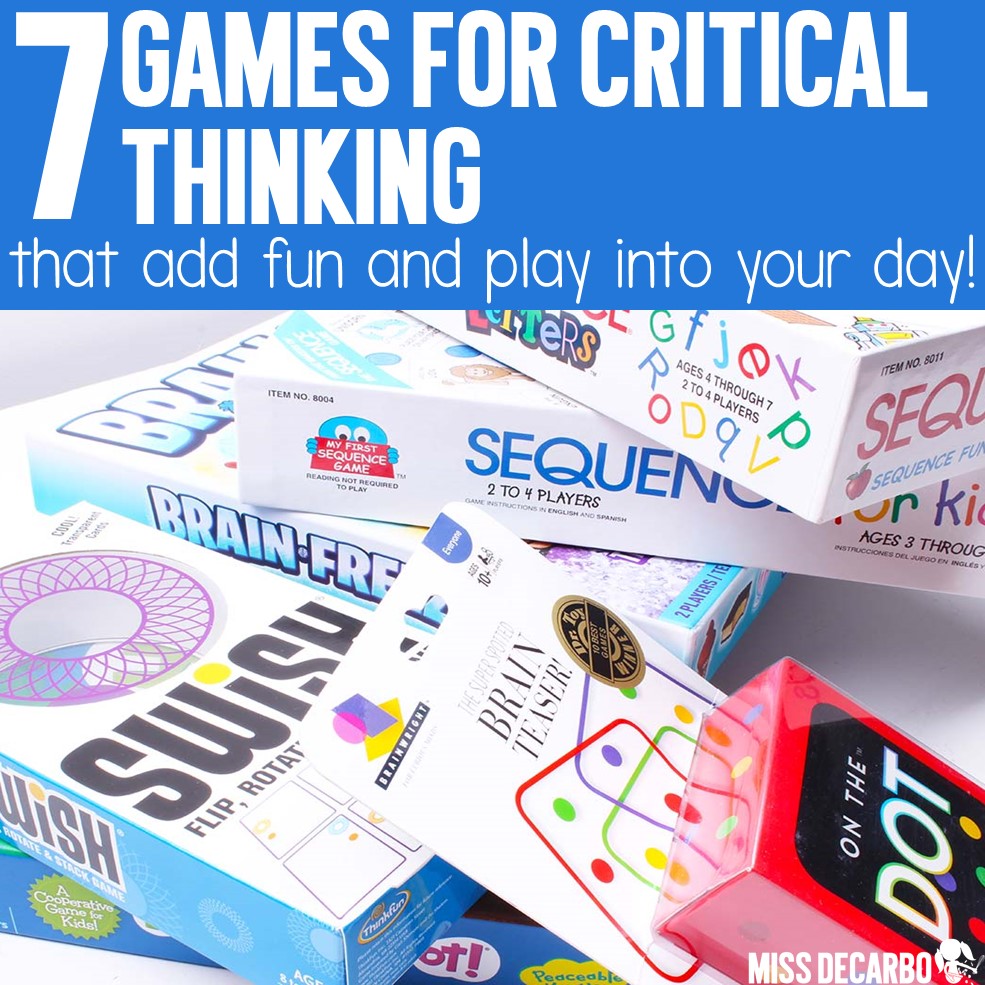
Let’s talk about the importance of PLAY and games in our classrooms today. Do you agree with the following?
Learning should be fun.
Learning should be engaging.
Learning should be JOYFUL!
I thought so! For children (and adults) play is a key the way the brain learns. When our students complete puzzles, they are working on problem-solving skills. When they play a game with rules to follow, they are learning how to cooperate and interact with others. When they play against an opponent, they are learning how to develop strategies, predict outcomes, and use logical thinking skills. What a better way to squeeze in play than with critical thinking games in the classroom? In this post, I’ll share seven of my favorite critical thinking games for primary students.
For your convenience, I’ve added links to the materials I talk about within the blog post. These are Amazon Affiliate links. This just means Amazon tosses a few cents my way if you make a purchase with the links – at absolutely, positively, no extra cost to you! These little links help me to continue sharing ideas, freebies, and giveaways with you on the site.
Finding Time for Games in the Classroom
Time. It’s a four-letter word that teachers across the world have a love-hate relationship with. “There’s not enough time!” is a phrase one will frequently hear from a kindergarten teacher as much as a middle school teacher. We know that our students need time to play and have fun in school. We know that games promote SO MANY wonderful skills and brain-friendly challenges for our students. In addition to Pinterest, teaching blogs, IG, and educational websites, I like to turn to the shelves of stores such as Target, Walmart, and Toys R Us for critical thinking games that my students will love to play! There are TONS of educational and high-quality games that you can find pre-assembled and ready to go- for a great price! So, when can we squeeze games into the classroom? Below are some of my favorite times to add board games and mind-challenging games into our schedule:
- Morning Work
- Small Groups
- Indoor Recess
- Friday Game Days (Use small group time or morning work time for games!)
- Math Centers
- Literacy Centers
- Word Work Centers
Teaching Students How to Play
It’s important to model how to play each game with your students. The critical thinking games I am going to share in this post take a lot of brain energy! They are designed to be fun- but challenging- for your students. As a result, don’t expect students to pick up how to play instantly and be able to independently play the games right away. I like to model and play the games with my students at the small group table. For example, every time I introduce a new Brainamin short or long vowel game as a word work center for my students, we play it at the small group table. I do this for math and literacy centers, too. In this way, I can correctly show students the materials, the rules, and I can even play with them to model my thinking and let them hear what I am thinking as I strategize my next moves and make decisions throughout the game. When students have had ample time to play and see how the game works WITH you, they will be more confident and have more fun when they play with their friends and classmates.
Organizing Your Games
Whenever possible, I like to get rid of the boxes the games come in and put them into plastic tubs. The boxes just seem to deteriorate over time, and the lids on the plastic bins help us keep everything tidy and organized. I use many of my critical thinking games during morning work time on Mondays and Fridays and during math and literacy centers. (On Tuesday, Wednesday, and Thursdays we use my See, Think, Wonder, Write routine for morning work .) I will be sharing more about my morning tub time (or what I like to call, Brain Bins) in future blog posts. For now, you can find the bins I use to store my critical thinking games in the links below. You’ll find two sizes of bins. For games that have a board game to them, I like to use the larger, flatter bins. For card games or other critical thinking materials such as the toys and activities I mentioned in this post , I use the medium bins because they take up less space and are really deep!
Medium Bins:
Now, let’s get started learning about seven really fun games that you can use for centers in your classroom. These games will challenge your students’ minds, while encouraging them to use problem-solving, critical thinking, logical thinking, deductive reasoning skills, and most importantly, have fun learning!
Hoot Owl Hoot
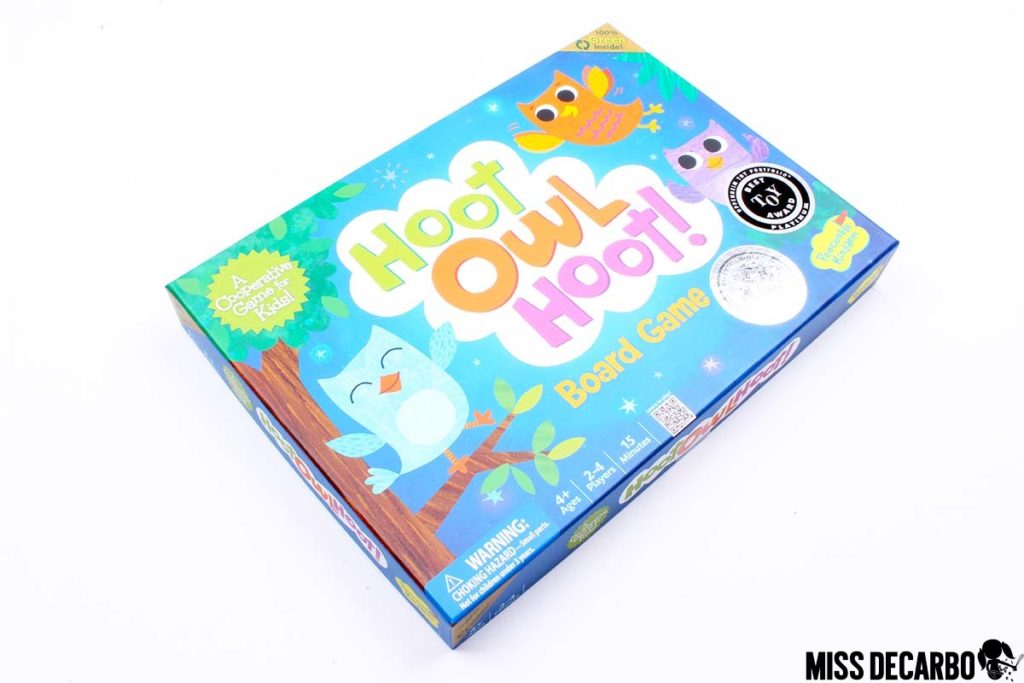
If you teach little ones, Hoot Owl Hoot is a MUST. Hoot Owl Hoot is designed by a company called Peaceable Kingdom. This is an award-winning game that focuses on cooperative play. (The game won the Oppenheim Toy Portfolio Platinum Award.) The object of the game is to help the owls fly back to their nest before the sun comes up. Students use color cards to move the owls closer to the nest. If they draw a sun card, they are one step closer to daylight. The BEST part of this game? EVERYONE wins! That’s right. The students must work together to get all of the owls to their nest. Whether you have a preschooler at home or teach kindergarten or first grade, this is a great game for kids! On top of the cooperative play, students have to use problem-solving skills and shared decision-making skills to be successful. It’s truly a wonderful game that challenges little ones’ thinking skills while having fun with friends!
SEQUENCE LETTERS
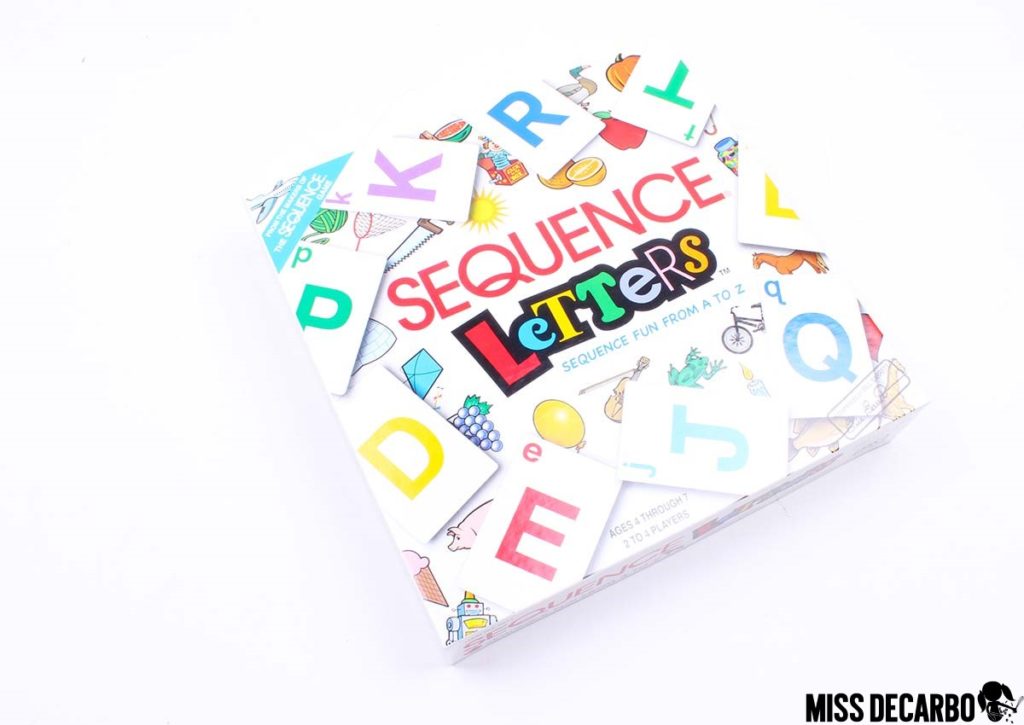
Sequence Letters is a game designed for ages 4-7, making it the perfect literacy and word work center for the kindergarten and first-grade classroom. To play, students name the letter on their card, say the sound for that letter, and then match it to a picture on the board that begins with that letter sound. The object is to get five of your game tokens in a row on the board. Can we talk about how perfect this game is for an intervention group or kindergarten small reading lesson?! What I love even more is that the letter cards feature the letter in both uppercase and lowercase, so students are seeing both forms every time they play. Sequence Letters is a game that every primary teacher needs to add to their classrooms!
SEQUENCE FOR KIDS
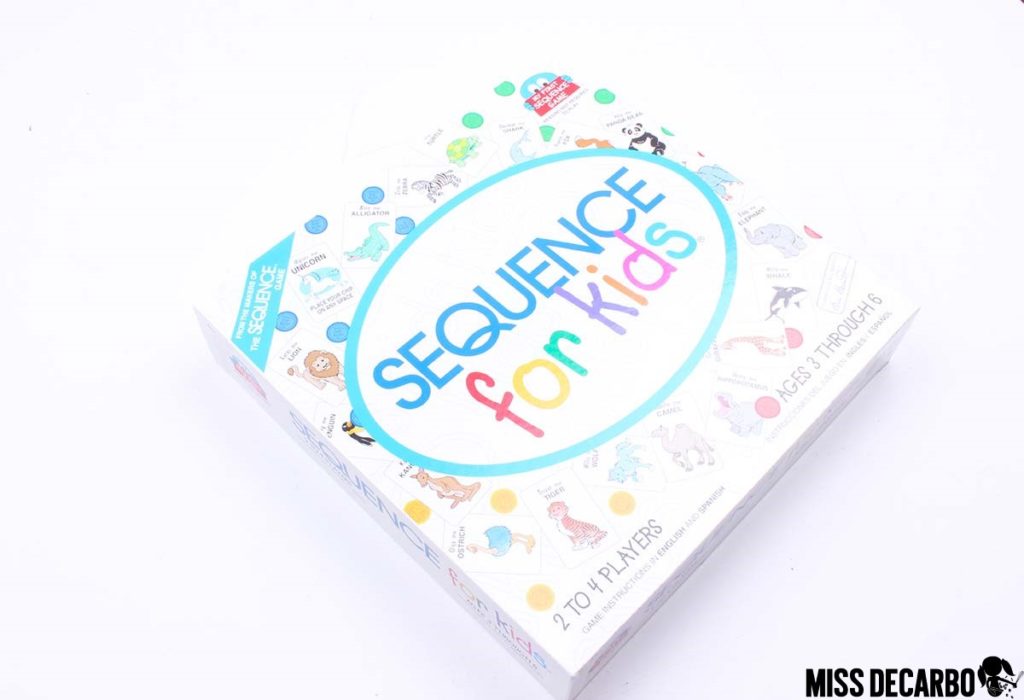
Sequence for Kids is another version in the Sequence games line-up. This is a great critical thinking game for students who cannot yet read, and it makes the perfect indoor recess game for strategy skills! At first, the initial concept of the game seems TOO easy: Students simply place a token on the picture on the board that matches the picture on their card. When a player gets four tokens in a row, he or she wins. Don’t let this game fool you! There is a lot of thinking-rich strategy skills involved when playing this game. You see, in addition to the picture cards, there are also unicorn and dragon cards. A unicorn card allows you to place your game token anywhere on the board. A dragon card allows you to remove an opponent’s game token. Now, you’ve got a game that involves some “if this…then that” thinking! Which, my friends, are the games I love for kids! You can find Sequence for Kids below:
Brain-Freeze
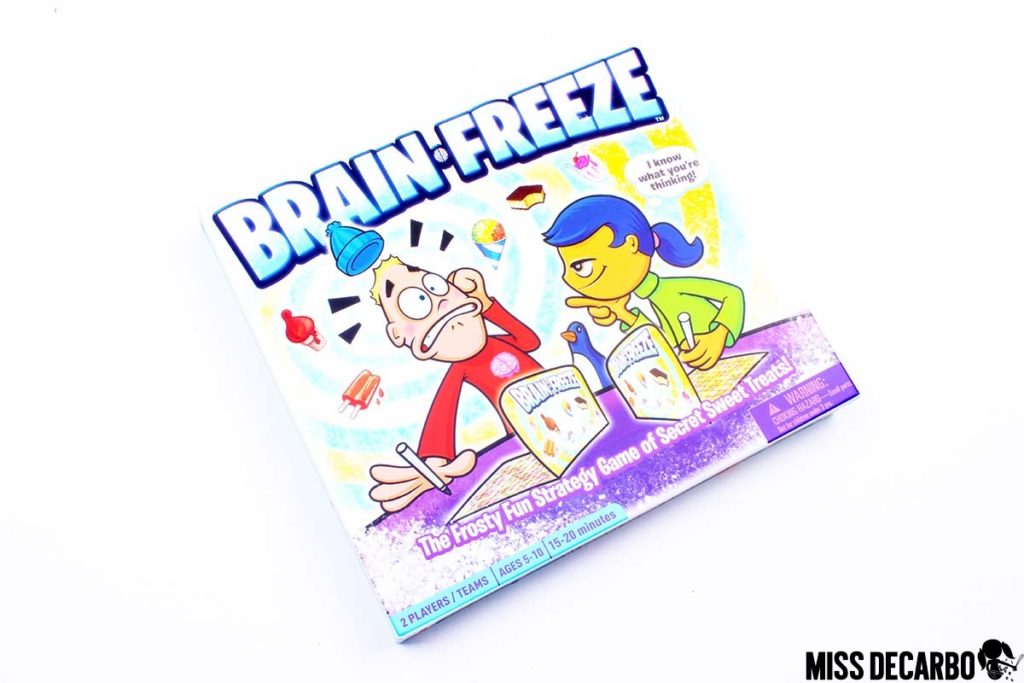
If you don’t own Brain-Freeze , RUN and get it! It is not only engaging, fun, and child-friendly, but it is the perfect strategy game for young students ages 5 and up. Brain-Freeze reminds me of a cooler version of Guess Who for kids. It also builds mental skills such as memory, deductive-reasoning, and strategy skills. It received multiple awards for children and only takes about 15 minutes to play. That amount of playing time makes it an ideal game to place in a literacy center or math center for kindergarten, first-grade, and second-grade students. To play, one child chooses a sweet treat off of the “menu” and circles characteristics of the treat on their game board. The other child guesses and asks questions about what the sweet treat is, just like in the game, Guess Who? Using a dry-erase marker, the player who is guessing crosses out and eliminates different choices based on the clues and the answers the first player gives. The object is to correctly guess the sweet treat the first player secretly chose at the beginning of the game. This game is also wonderful for asking questions and using inference skills! Find it here:
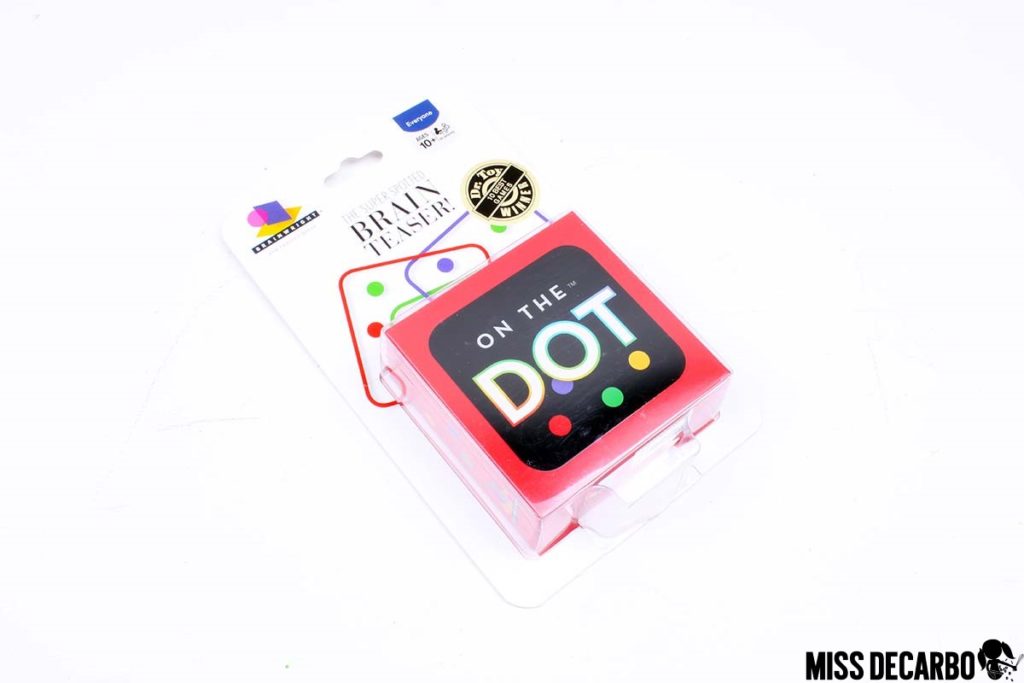
Let’s move on to some more challenging games. These next few games are great for second-grade and up. On the Dot is a challenging puzzle game that requires focus, creative thinking, and an ability to look at things from new perspectives. It’s a true brainteaser that students will love! To play, students choose two transparent cards. The cards have colored dots on them. The student must rotate, flip, turn, or overlap the cards in order to get the dots on both cards to match up. This game is great for building and practicing logical thinking, spatial reasoning, and problem-solving. With 60 different puzzles to match up, On the Dot is a game that can stay in your bins for a long time!
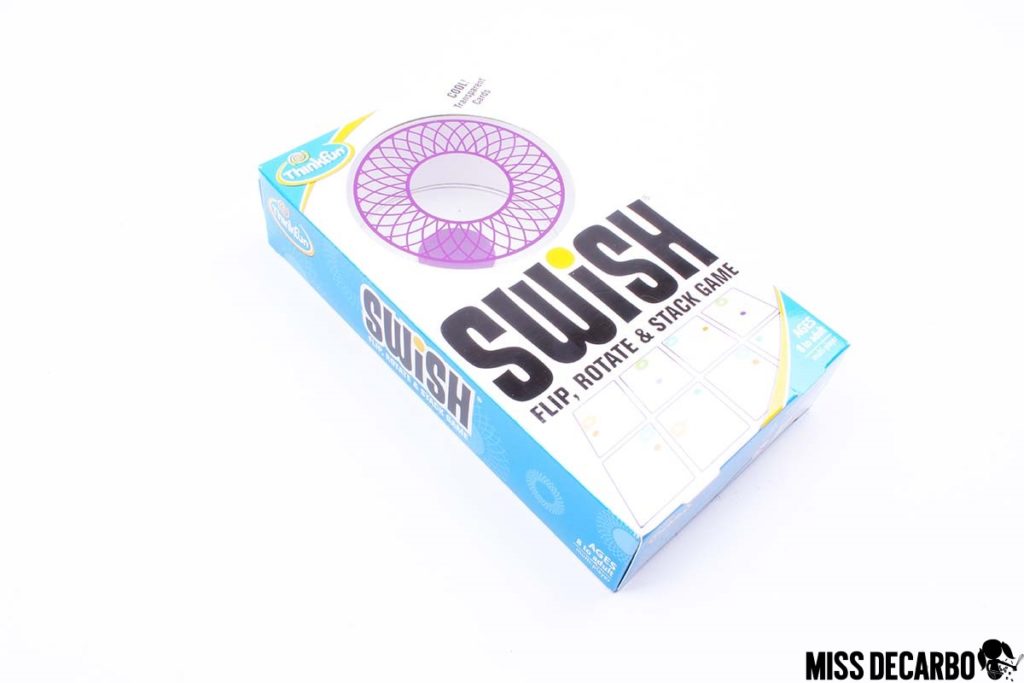
Swish is a game designed for ages 8 and up. It reminds me of On the Dot with transparent cards and colored hoops, or circles. Players take turns stacking and matching up the colored cards. When a match is made, the player keeps both cards. The player with the most matches wins. After playing this game a few times, I decided the Swish Junior game would be the best version to start with in the primary classroom. The pace would go faster and kindergarten and first-grade students would feel more confident and successful. In the Junior version (ages 5+), players layer or stack two or more transparent cards to make a match. The cards have shapes on them in various colors and sizes, making it a much better game for primary students! The Junior version would be great for building spatial reasoning skills and promoting shape recognition. You can find the Swish Junior version below:
For my last critical thinking game, I can’t get enough of my Brainamin games! In this post, I’ll feature the CVC-e and long vowel edition , but I also have a Brainamin Short Vowel Bundle and a B rainamin Vowel Teams Bundle available, too. This is one of the best games to add to a morning tub or literacy center, and it’s certainly fun to use as a small group warm-up game! If you have students who are struggling with decoding and phonics skills, these games also make a nice change of pace for an intervention group. To play, students flip over two cards: a word card, and a picture card. The students will scan the cards and find the matching word and picture, as shown below:
There is only one match, so the students must think fast and be the first person to find it. The student who finds the match first gets to keep both cards in his or her pile. The student who has the most matches in his or her pile at the end of the game wins. (You can also just play for fun and not keep “score” using the matches.) Let’s play again. Can you find the matching word and picture in the cards shown below?
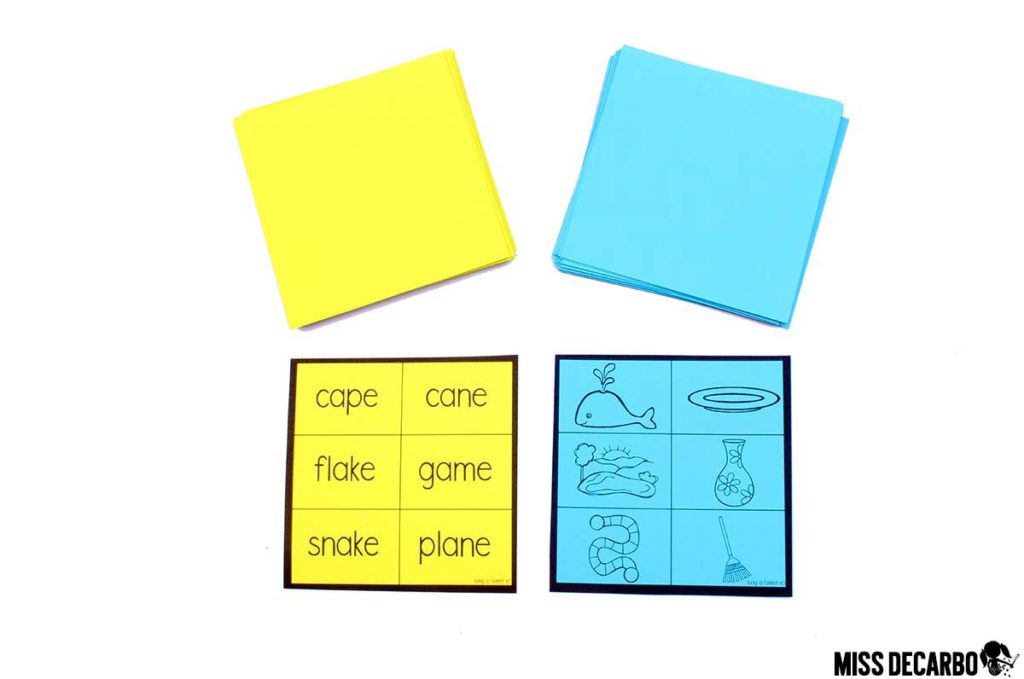
SO fun, right?! What I love MOST about Brainamin is that you can play with a group of students, or with just two students. In fact, students can even play against themselves as an independent game as they race to find the matches among the deck of cards. Brainamin not only improves phonics skills but it also works on visual discrimination skills, critical thinking skills, deductive reasoning, decoding, and fluency for word recall. You can find the different Brainamin bundles and games that I have available by below:
- Brainamin Short Vowels (cvc words)
- Brainamin Long Vowels (cvc-e words)
- Brainamin Vowel Teams
- …more to come in the future!
Try Brainamin for FREE!
You can learn more about critical thinking AND get a FREE Brainamin Short A game pack in a blog post I wrote by clicking HERE or on the blog post image below:
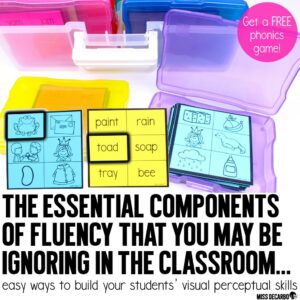
I hope you enjoyed learning about these seven games for critical thinking in the primary classroom! I know they will add fun, play, and lots of great thinking skills into your classroom routine. In order to save this post for later or share it with a colleague, feel free to use the image below to PIN IT on Pinterest !
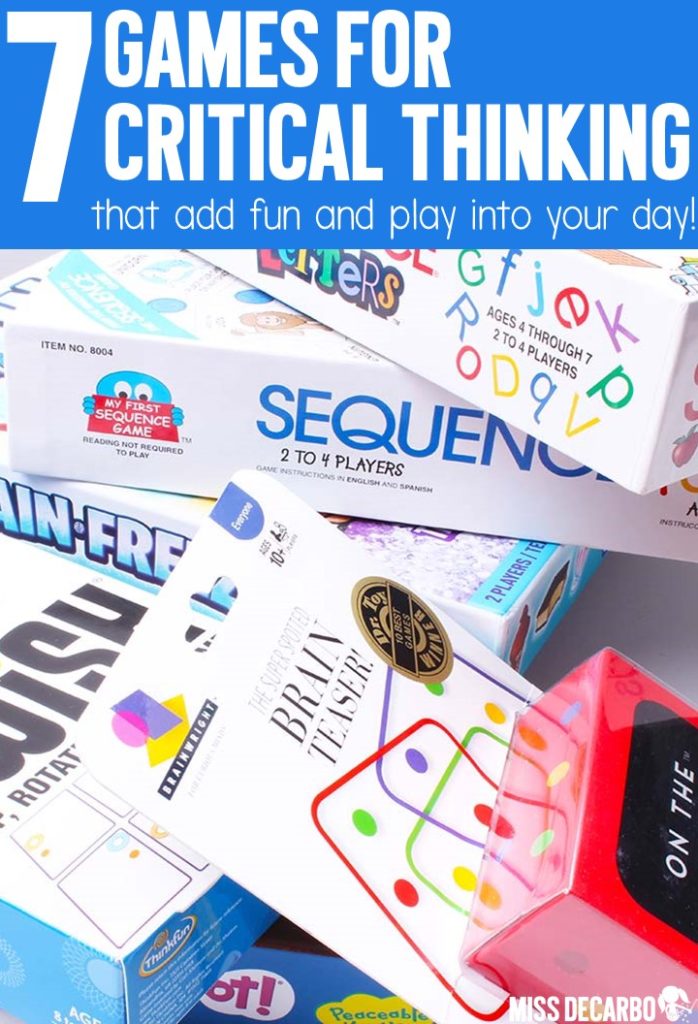
Similar Posts
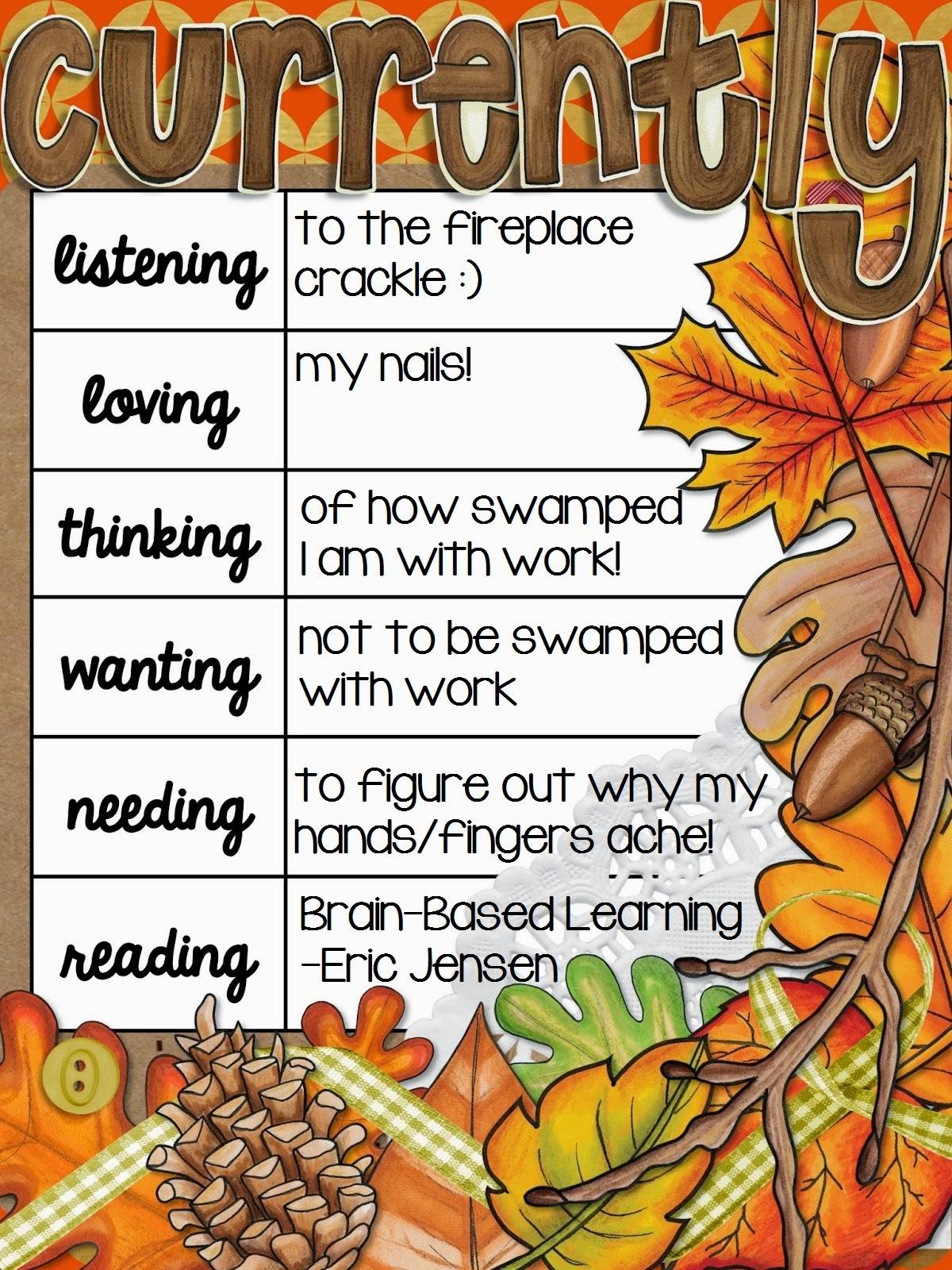
Currently (Late to the Party) and Photo Updates!
I haven’t blogged since Wednesday?! I usually do not go this long. Last week slipped away from me. There were these things called report cards. And…
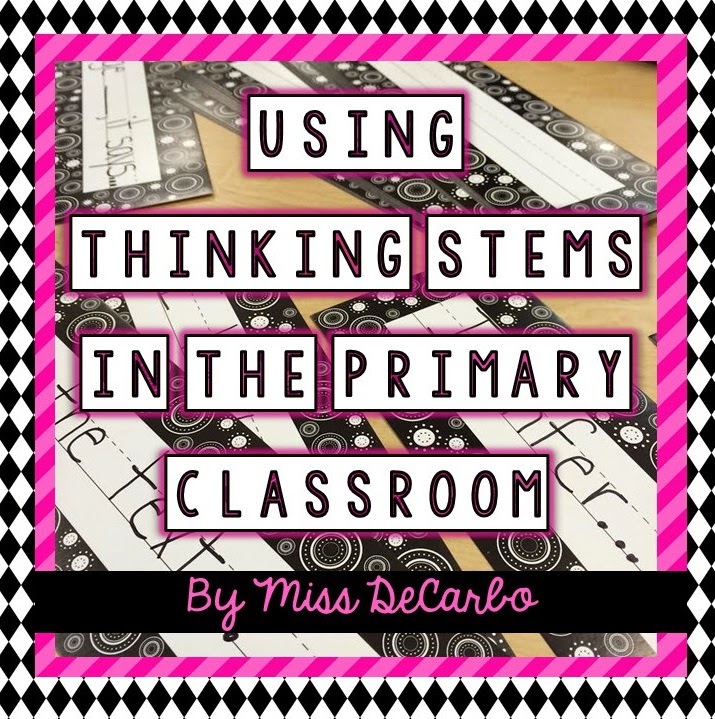
Using Thinking Stems In The Primary Classroom
Hello Teacher Friends! Today I would love to tell you about how I use thinking stems in my classroom! Thinking stems are simply a way to…
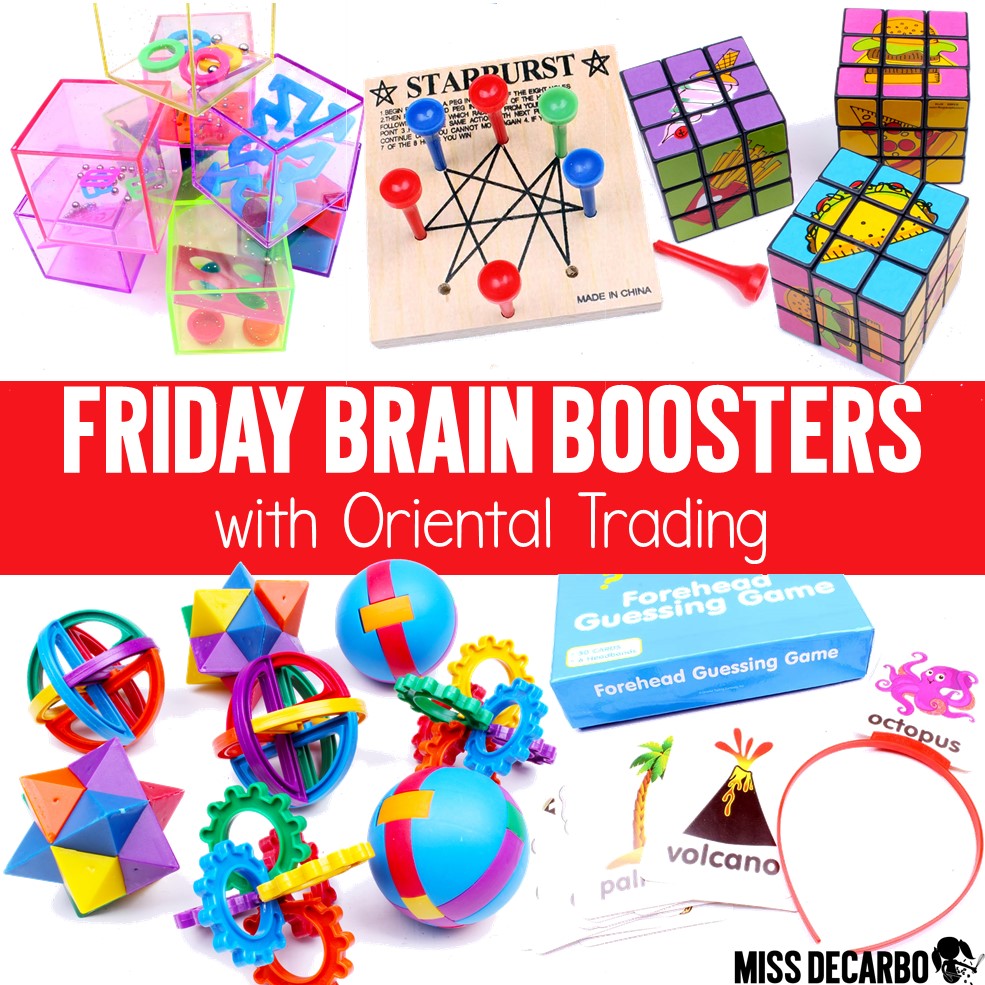
Brain Booster Buckets with Oriental Trading
Today, we’re going to talk about how to use games and toys in your classroom for increased critical thinking and problem-solving skills! When my first graders…
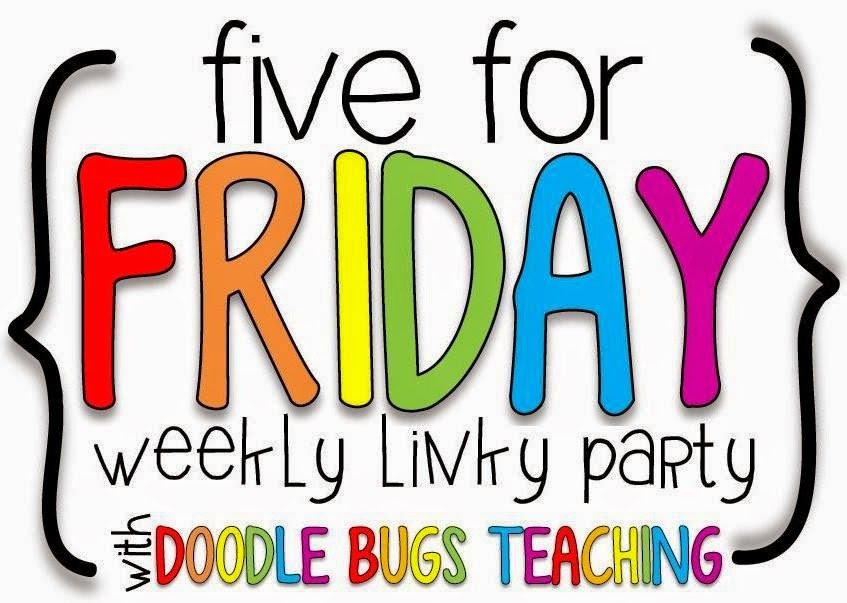
Five for Friday on Saturday! Pics, videos, and more!
It’s Saturday morning and I’m linking up with Doodle Bugs Teaching for her five for Friday linky party! Better late than never, right? I’m linking up…

Turkey Hunt Math Freebie!
November is flying by! I wanted to pop in tonight and share a fun math strategy game that my students have been LOVING this month! This…
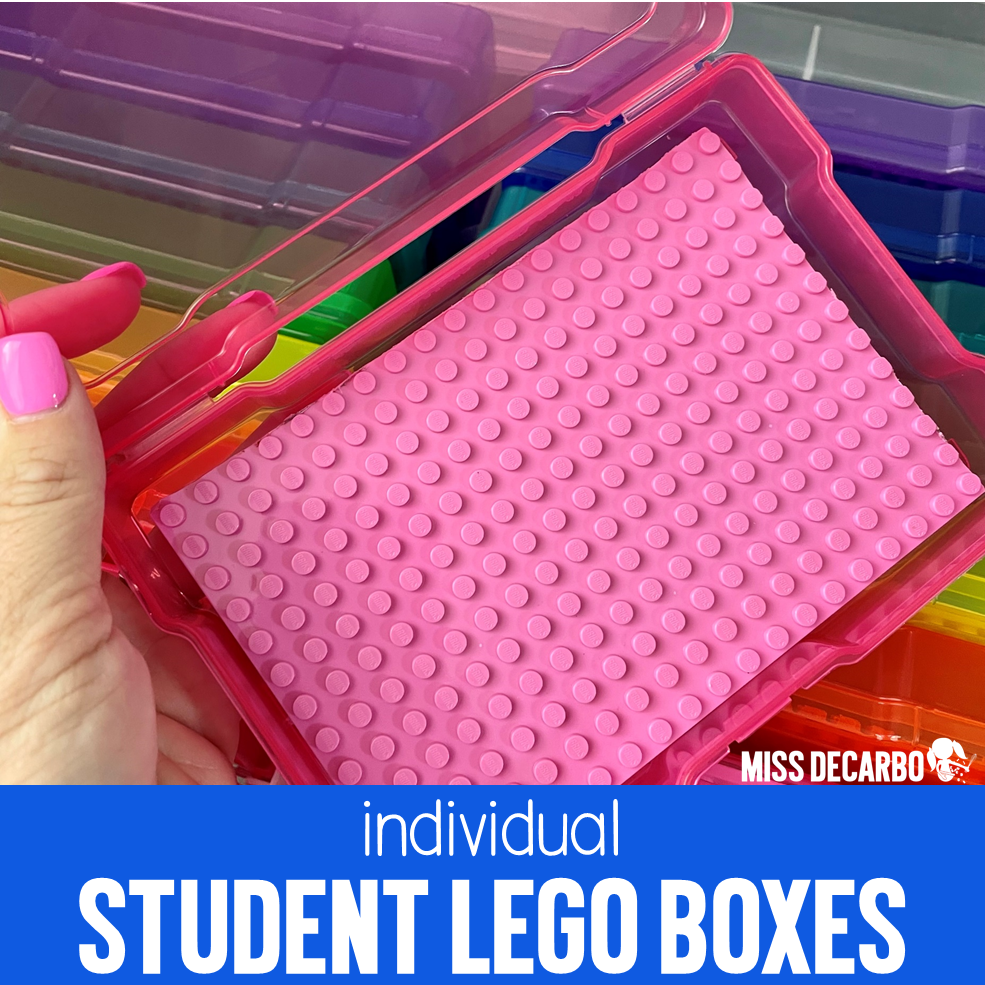
Individual Lego Bins for the classroom
As an elementary teacher, play-based learning that promotes critical thinking and creativity is SO important! In my classroom, our mornings always start with morning tubs, or…
One Comment
Loved all the games which you have shared with us. Perfect way to engage kids in such fun games for long hours which helps to nurture their overall growth. In this world of technology. where kids are inclined more towards playing online or video games, which affects their physical as well as mental growth. I think it the responsibility of parents to involve kids in games or activities which helps to improve their overall development. Saved your entire list of games to incorporate these in regular kids play. Thanks for sharing such an awesome list of games with us.
Leave a Reply Cancel reply
Your email address will not be published. Required fields are marked *
Username or Email Address
Remember Me
Lost your password?
Don't have an account yet? Sign up
- PLAY TODAY'S PUZZLES
- CUSTOMIZE PUZZLE TYPE/DIFFICULTY
- LEADERBOARD
- HOW TO PLAY
DAILY CHALLENGE
Puzzles update at midnight EST
Critical Thinking Puzzles Online
Discover the world of critical thinking puzzles online, where each challenge is an opportunity to sharpen your intellect and enhance your problem-solving skills. KenKen Puzzles offers an extensive array of free KenKen puzzles designed to foster critical thinking and logical analysis. These puzzles, ranging from logic puzzle games to complex reasoning games, are perfect for anyone looking to boost their cognitive abilities and engage in mentally stimulating activities. Critical thinking puzzles like the KenKen are more than just games; they are online tools for mental growth.
KENKEN for your Mobile
Fun, addicting, yet educational. The KenKen iOS and Android apps are perfect for the whole family!

Why You Should Play our Critical Thinking Puzzles Online
Find Critical Thinking Puzzles Online
Will Shortz, NY Times Crossword Puzzle Editor and NPR Puzzle Master Loves KenKen! Find out why
Rules For Playing KenKen®
The numbers you use in a KenKen puzzle depend on the size of the grid you choose. A 3 x 3 grid (3 squares across, 3 squares down) means you use the numbers 1, 2, and 3. In a 4 x 4 grid, use numbers 1 to 4. A 5x5 grid requires you use the numbers 1 to 5, and so on.
The numbers in each heavily outlined set of squares, called cages, must combine (in any order) to produce the target number in the top corner using the mathematic operation indicated (+, -, ×, ÷).
Here's how you play:
- Use each number only once per row, once per column.
- Cages with just one square should be filled in with the target number in the top corner.
- A number can be repeated within a cage as long as it is not in the same row or column.
- To start, click on any square. A "number ring" appears with that grid's possible numbers. These numbers will also show up on the left side above the grid as the "Notes" box.
- Ready to fill a number in that square? Just click the one you want in the number ring. It will then appear in the middle of the square.

- If you'd like to repeat a note (notes) in another square, simply drag the number from the original square to the new one. Click here to see the video of how it works.
- When you've ruled out one of your notes, click on it again in the Notes box. The number will disappear from the square.
- When you fill in a number in a square (by selecting from the number ring), any notes in that square will disappear.
- Changed your mind about a number? In the number ring, click the red eraser icon to clear the square.
- To hide the number ring, click the red "X."
- How to Use the Keyboard: You can enter numbers and notes by using the keyboard. Once you’ve selected a square, you can press shift and a number key to enter (or delete) that number as a note. Or, to just enter a number in a square, press that number on the keyboard (no shift). To delete a number or note, press C.

15 Fantastic Logic and Critical Thinking Games
Games are wonderful additions to any homeschool. In fact, we typically play at least one game a day – sometimes even gameschooling for an entire day!
Not only do games bring joy and lightheartedness to the school day, they can help teach new concepts and practice old ones.
One of the most important reasons I include games in our homeschool frequently is because they are amazing for building logic and critical thinking skills!
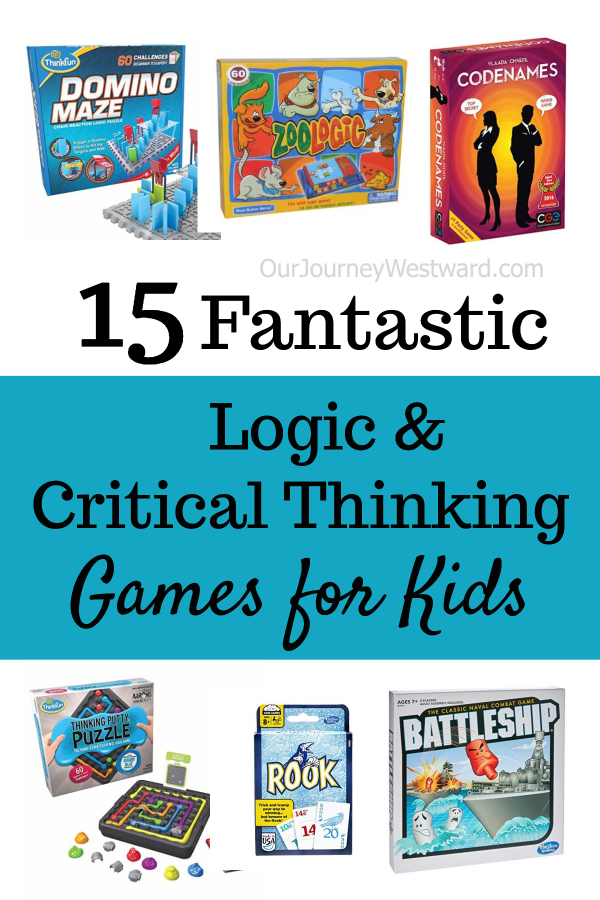
This post includes affiliate links.
If you’ve read any of my blog posts about brain training , you’ll know that I place a lot of value on building logical thinking skills in kids. Luckily, games are one of the best ways to do that – and they don’t even require much effort on our part!
While almost every game has logic and critical thinking value, some games are made specifically to give those skills a workout. I’ve included 15 of my favorites here for you!
Logic and Critical Thinking Games

Invasion of the Cow Snatchers – A creative, single player game that uses magnetic playing pieces as you maneuver a flying saucer around obstacles on a farm to beam up all the cattle.
Domino Maze – In this hands-on, single player game, you create fun domino mazes with a critical thinking twist as you set out to build based on challenge cards.
Thinking Putty Puzzle – This is another hands-on, single player game that “stretches” your thinking skills as you complete mazes with Thinking Putty.

Qwirkle – A family favorite, this game is kind of like Scrabble with shapes & colors. Your goal is to rack up as many points as possible as you work to complete symbol combinations.
Battleship – Coordinate graphing and logical thinking are required to sink all your opponent’s ships in this classic game for two players.
Mastermind – Another classic game for two players, Mastermind is truly a top pick for practicing logical thinking skills as you deduce a hidden code.

ZooLogic – This is such a cute single player game. You must figure out how to organize dogs, cats, and mice on puzzle cards so that no fights ensue between the animals.
Guess Who? – This is the perfect game to teach beginning critical thinking skills as you ask pertinent questions to figure out your opponent’s mystery character.
SET – Get ready to work logic skills faster than your opponents as everyone races to put together the next combination of cards based on shape, color, shading, and number.
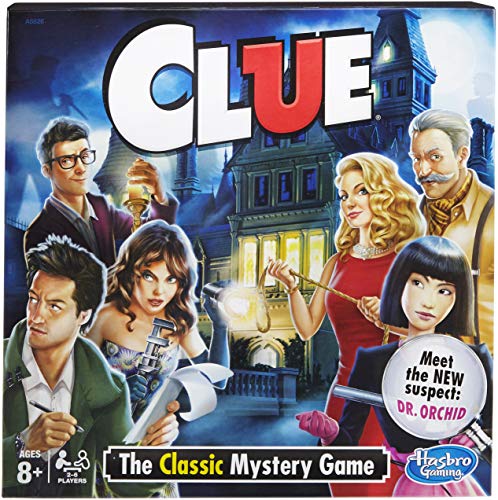
Clue – A good, old-fashioned game of Clue is perfect for sharpening logic and critical thinking skills since the goal is to use deductive reasoning to solve the mystery before anyone else.
Cat Crimes – In this hands-on, single player logic puzzle, you place cat characters on the board based on clues you are given in order to determine which one is to blame for an oopsie that has occurred.
Codenames – While this game can be played with as few as four people, it’s great for a crowd, too. Spymasters use word clues to help their teams logically consider which cards on the table will locate friendly spy agents instead of foes.

Rover Control – This creative, single player coding game teaches basic programming skills through critical thinking puzzles in which a rover must go through various start to finish challenges.
Rush Hour – A classic, single player game, Rush Hour utilizes logical thinking as you work to get an ice cream truck out of a rush hour traffic jam.
Rook – This four player card game is another family favorite that is won by logic and critical thinking between teammates (as well as a little luck.)
Gameschooling
There are so many wonderful games available these days! I’ve written about favorites for other subjects plenty of times. Feel free to click on any of the images below to see a different list of games.
P.S. Games make great gifts for any holiday or birthday. They also make great family gifts or for people who are hospital or homebound. Games are one the most frequent things we give when a gift is in order!

One Comment
I loved this list! It’s great to see so many fun options for encouraging logical thinking in kids. I can’t wait to try out a few of these games with my family!
Leave a Reply
Your email address will not be published. Required fields are marked *
- For Parents
- For Educators
- Our Work and Impact
- About Digital Citizenship
- Digital Citizenship Curriculum
- Digital Citizenship (U.K.)
- Lesson Collections
- All Lesson Plans
- Digital Life Dilemmas
- SEL in Digital Life Resource Center
- Implementation Guide
- Toolkits by Topic
- Digital Citizenship Week
- Digital Connections (Grades 6–8)
- Digital Compass™ (Grades 6–8)
- Digital Passport™ (Grades 3–5)
- Social Media TestDrive (Grades 6–8)

AI Literacy for Grades 6–12
- All Apps and Websites
- Curated Lists
- Best in Class
- Common Sense Selections
- About the Privacy Program
- Privacy Evaluations
- Privacy Articles
- Privacy Direct (Free download)
- Free Back-to-School Templates
- 21 Activities to Start School
- AI Movies, Podcasts, & Books
- Learning Podcasts
- Books for Digital Citizenship
- ChatGPT and Beyond
- Should Your School Have Cell Phone Ban?
- Digital Well-Being Discussions
- Supporting LGBTQ+ Students
- Offline Digital Citizenship
- Teaching with Tech
- Movies in the Classroom
- Social & Emotional Learning
- Digital Citizenship
- Tech & Learning
- News and Media Literacy
- Common Sense Recognized Educators
- Common Sense Education Ambassadors
- Browse Events and Training
- AI Foundations for Educators
- Digital Citizenship Teacher Training
- Modeling Digital Habits Teacher Training
- Student Privacy Teacher Training

Training Course: AI Foundations for Educators

Earn your Common Sense Education badge today!
- Family Engagement Toolkit
- Digital Citizenship Resources for Families
Family Tech Planners
Family and community engagement program.
- Workshops for Families with Kids Age 0–8
- Workshops for Middle and High School Families
- Kids and Tech Video Series

- Get Our Newsletter

Back-to-School Hub
Free digital citizenship resources for back-to-school, from AI to cellphone bans and beyond!
Games for Building Critical-Thinking Skills
Students love opportunities to sink their teeth into problems that don't have clear answers, or to tackle tough challenges that test their deduction skills and knowledge. It's often out of this challenging murkiness that new perspectives and ideas emerge. Treat your students to these terrific, fun critical thinking games and watch how they develop thinking skills and more complex understandings of the world. On this list are puzzle games that help students solve problems and think ahead, story-based games that help students understand and unpack local and global issues, and strategy games that get students to manage time and resources.
Minecraft: Education Edition
Stellar collaboration tools, controls make Minecraft classroom-ready
Bottom Line : An excellent tool to engage students in learning, collaboration, and critical thinking is now more accessible than ever to teachers.
Kahoot! DragonBox Learn Chess

Gentle chess puzzle game ideal for young newbies
Bottom Line : For kids who are new to chess but want to learn how to play, this fun intro to the game provides a well-done tutorial combined with a light overarching storyline.
Crayon Physics Deluxe

Influential physics game is still a draw
Bottom Line : Instantly engaging and super accessible to learners of many ages and abilities, Crayon Physics Deluxe fuses conceptual science learning with a brand of playful problem solving that demands creativity.
Contraption Maker

Solve problems, puzzles, brain teasers while creating wacky machines
Bottom Line : Hands-on problem-solving leads to great fun and independent learning with the right curricular wraparound to connect what kids are doing with what they need to know.

Classic logic puzzler gets a beautiful new look
Bottom Line : Promote powerful thinking skills, resilience, and decision-making through purely fun gameplay that will keep students begging for more.
Spiraling sandbox of adventure and creation gets kids to dig deep
Bottom Line : An irresistible and seemingly limitless incubator for 21st century skills that, with a little guidance, can chart new courses for learning.
WordWhile: Casual Literary Fun
Clever fill-in-the-blank game playfully promotes literature
Bottom Line : A different spin on reading the classics can engage students in the short term, but teachers should find ways to extend learning.
Little Alchemy 2

Flex alchemical muscles in amusing, discovery-based puzzler
Bottom Line : This amusing puzzle game encourages creativity, perseverance, and systems thinking, and with creative integration it can build interest in math, science, history, and literature.

Addicting gameplay jazzes up geography
Bottom Line : Game-based platform can get kids interested in world geography and expose them to different cultures on a surface level.
Slick ethics game teaches students to make tough decisions
Bottom Line : This versatile game that can teach ethics, argumentation, and civics is light on interactivity but will come alive through discussion.
Scribblenauts Remix
Vocab-building word puzzles inspire creative problem-solving
Bottom Line : Wide-open problem solving builds creativity, vocabulary, and spelling skills, but controls can be tricky.
Tyto Online

Ambitious science role-playing game has bright future
Bottom Line : Diverse characters, immersive experiences, and useful teacher tools make this life science RPG worth checking out.
Beats Empire
Music producing game balances fun with critical thinking and planning
Bottom Line : Students will have a blast with the music production and band-managing theme that carries with it some useful lessons in 21st century skills.

Refinement of strategy game formula supports historical exploration
Bottom Line : Like any consumer-oriented game, this experience will absorb and delight students far more than "educational" games, but it'll require open-minded and creative teaching.
An avant-garde journey of group dynamics sparks discussion
Bottom Line : An unusual app that will confuse and entertain classrooms, generating discussion on a number of societal and philosophical topics.
Mars Horizon

Authentic space agency sim focuses on logistics, planning
Bottom Line : This sim is backed by major space agencies, so it's a neat and trustworthy way to learn about the challenges of past and future space exploration.
NewsFeed Defenders
Social media simulation builds news literacy skills
Bottom Line : This is a great tool to kick off critical discussions about news and social media.
Professor Layton and the Curious Village

Brilliant, charming puzzler challenges kids' ELA and math skills
Bottom Line : It's on Nintendo DS so it's not easy to weave into a classroom, but it's worth it, bridging ELA and math in complex puzzles guaranteed to absorb students.
The Pack - NYSCI
Deceptively gentle coding game really packs a problem-solving punch
Bottom Line : This gorgeous, immersive programming game encourages novel solutions.
Think Like Churchill

Stunning visuals, thoughtful feedback bring critical decision points to life
Bottom Line : An excellent tool for studying the events and ethics that guide pivotal moments in history.
7 Billion Humans
Amusing puzzler challenges kids, teaches programming principles
Bottom Line : This high-quality puzzle game is a fun way for students to learn effective and efficient programming skills.
BBC iReporter

Spot real stories, dodge fake news in cheeky media literacy sim
Bottom Line : A refreshingly modern way for students to explore how to filter and interpret info and media during breaking news events.

Modern, minimalist fake news game has players be the villains
Bottom Line : Quick, fun, and to the point, this game gets at the social mechanics behind viral falsehoods.
Radio General

WWII game has layers of learning, novel voice-based controls
Bottom Line : This is a refreshingly new approach to a WWII game that offers students a more accurate simulation of battlefield chaos.
Sid Meier’s Civilization VI

Best entry in classic strategy series might not be best for classrooms
Bottom Line : As with all games in this series, Civilization VI is a great learning experience with the right support, but older, cheaper versions may be more practical for classrooms.

Provocative, first-person look at poverty builds empathy
Bottom Line : It'll need some scaffolding, but for students ready for the subject matter it's a great -- if sobering -- way to illustrate to students the daily realities and struggles of poverty in America.
Surviving Mars

Colonizing Mars is in our future, but why wait?
Bottom Line : Lots of potential and perhaps much better in a year or so of updates; use this in a class about space exploration and the harsh realities of colonization.
Political Animals

Charming political campaign sim mixes data analysis and civics
Bottom Line : It's a highly entertaining and surprisingly deep way to help students see the strategy -- as well as ethical choices -- involved in elections.
Papers, Please

Mature immigration game forces tough ethical choices
Bottom Line : It's a provocative simulation about ethics and immigration that could spark debate but might be tough to implement.
Parable of the Polygons

Dynamic interactive helps classrooms explore topics of bias, diversity
Bottom Line : A fascinating way to address how communities become segregated due to individual bias.
The Republia Times

Unassuming editorial sim elegantly exposes the business of bias
Bottom Line : What this game lacks in pizzazz it makes up for in smarts, and it's certain to get students thinking and talking about bias and media politics.
This War of Mine

Strategy game offers superb, mature take on war and civilian survival
Bottom Line : A stark portrayal of civilian life in a war-torn city that requires strategic thinking and invites repeated plays.
Related Content

Select preferred language
- Bahasa Indonesia
Activity Type
- Ice-Breakers
- Team-Building
- Trust Exercises
- Health & Wellness
- Team Puzzles
- Tag & PE Games
- Challenge Course
Program Outcome
- Get To Know One Another
- Develop Team Skills
- Build Trust & Empathy
- Enhance Wellbeing
- Quickly Re-Energise
- Interact & Share
- Be Physically Active
- Play & Have Fun
- Learn Names
- Reflect on Experience
Skill Development
- Communication
- Collaboration
Critical Thinking
- Self Awareness
- Self-Management
- Social Awareness
- Relationship Skills
- Decision-Making
- Goal Setting
- Behavioural Norms
- Accountability
- Adaptability
- Emotional Intelligence
- Mindfulness
- Physical Education
- Our Approach
- Free Resources
- Testimonials
- Training & Development
- Change Language
- Activity Ideas
- Debriefing Tips
- Leadership Tips
- Engaging Groups
- News & Events

Memberships (4)

Digital (6)

Specials (5)
Group games are ideal for developing critical-thinking skills.
The link between critical thinking and one’s education is obvious – you can’t learn well unless you think well.
Critical thinking is the ability to look at problems in new ways, to analyse how parts of a whole interact with one another and to interpret information and draw conclusions.
Critical thinking and problem-solving skills were once thought to be the domain of gifted people. Today, they are necessary for every individual and group who seeks to make sensible decisions about financial, health, civic, workplace and leisure activities.
The solutions to international concerns such as climate change and global warming require highly developed critical thinking and problem-solving abilities. These skills include the ability to effectively analyse and evaluate evidence, arguments, claims and beliefs.
Benefits of Developing Critical-Thinking Abilities
The ability to solve interesting and unfamiliar problems often leads to the development of other skills such as increased engagement, higher concentration levels and improved thought processing.
Here are a few examples of experiences that occur in many programs which may provide you with an opportunity to focus on problem-solving skills:
- Forming a project team to solve an existing, yet complex problem.
- Thinking of a new campaign slogan to broadcast a difficult, yet important message.
- Adopting a rational, analytical and evidence-based approach to investigate a conflict.
- Challenging one of your group’s long-held beliefs or practices.
Naturally, one of the most powerful (not to mention, enjoyable) ways to develop and strengthen your group’s problem-solving skills is to employ the use of fun group games.
Group Activities Which Develop Critical-Thinking Skills
The images below provide links to a sample of simple group activities which may help you develop the critical thinking and problem-solving abilities of your group, drawn from playmeo’s ever-expanding activity database .
Enjoy browsing to your heart’s content.
If you’re not yet a playmeo subscriber, join today to unlock hundreds more group games and activities just like these.

We Engage Cards
Premium subscribers enjoy all the features, save to playlist.
Thought-provoking series of cards to inspire engagement.
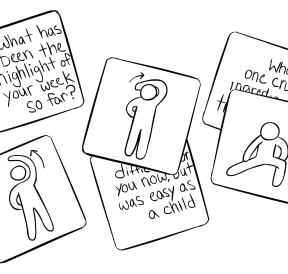
We Connect Cards
Set of question cards to inspire meaningful conversations.

Emoji Cards
Useful set of emotive cards to encourage fun & reflection.

Climer Cards
Fun deck of cards to inspire team-building & creativity.
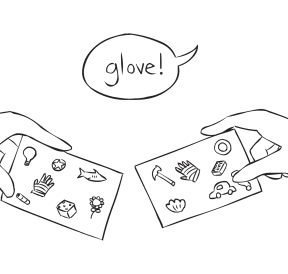
UBUNTU Cards
Innovative tool that inspires valuable sharing & fun.
Download our free 28-page ebook jam-packed with outrageously fun activity ideas.
Just one more question:
I am interested in…
Name that tune.
Share this with friends and colleagues.
Choose a plan that’s right for you
We offer a range of membership plans with no surprises. Click an option below & discover our simple pricing.
Click here if you’re a:
- Corporate trainer
- Outdoor educator
- Camp leader
- Youth leader
- Conference organiser
- Therapist/counsellor
Click here if you represent a:
- Corporation
- Community-based Organisation
Explore plans for 10, 50, 200 or more potential users
Remember Me
Forgot Password
Don't have an account? Join Today
Quiz: What is my child’s play personality?
Take our quiz to learn your child’s play style & how you can support them
Parent Resources for Learning > Critical Thinking > 5 Fun Critical Thinking Games to Play with Your Child
5 Fun Critical Thinking Games to Play with Your Child
by Dr. Jody Sherman LeVos | Mar 27, 2024 | Critical Thinking

Playing games is a great way for your child to develop their critical thinking skills—and the metaphor of a game is a great way to think about these important life skills!
Every time your child works through a problem they need to solve, a sequence they need to memorize, or a decision they need to make, they’re making their way toward the goal of improving their critical thinking.
It’s like a game where the reward at the end is better decision-making, stronger reasoning skills, and academic and professional success!
Kids will keep playing this game over the course of their lives, connecting new ideas to old ones and discarding one opinion for another. Each time, they’ll get better.
Ready to start? We’ve got some fun and easy game ideas for you!
The Short Cut
- Critical thinking is one of the 5 C’s that help kids thrive in school and life (an essential part of the Begin Approach to learning)
- The ability to think critically—as opposed to being intelligent—has been linked to wellness and fewer “negative life events”
- Good critical thinking activities often involve following rules, breaking tasks into sequences, asking questions, and understanding multiple perspectives
- Games (like this memory game ) are a fantastic way to develop critical thinking with kids because you can slip in challenges with the fun!
Why Is Critical Thinking Important?
Critical thinking is a necessary skill for understanding the world.
Through weighing options, studying different perspectives, and making good choices, our children can lead their lives in a positive and healthy way.
Critical thinking allows our kids to:
- Analyze information and make decisions
- Recall short sequences of information and simple instructions
- Ignore distractions to focus on a task
- Grasp the differences between sources of information
- Reason using logic
- Make connections between things
It’s one of the most important contributors to their overall well-being!

6 Critical Thinking Exercises for Everyday Life
Games aren’t the only critical thinking exercises that work well for kids. They also encounter many opportunities to build their skills on any given day.
How can you tap into those chances? Try these techniques.
1. Explain Things
No doubt you often find yourself on the receiving end of your child’s questions. Try to answer all of them. Daunting as that might sound (we know!), this helps your child learn how to formulate the questions they need to ask to make good judgments.
2. Back Up Rules with Good Reasons
Help your child understand the reasons behind rules. (A typical Q&A volley: “Please find a quiet activity to do after dinner.” “Why?” “Because your brother is asleep and we don’t want to wake him up.”)
This kind of exchange allows your child to understand why you’re asking them to do something, which fosters critical thinking.
3. Play Real-Life Problem-Solving Games
Playing strategy games—even simple ones designed for kids—develops analytical skills. You can also have fun turning household tasks into problem-solving games, like figuring out which socks go to which person when you’re folding laundry.
4. Cultivate Curiosity
Encourage your child to ask questions and dig deep to find answers. Curiosity leads to challenging assumptions and gaining new information. Ultimately it helps your child develop complex thinking skills.
5. Encourage Open-Mindedness
Help your child learn to be flexible in their thinking by giving them time to gather information before they make decisions. Considering various solutions helps kids learn that more than one way to do things can be correct.
6. Model Analytical Thinking
Our kids are always watching us. One of the best ways to influence your child’s critical thinking skills is by talking through decisions as you make them. (“I want to walk to the store. I can take a shortcut, but it’s on that dirt path and I’m wearing new sneakers. I want to keep them clean, so I’ll walk on the sidewalk instead.”)
5 Games to Guide Your Child’s Critical Thinking
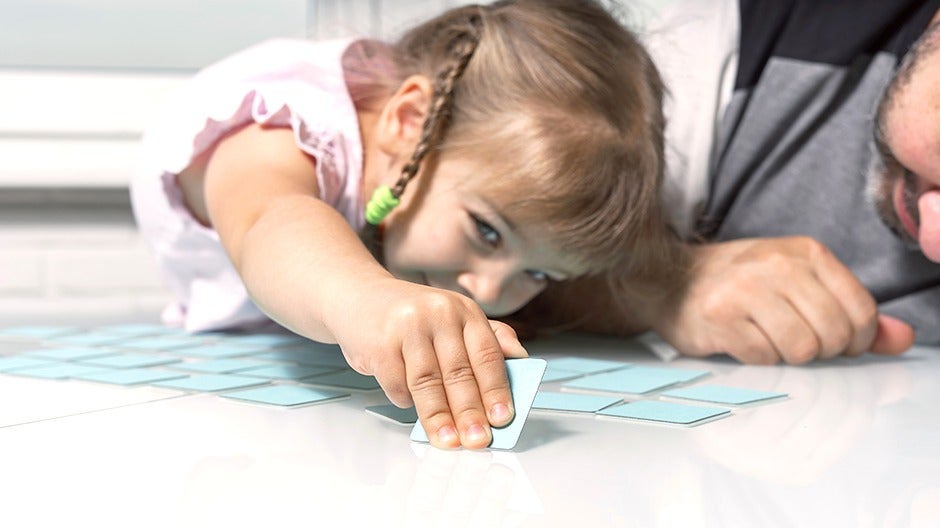
There are many educational critical thinking games you can play at home that help kids improve their skills! We’ve gathered a few we love:
This classic guessing game encourages analytical thinking and problem-solving skills (like deduction) as your child searches for specific objects based on clues.
Plus, it‘s highly portable! Play it in the car, on a walk, or even at the grocery store!
What You Need
- Nothing except space!
- Explain you’ll take turns identifying an object in your space.
- Model the game by going first. Choose an object that both of you can see.
- Share one detail about it. (“I spy something purple.”)
- Ask your child to guess what you’ve chosen.
- If your child is stumped or getting frustrated, add more clues (“The purple thing is a food, and it’s over by the apples.”)
- Trade roles so that your child chooses something for you to guess.
More Ways to Play
- Choose different rules, such as “the object has to start with A,” or “share three adjectives that describe the object,” or “make up one phrase this object might say”
2. Once Upon a Time
Storytelling is a great way to work on critical thinking skills like understanding cause and effect, choice-making, and sequencing. This game also taps into kids’ creativity (another one of the 5 C’s) through making up stories.
- Nothing but your imagination!
- Explain you’re going to build a story together by taking turns, one sentence at a time. You can give an example by reciting a story that your child already knows.
- Give an exciting first sentence that jumps into action, such as, “Once upon a time, a kid was on a rocket ship headed to Mars, when a meteor hit and fuel began to leak.”
- Ask your child to continue the story. If they get stuck, try asking them questions like “What did the rocket ship do next?” or “What did the kid do first to fix the problem?” or “How did the kid feel?”
- Continue taking turns until you come to a natural ending.
- Write down the story as you tell it, then read it out loud
- Create a book out of the story, using paper, markers, and a stapler or tape (art projects use many critical thinking skills)
- Use a prop to center the story on, like a toy or a stuffed animal
- Go outside and tell a story based on what you imagine you see in the clouds
3. Bet You Can Build It!
Designing a structure takes curiosity, planning, trial and error, and problem-solving. You can turn this activity into a game by laying out rules to follow.
- Marshmallows
- Craft sticks
- Cardboard tubes
- Anything else you’ve got at home!
- Gather your materials.
- Give your child the rules for the building challenge. (“Create the tallest building you can without it tipping over” or “Use all the marshmallows and toothpicks.”)
- Work on the structure together or each do your own.
- Celebrate when you’ve finished!
- Use a timer to add urgency to the game
- Bring the game to the floor and use bigger building materials, like blocks or plastic bricks
- Bring it outside and use objects found in nature
Get your child moving their whole body as they use planning, organization, and problem-solving skills to find their way through a maze.
- A surface to draw on, like a sidewalk, driveway, or playground blacktop
- Objects to use as obstacles
- A finish-line treasure (a favorite toy, a treat, etc.)
- Draw a maze with chalk. Try making a path by drawing borders on each side or a “tightrope” by only drawing one line your child will need to balance on as they walk.
- Add dead ends to make the maze more challenging.
- Use objects to create obstacles for your child to problem-solve a way past.
- Add a treasure at the finish to engage their imagination.
- Have your child start at one end and try to find their way through!
- Hone in on the treasure component of the maze by creating a scavenger hunt .
- Ask your child to draw a map of the maze when they’ve finished.
5. Obstacle Course
An obstacle course builds real-life skills. To get through their days, kids need to be able to remember lots of information (just think about all the rules at school!).
They also encounter problem-solving based on sequencing and memorizing shortcuts, directions, and solutions. (Think about learning how to write. Letters have to be in a specific order to make a word. That’s sequencing.)
Or you may allow your child to walk to school or the bus stop on their own. That’s all about memorizing directions.
Obstacle courses can help them practice these skills!
- Masking tape or chalk
- Jump rope or broom
- Big bouncy ball
- Play tunnel, table, or chair
- Board or pool noodle
- Log and plank
- Pillows, bean bag chairs, or large stuffed animal
- Any other objects you want!
- Gather your objects—you can play this game inside or outside.
- Design a path for your child by placing interactive objects along it. For instance, they can jump over the broom, crawl under the table, and balance on the log and plank.
- Show your child the sequence. You can demonstrate it or have them do a trial run.
- Let them start!
- Try asking your child to do the course backwards or blindfolded—with a partner!
- On a hot day (and outdoors!), add water components like carrying a bucket of water or running through a sprinkler
- Draw a map and instead of telling your child how to move through the course, give them the map to follow
- Add a fun time component and challenge your child to finish the course faster each time they do it
Cultivating Critical Thinking Skills with Begin
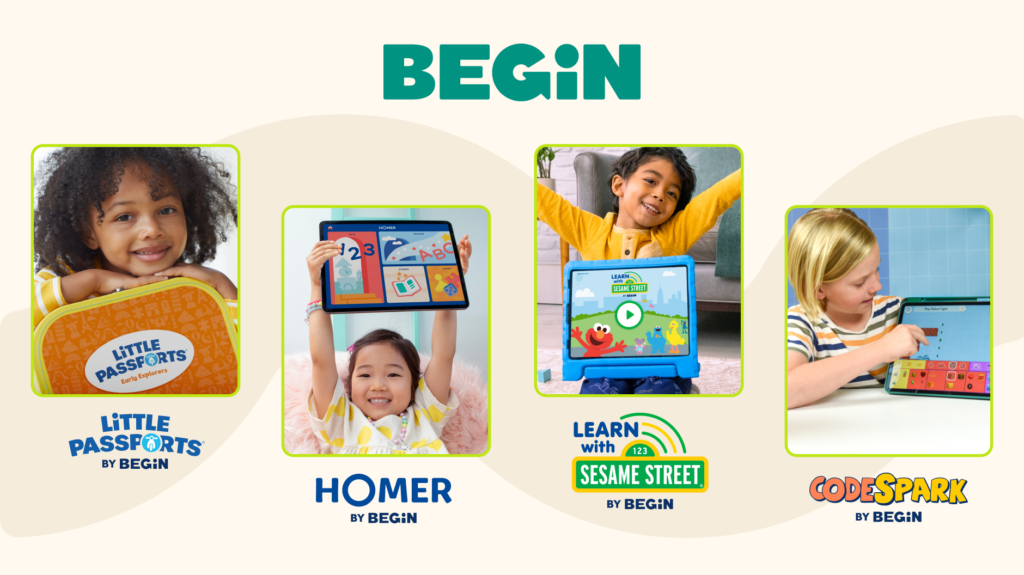
Because critical thinking is such an essential skill set, at Begin we build it into our age- and stage-matched learning membership . Through playing with Little Passports activity kits, the codeSpark coding app , and other award-winning learning products from Begin, kids can learn sequencing, make their own games, do science experiments, and more !
Take our online quiz today to discover which stage of the Begin membership is best for your family!

Jody has a Ph.D. in Developmental Science and more than a decade of experience in the children’s media and early learning space.
View all posts

Dr. Jody Sherman LeVos
Chief Learning Officer at Begin
Related Posts

Rote Counting: What Is It & How To Help Your Child Learn It
Rote counting is a major milestone in your child’s development. Learn about the benefits of this skill and how you can help your little one learn it.
Keep Reading →
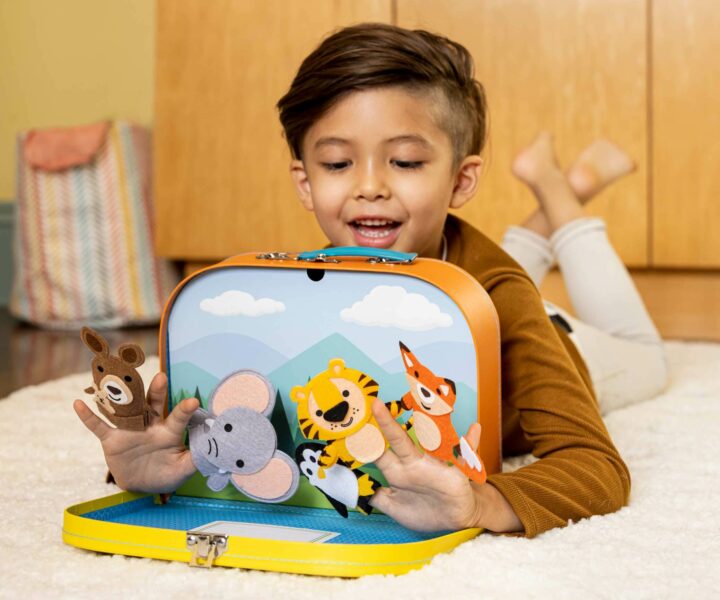
16 Important Types Of Play To Help Your Child Learn And Grow
Play is an essential part of childhood. Learn about the different types of play and how each can help your child grow and thrive in school and life.

First Day Of Kindergarten: What To Expect & Tips For Parents
xpect for you and your child on their first day of kindergarten and get practical tips on how to prepare for this big milestone.

First Day Of Preschool: What To Expect & Tips For Parents
The first day of preschool is a milestone in every child’s life that can be both frightening and exciting. This time away from home can be full of emotions and experiences that are completely new for you and your child. What’s the key to handling the change? A...

Emotions For Kids: Helping Your Child Understand Their Feelings
Learn how to teach emotions for kids so they can deal with their feelings in a healthy way.

7 Key Benefits Of Hands-On Learning (+5 Engaging Ideas)
Why is hands-on learning important? Discover the answer to this crucial question, plus a few tips to help your child get started with this learning style.

Reading Comprehension Strategies And Tips For Parents
How can you help your child develop reading comprehension skills and strategies, even as they are learning to read? We’re here to help with fun and easy tips!

A Parent’s Guide to Social-Emotional Learning for Kids
Social-emotional learning (SEL) helps kids develop essential skills to succeed in school and life. Find out how SEL works with our experts.
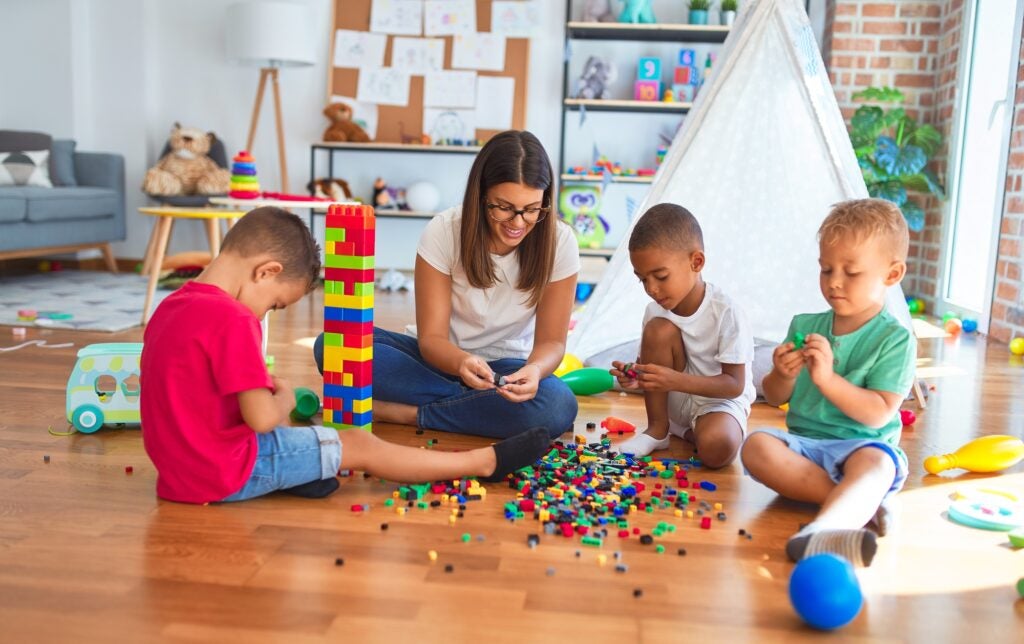
What Is Parallel Play, And How Does It Benefit Kids?
Parallel play is an important part of your child’s development. Learn about its benefits and how to encourage this type of play in your little one.
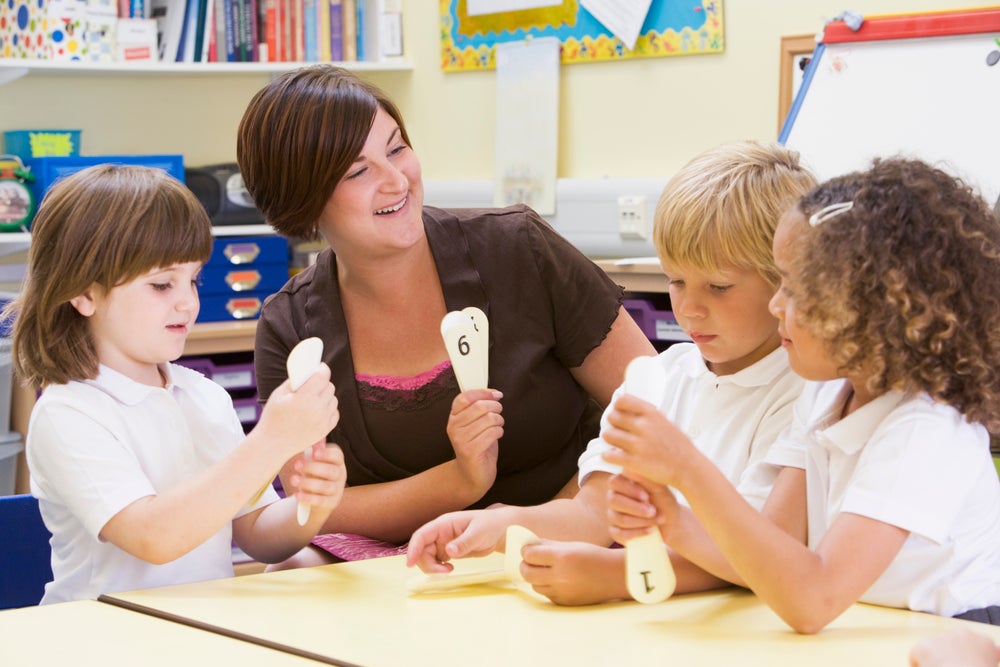
Ordinal Numbers: Definition And Activities For Kids
Learn how to teach ordinal numbers and help your child develop mathematical thinking.
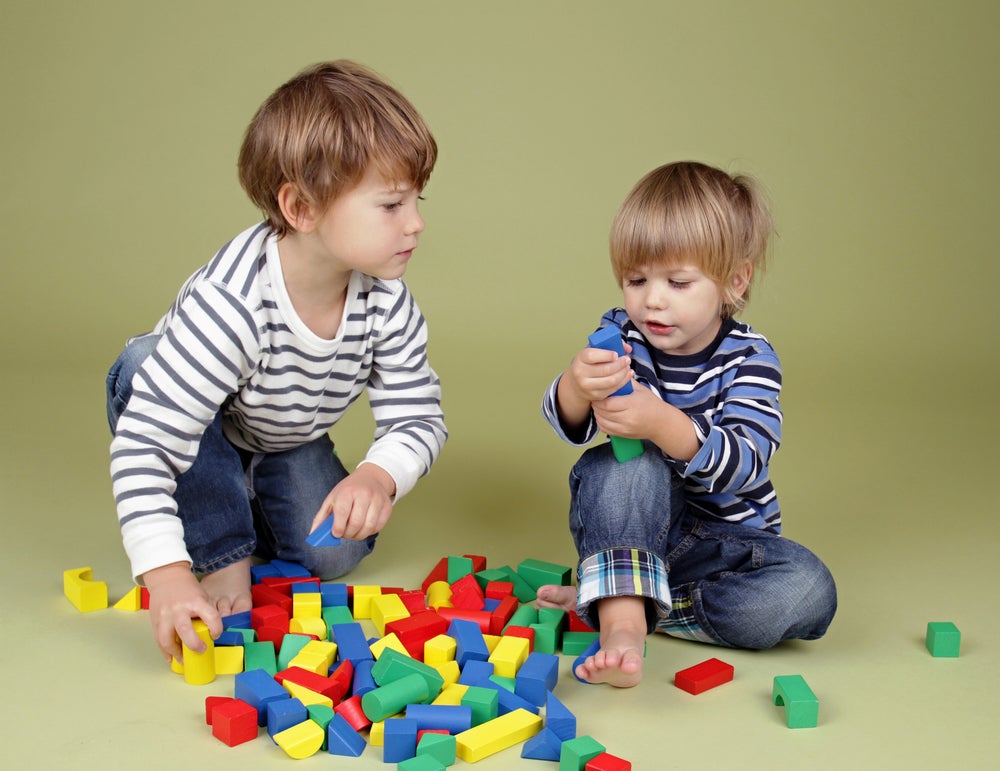
25 Social Skills Activities For Kids, Plus Tips For Parents
These social skills activities for kids will help them develop vital communication, teamwork, and problem-solving skills they’ll need throughout life.
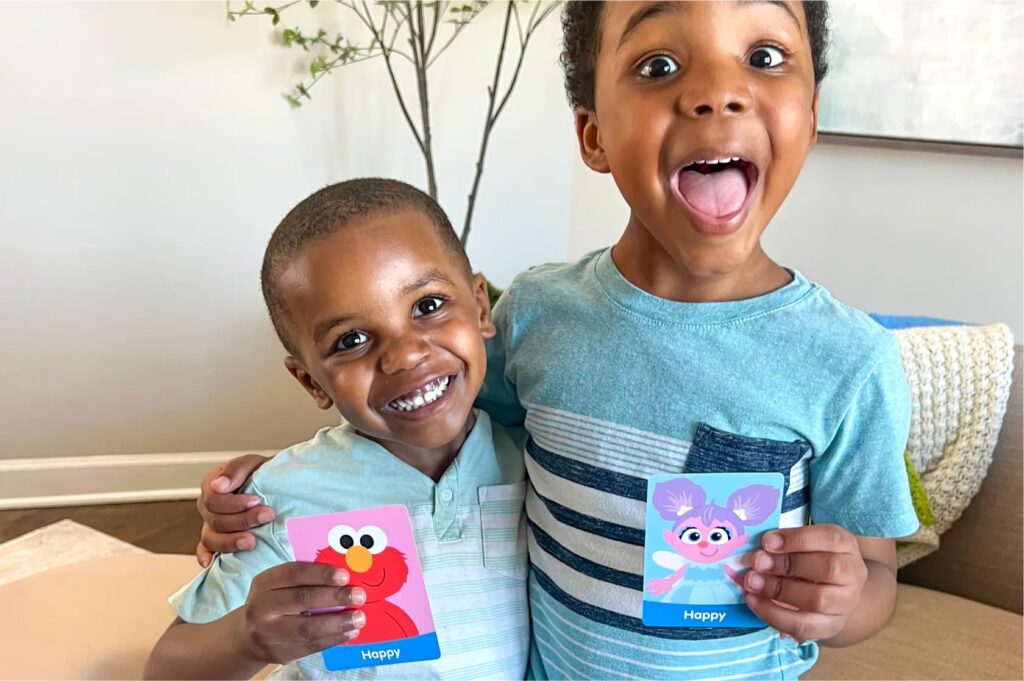
35 Social Emotional Learning Activities Kids Can Do At Home
These at-home social-emotional learning activities help kids develop and practice essential life skills, like self-awareness, empathy, and active listening.
5 Games for Building Critical Thinking Skills

- alfordabby's Blog
Games can be more than just a fun way to pass time; they can stimulate your brain and help you develop critical thinking skills. Critical thinking is the ability to examine information rationally and make a logical judgment based on your analysis. Critical thinking skills help us solve problems, make good decisions, and understand the consequences of our actions.
In this blog, we discuss five of our favorite games to improve critical thinking skills and sharpen the mind.
Chess is the most widely played board game of all time. Your goal in chess is to get a checkmate by getting your opponent’s king into a position where it can be captured and cannot be freed by your opponent’s next move. To win, you must use critical thinking and problem-solving skills to decide which pieces to move to yield the best results on the board.
Chess is all about thinking strategically, anticipating consequences, weighing options, and making strategic decisions. If you want to beat your opponent, you’ve got to get your mental muscles moving!

2. 4 in a Row
4 in a Row is a classic strategy game that encourages players to think strategically with every move to trick and beat their opponent. The objective of the game is to connect four pieces horizontally, vertically, or diagonally. Like Chess, you’ll have to plan your moves in advance to stump your opponent.
Identifying patterns and thinking ahead are both key critical thinking skills and 4 in a Row teaches both.
3. Backgammon
Despite being one of the oldest known board games, Backgammon is still one of the most popular critical thinking games. The objective of the game is to move all your checker pieces off the board and into one of the boxes on the right side.
Playing Backgammon can help teach basic arithmetic as well as more complicated themes like probability and luck. The game teaches players to not rely on pure luck by using strategies and tactics to overcome a bad roll. Players must use critical thinking skills to think ahead and identify patterns to determine the least damaging move and what move will give them an advantage if their opponent has a good roll.
2048 is a single-player puzzle game that encourages players to plan ahead and think strategically. The objective of the game is to join the numbers to get a single tile to be 2048.
2048 requires you to use critical thinking skills to identify the best way to move a tile to generate the number 2048. The game also promotes strategic planning to maximize your time before you run out of moves.
To further improve your critical thinking skills and make the game more challenging, consider setting a time limit.
5. Minesweeper
This single-player puzzle game teaches pattern recognition and deductive reasoning. Minesweeper is a game rooted in logic, problem solving, and deduction. The objective of the game is to clear all the squares on the board that don’t have mines and flag all the mines in the shortest time possible.
Minesweeper teaches pattern recognition as you’ll learn how to look at a series of numbers and figure out what the numbers mean when they’re in a specific order. The more you play the more you’ll pick up on different patterns and the quicker you’ll be able to solve deduction-based problems.
This goes to show that games are not just a form of entertainment. The right games can also be intellectually stimulating and improve critical thinking skills. To further improve your critical thinking skills while having fun at the same time, check out our favorite thinking games to put your critical thinking skills to the test and train your brain.

10 Team-Building Games That Promote Critical Thinking
Begin a story that incorporates whatever happens to be on your assigned photo. The next student continues the story, incorporating their photo, and so on.
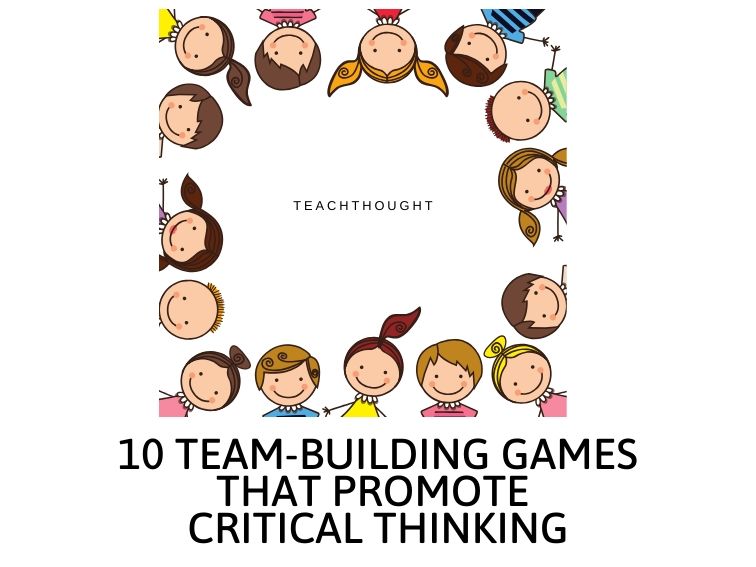
What Are The Best Team-Building Games For Promoting Critical Thinking?
by TeachThought Staff
One of education’s primary goals is to groom the next generation of little humans to succeed in the ‘real world.’
Yes, there are mounds of curricula they must master in a wide breadth of subjects, but education does not begin and end with a textbook or test.
Other skills must be honed, too, not the least of which is how to get along with their peers and work well with others. This is not something that can be cultivated through rote memorization or with strategically placed posters.
Students must be engaged and cooperation must be practiced, and often. The following team-building games can promote cooperation and communication, help establish a positive classroom environment and — most importantly — provide a fun, much-needed reprieve from routine.
See also Team-Building Games For The First Day Of School
10 Team-Building Games That Promote Collaborative Critical Thinking
You can purchase a classroom-ready version of team-building games that promote critical thinking here .
1. If You Build it…
This team-building game is flexible. First, divide students into teams and give them equal amounts of a certain material, like pipe cleaners, blocks, or even dried spaghetti and marshmallows.
Then, give them something to construct. The challenge can be variable (think: Which team can build the tallest, structurally-sound castle? Which team can build a castle the fastest?). You can recycle this activity throughout the year by adapting the challenge or materials to specific content areas.
Skills: Communication; problem-solving
2. Save the Egg
This activity can get messy and may be suitable for older children who can follow safety guidelines when working with raw eggs. Teams must work together to find a way to ‘save’ the egg (Humpty Dumpty for elementary school students?) — in this case, an egg dropped from a specific height. That could involve finding the perfect soft landing, or creating a device that guides the egg safely to the ground.
Let their creativity work here.
Skills: Problem-solving, creative collaboration
Zoom is a classic classroom cooperative game that never seems to go out of style. Simply form students into a circle and give each a unique picture of an object, animal, or whatever else suits your fancy. You begin a story that incorporates whatever happens to be on your assigned photo. The next student continues the story, incorporating their photo, and so on.
Skills: Communication; creative collaboration
4. Minefield
Another classic team-building game. Arrange some sort of obstacle course and divide students into teams. Students take turns navigating the ‘minefield’ while blindfolded, with only their teammates to guide them. You can also require students to only use certain words or clues to make it challenging or content-area specific.
Skills: Communication; trust
See also 10 Team-Building Games For A Friendlier Classroom
5. The Worst-Case Scenario
Fabricate a scenario in which students would need to work together and solve problems to succeed, like being stranded on a deserted island or getting lost at sea. Ask them to work together to concoct a solution that ensures everyone arrives safely. You might ask them to come up with a list of 10 must-have items that would help them most, or a creative passage to safety. Encourage them to vote — everyone must agree to the final solution.
Skills: Communication, problem-solving
6. A Shrinking Vessel
This game requires a good deal of strategy in addition to teamwork. Its rules are deceptively simple: The entire group must find a way to occupy a space that shrinks over time until they are packed creatively like sardines. You can form the boundary with a rope, a tarp or blanket being folded over, or small traffic cones. (Skills: Problem-solving; teamwork)
7. Go for Gold
This game is similar to the ‘If you build it’ game: Teams have a common objective but instead of each one having the same materials, they have access to a whole cache of materials. For instance, the goal might be to create a contraption with pipes, rubber tubing, and pieces of cardboard that can carry a marble from point A to point B in a certain number of steps, using only gravity.
Creative collaboration; communication; problem-solving
8. It’s a Mystery
Many children (and grown-ups) enjoy a good mystery, so why not design one that must be solved cooperatively? Give each student a numbered clue. In order to solve the mystery — say, the case of the missing mascot — children must work together to solve the clues in order. The ‘case’ might require them to move from one area of the room to the next, uncovering more clues.
Skills: Problem-solving, communication
9. 4-Way Tug-of-War
That playground classic is still a hit — not to mention inexpensive and simple to execute. For a unique variation, set up a multi-directional game by tying ropes in such a way that three or four teams tug at once. Some teams might choose to work together to eliminate the other groups before going head-to-head.
Skills: Teamwork; sportsmanship
10. Keep it Real
This open-ended concept is simple and serves as an excellent segue into problem-based learning. Challenge students to identify and cooperatively solve a real problem in their schools or communities. You may set the parameters, including a time limit, materials, and physical boundaries.
Skills: Problem-solving; communication
While education technology is a basic and crucial component of the 21st-century classroom, educators must still ensure that students are engaging with each other in meaningful ways. Team-building exercises are a great way to do this, and because of this, they will never go out of style.
Aimee Hosler is a writer and mother of two living in Virginia. She specializes in a number of topics, but is particularly passionate about education and workplace news and trends. She holds a B.S. in Journalism from California Polytechnic State University in San Luis Obispo and is a contributor to several websites including OnlineSchools.com; 10 Team-Building Games For Kids, Teenagers, or Adults
TeachThought is an organization dedicated to innovation in education through the growth of outstanding teachers.
🎒 Back-To-School Sale: 30% OFF + Get a Free Family Plan!

Free Thinking Games for Kids

Play Online Thinking Games for Free
This thinking game improves planning , visual attention , and math skills.
Logic Balls
This critical thinking game improves reasoning , planning and visualization skills.
Dwarf Giant
This free logical reasoning game improves reaction control , focusing , and divided attention skills.
Pick Your Candy
This online reasoning game improves reaction control , focus , and divided attention skills.
Visual Thinking Games
Face Memory Game
These thinking games for kids improve visual memory , verbal memory and visual attention skills!
Spot the Difference
This critical thinking game for kids improves visual attention , visual scanning , and comparison skills.
This logical thinking game improves visual scanning , planning , and spatial memory skills.
Hidden Object Game
These kinds of free thinking games are a gold mine for those looking for ways to improve their thinking skills. Let’s give a try!

Kids love—parents trust. Named among the best in family-friendly products by U.S. Teachers and Moms.

The convenience of MentalUP’s content to the UK curriculum has been proved by the Education Alliance Finland .

MentalUP has been qualified to get EVIDENCE of IMPACT Award by University College London for its academic contribution.

Loved by over 10 million users . Join millions of parents, teachers, and kids all around the world.

It’s a safe, fun world for kids. There are no ads or inappropriate content either.

Online & Free Language Games
Verbal language games.
Word Generator
This brain word game improves vocabulary, verbal Fluency and planning skills.
This language game for kids improve vocabulary , verbal fluency , and reasoning skills.
This English language game improves verbal fluency and vocabulary skills.
Word Search
This quick-thinking game improves vocabulary , visual scanning , and conceptualization skills.
English Language Games
Memory Match Game
This intelligence game for kids improves short-term memory , verbal memory , and sustained attention skills.
Color Mind Game
The best among the color mind games! It improves visual attention and conceptualization skills.
Word Categories
This mind training game improves vocabulary , conceptualization , and divided attention skills
Relationship Status
This rational thinking game targeting to improve conceptualization, comparison , and divided attention skills.

Trusted by World Leading Communities
We recommend the MentalUP which is developed by academicians and pedagogues and is filled with educational brain teasers.

MentalUP Educational Games will enable your child to use technology in a beneficial way.

MentalUP is an online innovative games resources for teachers and parents.

MentalUP does brain training well. Its games are easy to understand while challenging the skills which they are designed to stretch.

MentalUP is a UK-based award-winning scientific-educational application containing cognitive learning games for K-8 learners.

MentalUP developed by game designers and academics incorporating innovative teaching methods to offer dozens of mind games.

FEATURES OF THE MENTALUP
- PERSONALIZED THINKING GAMES.
- ON YOUR COMPUTER, SMARTPHONE OR TABLET.
- 20-MINUTES DAILY WORKOUT.
BENEFITS OF MENTALUP
- BOTH ENTERTAINING AND SCIENTIFIC MIND GAMES FOR CHILDREN.
- IMPROVES MENTAL AND THINKING SKILLS.
- SUCCESS IN SCHOOL AND EXAMS.
Try MentalUP Thinking Games and Improve Your Skills!
Fun Critical Thinking Activities

Learning to evaluate information, find credible sources, and prepare for counterarguments is an important skill for people to learn, especially in the modern age of information. Here are 10 great critical thinking activities designed to develop your critical thinking skills.
With so much information on the internet, parsing through what’s true and what isn’t can be a difficult challenge that relies heavily on your ability to think critically . The rest of this article will discuss 10 fun activities to improve your critical thinking skills.
Worst Case Scenario
In this first scenario, you’ll want a group of friends to bounce ideas around. The premise works by assuming that you and a group of friends are in a worst-case scenario. This might be the classic stranded on a desert island trope, but you can also change it up with something like being trapped in a spaceship with hostile aliens aboard.
In this exercise, you’ll be required to think both creatively and critically to evaluate what your best course of action is, how to allocate resources, and who should take on what roles and responsibilities.
Creative Construction
This exercise works your critical thinking muscles by forcing you to evaluate the resources you have on hand, what you can build out of them, and how you’re going to go about constructing it with the tools you have.
Story Telling
A very popular game that’s still worth its salt for adults, this activity starts with a series of random images. You can pull these straight from pictures on a browser and put them into a slideshow. Get a group together for your favorite storytime.
Not only does this create some hilarious stories, but it allows you to develop your critical thinking skills by evaluating how the image you’re given and the story might pair up.
Pragmatic Problem Solving
Where applicable, you can convert this idea into action by sharing your plan with public officials or starting a petition to inspire the change you want to see. Considering how different perspectives and resources play into this quandary is a powerful thought exercise that can help you develop your critical thinking skills.
Critical Analysis
Another great and dead simple exercise to develop your critical thinking skills is analyzing a popular piece of literature. Read it carefully and evaluate the author’s opinion, the biases behind them, and how you would either agree or contradict their viewpoints.
Controversy Conundrum
Not only do you have to present and uphold your viewpoint, but you’ll be obligated to address and respond to opposing viewpoints. To make this a twist, consider which side you’d take in the question and force yourself (and all participants) to defend their opponents’ points of view.
Alien Vacation
An entertaining premise puts you in the role of a tour guide for an alien on vacation. Evaluate something you take for granted, like a baseball game, and try to explain every aspect about it in a way that an alien would be able to comprehend. To add some humor, take turns on this exercise and have a friend play the alien to ask those probing questions.
Prison Promises
Competitor compromises.
Not only is this exercise good for developing critical thinking , but it’s a good way to think about your business. Consider your greatest business rival and assess how you could help them succeed further in their business without detrimentally affecting your own.
Final Thoughts on Fun Critical Thinking Activities
There are lots of great critical thinking exercises you can partake in, whether you want to get a group of friends together or just sit down with a pen and a pencil. Developing these skills is a dynamic and valuable way of improving your ability to solve problems.
You may also like
Clinical reasoning and critical thinking, critical thinking in leadership, 10 critical thinking questions you can use to solve everyday problems, tips on how to use critical thinking in reading and writing, download this free ebook.

10 Team-Building Games That Promote Critical Thinking
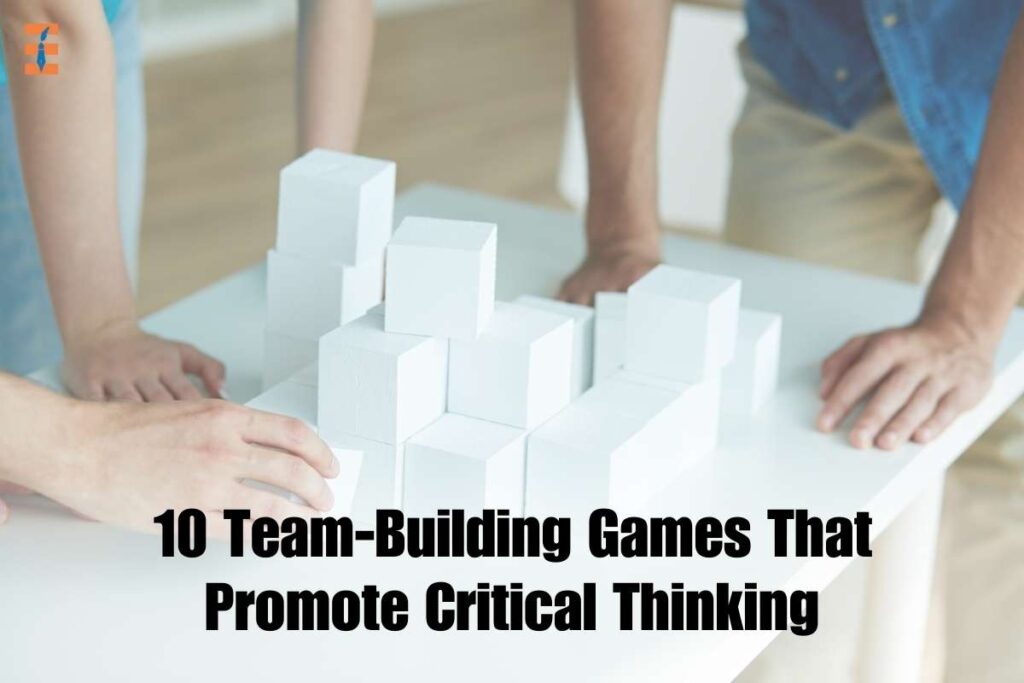
Students may improve their capabilities in critical thinking and other skills that will help them be successful in the contemporary job by participating in Team-building games for critical thinking. Students who value collaboration (and who will go on to become employers!) have higher levels of motivation and creativity.
It is common knowledge that kids like collaborating in groups very lot. Why don’t we make it into a game instead? Games are often a better option than brain training activities for helping children develop lateral thinking. However, brain training activities may be employed. Implementing these strategies in your classes can help students become more critical thinkers and more successful collaborators.
Here are 10 Team-Building Games That Promote Critical Thinking;
1. minefield.
Minefield Team-building games for critical thinking is a time-honored exercise that has been shown to foster better communication and a sense of trust among participants of all ages. It requires the construction of an obstacle course as well as the grouping of the students into different teams. Students take turns navigating the “minefield” while wearing blindfolds and relying only on the support of their classmates to find their way. You might also encourage kids to use certain terms or hints in order to make it more challenging for them or to utilize information that is related to the topic in order to make it more interesting to them.
2. If You Build it
This exercise in establishing teams may easily be adapted to fit your needs. To get started, separate the children into teams and give each group an equal quantity of a certain substance. Some examples of this material are pipe cleaners, bricks, dried spaghetti, and marshmallows.

After that, you should assign them a project to work on. The challenge may take on a variety of forms, such as “which team can build the biggest castle that is also structurally sound?” Which side has the capacity to build the greatest number of castles in the least period of time? You may recycle this exercise throughout the year by modifying the challenge or the resources to correspond to other subject areas in the curriculum.
3. It’s a Mystery
Since many children, especially younger ones, like a good mystery, why not challenge them to solve it in a way that encourages them to collaborate with one another? It would be helpful to offer each child a numbered clue. The youngsters need to cooperate in order to find the answers to the clues in order to allow themselves enough time to solve the mystery, such as the case of the missing mascot. It’s possible that in order to solve the “case,” they’ll need to go about the room and look in other areas for additional clues.
Zoom team-building games for critical thinking is an old standby when it comes to games for constructing teams, and the many advantages that come with playing the game make it even more interesting. The children are seated in a circle, and one child gives each child an image of an item from Zoom.
The game begins with one child relating a story based on the image that they are holding, and the next student continues the story from where the previous student left off. The game helps youngsters improve their creativity, critical thinking, and communication abilities by compelling them to create the tales on the spot and challenging them to think critically about what they’ve written.
5. Save the Egg
During this team-building games for critical thinking, each team of three or four persons will have the opportunity to drop their egg from a certain height. They need to devise strategies that will prevent the egg from cracking while it is in the air. They are free to use whatever items or apparatus of their choosing to effect a soft landing for the egg or to guarantee that it settles in an unharmed state.
Because this one has the potential to get ugly, it is essential to choose a site that is risk-free and where no one will be worried about hurting valuable school property.
6. marshmallows-game

7. Go for Gold
The teams compete to achieve the same objective in this Team-building games for critical thinking, which is similar to the game “If you create it,” but rather than having the same resources, the teams have access to a huge quantity. For instance, the objective may be to construct, consisting of pipes, rubber tubing, and cardboard, a machine that, with the only assistance of gravity, can move a marble from point A to point B in a certain number of stages.
Although learning through textbooks is essential, teachers also have a responsibility to ensure that pupils can interact effectively with one another. Exercises that focus on fostering a sense of teamwork are an effective way to do this, and there is no sign that this fad will ever die out.
8. Keep it Real
Because it is founded on a straightforward concept that encourages conversation and problem-solving, this open-ended model functions as an efficient examination tool for students. Give the students the mission to identify and address a genuine issue that exists in their own schools or communities. For the purpose of assisting youngsters in defining their own boundaries, some restrictions, such as time limits, material limits, and physical limitations, might be put on them.
9. Shrinking Vessel
Critical thinking may be tough to understand after undergoing brain training, but after participating in exciting Team-building games for critical thinking like the shrinking vessel, it quickly becomes second nature. The participants will first be split up into smaller groups to begin the exercise. Every group is going to have to coordinate their efforts so that they can fit into a smaller and smaller area until there is no more room. Cones or a rope might be used to define the perimeter of the area. Playing this game will teach you how to collaborate with others to find solutions to challenges.

10. The Worst-Case Scenario
Students are split up into two or more groups, and each of those groups is given a tough scenario to solve. Some examples of these scenarios include being abandoned on a barren island or becoming lost at sea. They are then given the instruction to collaborate with one another within their teams in order to find a solution to the challenge and ultimately emerge triumphant. The children have to come up with a strategy in order to guarantee that everyone will live through the worst-case scenario.
In this particular situation, the students may be quizzed about the things that they will need in order to do the task, in addition to any other passages that they may come across. The fact that youngsters are required to cooperate with one another helps in the development of their ability to solve problems and teaches them the importance of working together as a team through Team-building games for critical thinking.
Bottom line
To achieve the highest productivity at work, Team-building games for critical thinking are conducted in distinct corporate games. However, these games can boost efficiency in the study if undertaken in a classroom atmosphere. They help students to break the monotony in the learning environment. We hope our blog helped you to get new ideas regarding Team-building games for critical thinking. You can implement them in your next session within the classroom.
Most Popular Stories

Harvard to Host Historic Summit Addressing Antisemitism and Zionism in Higher Education
Historic Gathering Set to Address Crisis The Harvard Jewish Alumni Alliance, in collaboration with Chabad at Harvard, Harvard Hillel, and

Myths about Graphic Novels and Comic Books: The Significance and Stereotypical Myths
Graphic novels and comic books play an important role in storytelling. They have evolved to be one of the best

Teacher Incentive Fund: A Tool for Enhancing Teacher Engagement and Productivity
Incentives work for the best if you are willing to boost productivity. Teaching is a noble profession and the future

Climate Crisis and Education: A Call for Action
Climate Change Education: A Vital Tool for Climate Action Education plays a pivotal role in addressing the climate crisis, catalyzing

Minnesota Officials Subpoenaed in Feeding Our Future Fraud Investigation
Source-timesnownews.com Federal Committee Demands Accountability (WASHINGTON, DC) – Minnesota Governor Tim Walz and Education Commissioner Willie Jett, alongside high-ranking officials

Education’s Critical Role in Combating Climate Change
Source-blogs.worldbank.org Education: A Key Driver for Combating Climate Change Education plays a vital role in addressing the climate crisis, reshaping

Arizona Students Share Big Dreams as State Treasurer Kimberly Yee Launches College Savings Essay Contest
Kicking Off College Savings Month with Student Aspirations September marks the start of College Savings Month in Arizona. State Treasurer

Arizona High Schools Expand Career and Technical Education with New Robotics Program
Arizona's Growing Demand for Career and Technical Education Programs As industries in Arizona increasingly seek skilled professionals, the demand for
Join Our Newsletter!
Get the latest education updates delivered to your inbox.

Future Education Magazine is an exceptional source of knowledge and resources for those looking to choose the right path in education. Whether you are a student, parent, educator, or education enthusiast, our magazine is committed to providing you with insightful and valuable content.
- Higher Education
- Professional Courses
- Privacy Policy
- Terms & Conditions
- [email protected]
- +1 (408) 520-9503
- 3277 S White Rd #41 San Jose, CA 95148, United States
Copyright © 2024: Future Education Magazine | All rights reserved.

10 Great Critical Thinking Activities That Engage Your Learners
How can learners own their learning with critical thinking activities they’ll really love? Allowing our learners to take stands on issues that matter to them engages the classroom in a way that fosters great critical thinking.
Who? What? Why? When? Where? How? When they can relate these questions to themselves and exercise personal self-reflection, we build community and “heart-centered” learning.
Let’s get to the critical thinking skills that really matter. Here are some amazing critical thinking activities that you can do with your learners.
(These activities are originally from www.facinghistory.org but they are no longer available online. We present their outlines here for you to expand upon in your own creative ways.)
10 Great Critical Thinking Activities
Attribute linking—building community by taking perspectives.
Learners pair up according to similar physical attributes determined by the facilitator. These include hair color, eye color, hand size, and height. For each attribute, learners discuss times when they were discriminated against because of it. They then take on the roles of victim, perpetrator, or bystander and discuss.
Barometer—Taking a Stand on Controversial Issues
When posed with a thought-provoking prompt, learners line themselves up along a U-shaped continuum representing where they stand on that issue. The sides of the U are opposite extremes, with the middle being neutral. The teacher starts a discussion by giving equal opportunity for individuals in each area of the continuum to speak about their stand. The learners use “I” statements when stating their opinion.
Big Paper—Building a Silent Conversation
Writing (or drawing) and silence are used as tools to slow down thinking and allow for silent reflection, unfiltered. By using silence and writing, learners can focus on other viewpoints. This activity uses a driving question, markers, and Big Paper (poster-sized is best). Learners work in pairs or threes to have a conversation on the Big Paper.
Learners can write at will, but it must be done in silence after a reflection on the driving question. This strategy is great for introverts and provides a ready-made visual record of thought for later.
Body Sculpting—Using Theatre to Explore Important Ideas
Learners are given time to consider their feelings on a thought-provoking abstract or concrete image. Next, they come up with words that describe their reactions—trapped, free, angry, joyful, etc. They are then paired up and one person is the sculptor, while the other is the “clay.” The sculptor poses the clay into a form that artfully displays the word they wish to portray. Here are some guidelines:
Sculptors can either physically mold the “clay” or act as a mirror for them to show the “clay” the position/image they want.
Images can be concrete or abstract.
Sculptors must treat their clay with gentleness and respect (very important!).
There are no wrong answers; whatever image you get is fine.
All body sculpting must be done in silence.
Café Conversations
Understanding different viewpoints is a great way to delve deeply into a topic. 5 to 10 learners are given character sheets. These might include gender, age, family status (married, single, how many children, etc.), occupation, education level and significant life events. The group is also given a historical event or similar topic.
Learners can create identity charts in collaboration with each other to determine their character’s viewpoint. When they can adequately represent their character, what follows is a “cafe conversation.” Don’t forget to go over guidelines on how to respectfully disagree! Allow at least 20 minutes for a conversation.
Other Critical Thinking Activities
Jigsaw—Developing Community and Disseminating Knowledge: Learners take on the role of “experts” or “specialists” of a particular topic. Then a panel of experts is assembled to get the larger picture.
K-W-L Charts—Assessing What We Know/What We Still Want to Learn: Charts to document “What I Know” and “What I Want to Know” and after learning has occurred, “What I Learned.”
Think, Pair, Share—Facilitating Discussions in Small and Large Groups: A classic tool to guide learners in relevant and meaningful discussion, and to build community.
Town Hall Circle: Like a real town meeting, individual learners are “given the floor” and a time limit to express their views.
Reader’s Theater: In groups, create a dramatic script based on the ideas within a given text. Do not script word for word. The idea is to get off the page and represent the idea in the learner’s own words.
Get Learners’ Brains Active
Critical thinking exercises like the ones we shared here play a crucial role in fostering intellectual growth and preparing learners for the complexities of the modern world. Through group discussions, debates, and problem-solving tasks, learners are encouraged to question assumptions, examine multiple perspectives, and seek evidence-based solutions.
Allowing learners room to think deeply and discuss openly during critical thinking activities is the key to them taking true responsibility for the learning. Through these kinds of activities, we foster real thinkers and life-long learners.
Author and keynote speaker, Lee works with governments, education systems, international agencies and corporations to help people and organisations connect to their higher purpose. Lee lives in Japan where he studies Zen and the Shakuhachi.
The Growth Mindset Choice: 10 Fixed Mindset Examples We Can Change
7 critical thinking barriers and how to overcome them.
Educationise
11 Activities That Promote Critical Thinking In The Class
Ignite your child’s curiosity with our exclusive “Learning Adventures Activity Workbook for Kids” a perfect blend of education and adventure!
Critical thinking activities encourage individuals to analyze, evaluate, and synthesize information to develop informed opinions and make reasoned decisions. Engaging in such exercises cultivates intellectual agility, fostering a deeper understanding of complex issues and honing problem-solving skills for navigating an increasingly intricate world.
Through critical thinking, individuals empower themselves to challenge assumptions, uncover biases, and constructively contribute to discourse, thereby enriching both personal growth and societal progress.
Critical thinking serves as the cornerstone of effective problem-solving, enabling individuals to dissect challenges, explore diverse perspectives, and devise innovative solutions grounded in logic and evidence. For engaging problem solving activities, read our article problem solving activities that enhance student’s interest.
52 Critical Thinking Flashcards for Problem Solving
What is Critical Thinking?
Critical thinking is a 21st-century skill that enables a person to think rationally and logically in order to reach a plausible conclusion. A critical thinker assesses facts and figures and data objectively and determines what to believe and what not to believe. Critical thinking skills empower a person to decipher complex problems and make impartial and better decisions based on effective information.
More Articles from Educationise
- 10 Innovative Strategies for Promoting Critical Thinking in the Classroom
- How to Foster Critical Thinking Skills in Students? Creative Strategies and Real-World Examples
- 9 Must-Have AI Tools for Teachers to Create Interactive Learning Materials
- The Future of Education: 8 Predictions for the Next Decade
- The Latest in EdTech: 5 Innovative Tools and Technologies for the Classroom
- 8 Free Math Problem Solving Websites and Applications
Importance of Acquiring Critical Thinking Skills
Critical thinking skills cultivate habits of mind such as strategic thinking, skepticism, discerning fallacy from the facts, asking good questions and probing deep into the issues to find the truth. Acquiring critical thinking skills was never as valuable as it is today because of the prevalence of the modern knowledge economy.
Today, information and technology are the driving forces behind the global economy. To keep pace with ever-changing technology and new inventions, one has to be flexible enough to embrace changes swiftly.
Today critical thinking skills are one of the most sought-after skills by the companies. In fact, critical thinking skills are paramount not only for active learning and academic achievement but also for the professional career of the students.
The lack of critical thinking skills catalyzes memorization of the topics without a deeper insight, egocentrism, closed-mindedness, reduced student interest in the classroom and not being able to make timely and better decisions.
Incorporating critical thinking lessons into the curriculum equips students with the tools they need to navigate the complexities of the modern world, fostering a mindset that is adaptable, inquisitive, and capable of discerning truth from misinformation.
Benefits of Critical Thinking for Students
Certain strategies are more eloquent than others in teaching students how to think critically. Encouraging critical thinking in the classroom is indispensable for the learning and growth of the students. In this way, we can raise a generation of innovators and thinkers rather than followers. Some of the benefits offered by thinking critically in the classroom are given below:
- It allows a student to decipher problems and think through the situations in a disciplined and systematic manner
- Through a critical thinking ability, a student can comprehend the logical correlation between distinct ideas
- The student is able to rethink and re-justify his beliefs and ideas based on facts and figures
- Critical thinking skills make the students curious about things around them
- A student who is a critical thinker is creative and always strives to come up with out of the box solutions to intricate problems
Read our article: How to Foster Critical Thinking Skills in Students? Creative Strategies and Real-World Examples
- Critical thinking skills assist in the enhanced student learning experience in the classroom and prepares the students for lifelong learning and success
- The critical thinking process is the foundation of new discoveries and inventions in the world of science and technology
- The ability to think critically allows the students to think intellectually and enhances their presentation skills, hence they can convey their ideas and thoughts in a logical and convincing manner
- Critical thinking skills make students a terrific communicator because they have logical reasons behind their ideas
Critical Thinking Lessons and Activities
11 Activities that Promote Critical Thinking in the Class
We have compiled a list of 11 critical thinking activities for students that will facilitate you to promote critical thinking abilities in the students. By incorporating these activities, educators can introduce real-world examples of critical thinking in the classroom, empowering students to apply these skills in everyday situations.
We have also covered problem solving activities that enhance student’s interest in our another article. Click here to read it.
1. Worst Case Scenario
Divide students into teams and introduce each team with a hypothetical challenging scenario. Allocate minimum resources and time to each team and ask them to reach a viable conclusion using those resources.
The scenarios can include situations like stranded on an island or stuck in a forest. Students will come up with creative solutions to come out from the imaginary problematic situation they are encountering. Besides encouraging students to think critically, this activity will enhance teamwork, communication and problem-solving skills of the students.
This critical thinking activity not only pushes students to devise innovative solutions in challenging scenarios but also strengthens their teamwork, communication, and problem-solving abilities, making it an engaging and educational experience.
Read our article: 10 Innovative Strategies for Promoting Critical Thinking in the Classroom
2. If You Build It
It is a very flexible game that allows students to think creatively. To start this activity, divide students into groups. Give each group a limited amount of resources such as pipe cleaners, blocks, and marshmallows etc.
Every group is supposed to use these resources and construct a certain item such as building, tower or a bridge in a limited time. You can use a variety of materials in the classroom to challenge the students. This activity is helpful in promoting teamwork and creative skills among the students.
Incorporating critical thinking games like this into your classroom not only promotes teamwork and creativity but also challenges students to think outside the box as they work together to build their structures.
It is also one of the classics which can be used in the classroom to encourage critical thinking. Print pictures of objects, animals or concepts and start by telling a unique story about the printed picture. The next student is supposed to continue the story and pass the picture to the other student and so on.
This engaging exercise is one of the most effective critical thinking activities for kids, as it encourages them to use their creativity and problem-solving skills while working together to construct innovative structures with limited resources.
4. Keeping it Real
In this activity, you can ask students to identify a real-world problem in their schools, community or city. After the problem is recognized, students should work in teams to come up with the best possible outcome of that problem.
5. Save the Egg
Make groups of three or four in the class. Ask them to drop an egg from a certain height and think of creative ideas to save the egg from breaking. Students can come up with diverse ideas to conserve the egg like a soft-landing material or any other device. Remember that this activity can get chaotic, so select the area in the school that can be cleaned easily afterward and where there are no chances of damaging the school property.
6. Start a Debate
In this activity, the teacher can act as a facilitator and spark an interesting conversation in the class on any given topic. Give a small introductory speech on an open-ended topic. The topic can be related to current affairs, technological development or a new discovery in the field of science. Encourage students to participate in the debate by expressing their views and ideas on the topic. Conclude the debate with a viable solution or fresh ideas generated during the activity through brainstorming.
7. Create and Invent
This project-based learning activity is best for teaching in the engineering class. Divide students into groups. Present a problem to the students and ask them to build a model or simulate a product using computer animations or graphics that will solve the problem. After students are done with building models, each group is supposed to explain their proposed product to the rest of the class. The primary objective of this activity is to promote creative thinking and problem-solving skills among the students.
8. Select from Alternatives
This activity can be used in computer science, engineering or any of the STEM (Science, Technology, Engineering, Mathematics) classes. Introduce a variety of alternatives such as different formulas for solving the same problem, different computer codes, product designs or distinct explanations of the same topic.
Form groups in the class and ask them to select the best alternative. Each group will then explain its chosen alternative to the rest of the class with reasonable justification of its preference. During the process, the rest of the class can participate by asking questions from the group. This activity is very helpful in nurturing logical thinking and analytical skills among the students.
9. Reading and Critiquing
Present an article from a journal related to any topic that you are teaching. Ask the students to read the article critically and evaluate strengths and weaknesses in the article. Students can write about what they think about the article, any misleading statement or biases of the author and critique it by using their own judgments.
In this way, students can challenge the fallacies and rationality of judgments in the article. Hence, they can use their own thinking to come up with novel ideas pertaining to the topic.
10. Think Pair Share
In this activity, students will come up with their own questions. Make pairs or groups in the class and ask the students to discuss the questions together. The activity will be useful if the teacher gives students a topic on which the question should be based.
For example, if the teacher is teaching biology, the questions of the students can be based on reverse osmosis, human heart, respiratory system and so on. This activity drives student engagement and supports higher-order thinking skills among students.
11. Big Paper – Silent Conversation
Silence is a great way to slow down thinking and promote deep reflection on any subject. Present a driving question to the students and divide them into groups. The students will discuss the question with their teammates and brainstorm their ideas on a big paper.
After reflection and discussion, students can write their findings in silence. This is a great learning activity for students who are introverts and love to ruminate silently rather than thinking aloud.
Incorporating critical thinking activities for high school students, like silent reflection and group brainstorming, encourages deep thought and collaboration, making it an effective strategy for engaging both introverted and extroverted learners.
Finally, for students with critical thinking, you can go to GS-JJ.co m to customize exclusive rewards, which not only enlivens the classroom, but also promotes the development and training of students for critical thinking.
Share this:
Discover more from educationise.
Subscribe to get the latest posts sent to your email.
Type your email…
4 thoughts on “ 11 Activities That Promote Critical Thinking In The Class ”
- Pingback: What is Growth Mindset? 50+ Motivational Quotes on Growth Mindset - Educationise
- Pingback: 6 Steps To Implement Project-Based Learning In The Classroom - Educationise
- Pingback: Engaging Problem-Solving Activities That Spark Student Interest - Educationise
Thanks for the great article! Especially with the post-pandemic learning gap, these critical thinking skills are essential! It’s also important to teach them a growth mindset. If you are interested in that, please check out The Teachers’ Blog!
Leave a Reply Cancel reply
Subscribe now to keep reading and get access to the full archive.
Continue reading

- _Mathematics
- _Environment
- _Data Science
- _Artificial Intelligence
- _App Development
- _Cybersecurity
- Latest Updates
- _Digital Marketing
- _Psychology
5 Brain Games to Grow Your Critical Reasoning Skills
Critical thinking is the ability to think clearly and rationally, in order to understand the logical connection between ideas and/or facts and to make a judgment accordingly. A well-developed set of critical reasoning skills builds self-empowerment and confidence and teaches a variety of skills that can be applied to any life situation.
Do you want to improve your critical thinking skills? Here are top 5 brain games you can play to grow your critical reasoning skills.
| Brain Game to grow critical reasoning skills |
Can Brain Games Improve Cognitive Ability and Help Grow Your Critical Reasoning Skills?
No matter what you do, you need a set of decision-making and problem-solving skills ; And for that, you must be able to think critically and act quickly. Critical thinking is a valuable skill for all aspects of your life. It can help you understand yourself better, avoid any kind of negative or limiting beliefs, and focus more on your positive aspects. But the question is how can you improve your critical reasoning skills?
Can brain games enhance your critical thinking skills? The simple answer is yes; they can. These games are brain-training activities that can help you develop essential life skills and reasoning skills. Doing brain exercises can boost your memory, concentration, and focus.
Critical thinking entails carefully evaluating a situation, rationally structuring the problem, and using value judgments to devise a solution. It is an effective tool for any profession by forcing you to analyze things objectively. With artificial intelligence and automation taking over the world, having critical thinking skills can keep individuals relevant in the field.
However, it is difficult learning how to think and reason critically. As a result, some institutions encourage using brain games to develop critical reasoning skills. They are exercises that will turn anyone into a critical thinker.
5 Best Brain Games to Improve Your Critical Reasoning Skills
These are some of the best brain games to grow your critical reasoning skills and boost your brain power .
1. It’s a Mystery
| Critical Thinking Mystery Activity |
Most people enjoy a good mystery, which is what forms the basis of this game. It teaches the importance of communication and decision-making in problem-solving. For example, a team is locked in a room, then finds the way out without breaking windows. It has to use items in the office to get out of the predicament.
This brain game is designed to solve a mystery by working on a daily puzzle page. Team members have to provide clues to find solutions to the unknown. The problem is to solve the clues, find a key and solve a mystery within the time allocated. As a team, work towards resolving the mystery together. Hence, there should be clear communication between team members to solve the challenge more effectively.
2. Dare to be different
| A Dare To Be Different game |
This brain game focuses on using out-of-the-box thinking to come up with solutions to challenges. It encourages the use of critical reasoning to come up with an unconventional solution to a basic concept. You may need to brainstorm ideas before settling on the solution.
This game is a great way to grow critical reasoning skills by finding solutions to common problems. It will push you to approach problems in new and innovative ways of solving a problem. For example, start by coming up with solutions on eating spaghetti without using utensils. By thinking out of the box, you can devise solutions.
The game requires you to think in a new direction. You must take risks and be ready to make mistakes as you come up with solutions to problem-solving. The game involves a variety of aspects that lead to novel ideas and solutions.
3. Save the egg
| Save the egg |
Save the Egg is a fun little driving game that you can play in modern browsers for free. The game deals with saving a falling egg by thinking of solutions within a short time. Team members must work together to protect an egg by finding the perfect soft landing or creating a device that guides the egg to a safe landing. The game develops critical thinking by combining movement, coordination, and cognitive skills. It is designed to help build focus, behavior, and social-emotional skills.
In this game, use your intelligence to devise a viable solution and prevent the egg from falling. The game is an excellent way to improve your creative thinking and logic skills as it challenges your reaction time, attention, and memory. It helps develop quick critical reasoning skills to save a situation. You learn how to restore balance by keeping an egg from breaking.
4. If you buil d it
| Imagine: The Animated Guessing Game |
Imagine is a visual and imaginative guessing game where players use the language of symbols to communicate. This brain game teaches flexibility as an aspect of critical reasoning. It is a team brain game with the common aim of working together to solve a problem. It focuses on problem-solving exercises that push a team to think on the spot and achieve the task at hand. The classic critical thinking brain game helps with creativity and focus.
For example, divide members into teams and give them the same material to construct something. A team that can work together to build a tower using sticks of uncooked spaghetti. The objective is to see which team can use the material provided to make the tallest structure within the shortest time. A team must build a tower that can stand on its own without support.
The game can also involve coming up with a story from a unique image. Start with a picture of an animal or object and try to tell a story about it. In a team game, individuals work together to build something from an image using innovative techniques.
5. Mi nefield
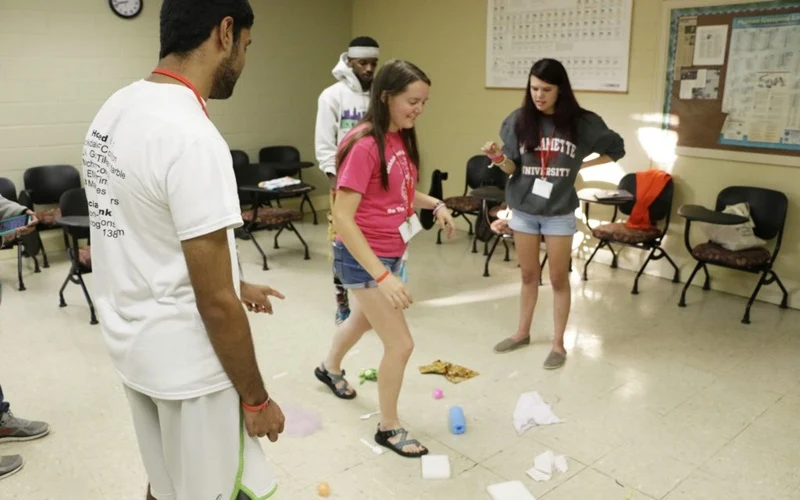
Mine field is another crucial brain game that helps in team-building. It entails arranging an obstacle course, blindfolding someone, and requiring them to move through the obstacles. Other members can guide their teammates using some clues as they navigate the minefield. You must work together with others to solve problems. It requires coming up with a solution that ensures navigating through the obstacles without knocking them down.
The more adaptable team is likely to be productive in this game. You are testing the ability to overcome change with more ease using critical reasoning skills. This is because a team needs valuable qualities to succeed in the minefield.
The Bottom Line
Critical thinking can improve your creativity in the long run. Whether brainstorming ideas or creatively solving a problem, these brain games will lead you to better solutions. They are designed to build critical reasoning skills while facilitating team building. Therefore, you get more than critical thinking skills to learn problem-solving, collaboration, and communication. There is always room for improvement when developing these skills if you take part in many exercises.
نموذج الاتصال
Mind by Design

21 Amazing thinking games for adults | Classic brain games
Thinking games for adults is the best way to train your brain. It not only improves your intellectual capacity but also sharpens up your skills and makes you more productive.
Thinking games for adults will help you to:
- It helps you in increasing your creativity and imagination.
- It increases your concentration skills.
- It improves your memory and information retention ability.
- It builds and repairs brain cells.

It helps you in making a decision quickly. It also sharpens up your thinking process by playing with logic and challenging yourself with puzzles, games, riddles, knowledge-based games etc.
In this post we will present 21 of the best thinking games for adults , so you can see and choose which one is best for you!
1. Mind Benders
Mind Benders by Martin Gardner is a game of logic and puzzles. This game is a collection of puzzle problems that include Zen koan questions, puzzles in geometry, and magic squares.
To play this game you need to solve the problems in order starting from easy to hard. Once you are done with answering the easy ones, you can move on to the next harder ones until you have finished all of them.
Sudoku, which means “single number”, is a popular logic game. It is a Japanese puzzle of numbers in which players must fill in the blanks so that each row, column, and region contain the digits 1 to 9 and no more than four of them are used together in each row, column, or region.
3. Flip Question
This game requires you to answer the questions in a logical way, without relying on any wrong information. It is kind of a simple puzzle involving finding the right order for the numbers that are shown from 1 to 80.
4. Logic Trails
Logic Trails is a game that requires you to follow a trail of logical deductions. The basic rules are:
- Be sure to not make any assumptions.
- Always start with an assumption.
- Weave logic from the given premises to the conclusion. What do you need more than anything else is to be sure that your answer is correct and values your ideas?
5. Hinge Puzzle
Hinge Puzzle is a classic game with a lot of challenging questions. It requires you to find the ways by which the three given figures can be connected into one figure, without lifting the puzzle apart and possibly disabling it from being completed.
6. Tower of Hanoi
Tower of Hanoi is a strategy game for 2 players who are trying to get their wooden disks on top of the tower filled with discs. One person moves the disks at a time, while the other player is trying to stop them.
7. 20 November 2012 Brain Teaser
From 20 November 2012, this puzzle will keep your brain working as it asks you to solve a riddle every time you look at it. Your mission is to find out what happened on this day by solving all kinds of riddles and puzzles.
Bamboo is a classic board game that requires you to move the tokens from start to finish in order. There will be various obstacles in the way that you must avoid in order to get your token moved. You can also use logic and help other players by giving them boosts on their way.
9. Labyrinth
This is a great strategy game that requires you to move your token by using the correct path among the colored labyrinths. You will have to start from easy ones and then move your way towards harder ones.
10. Monopoly Empire
Monopoly Empire is a fun logical game that requires you to build your empire in a realistic manner just as the original game does. The only thing is that this version requires you to build your empire from scratch.
11. Moondial
Moondial is a classic logic game that requires you to follow the instructions given to get the token through a maze of obstacles. You would have to start at easy ones and then move on to harder ones until you have completed all of them.
12. Transport
Transport is a logic game that allows you to race a vehicle in a puzzle-like scenario just like the original board game. The only difference between this version and the original one is that the puzzle will be solved with a vehicle rather than with trains.
13. Hangman’s Puzzle
This is an easy puzzle game that requires you to find out the letter that can form words from the given stack of letters, without using any letters twice in the same word. It is also great for improving your memory and attention skills.
14. The Alphabet Game
The Alphabet Game is a fun game that requires you to guess the letters by making use of your logic and knowledge. This game starts from the alphabet A and it will keep on going until you cannot guess it in any other way from any other letter. The aim is to try to guess them all!
15. Sudoku meets Asteroid
Excluding the differences in the rules, it is still a Sudoku game, you must fill up all the cells on a grid so that each row, column and region has only 1 to 9 numbers. The only difference here is that instead of using numbers 1 to 9, you will be using letters of the alphabet.
16. Letter Sequence
Letter Sequence is a fun puzzle game that requires you to identify the sequence in which the letters are given. The only difference is that they are not numbers but letters of the alphabet. This game will test your memory and attention skills as it requires you to remember them all.
17. Magic Square Puzzle
The magic square puzzle is a great thinking game that consists of square blocks filled with various letters. It will test your logical thinking skills as you have to find the square blocks that consist of some letters and use a combination of them to form a whole number.
18. Jigsaw Puzzle Fun
Like the original jigsaw puzzles, this version features over 15 different puzzles that feature animals like lions, kangaroos, sharks, dolphins, elephants and more. It requires you to put the puzzle pieces together in order so that there are no overlapping or missing pieces.
19. Alignment Game
Alignment Game is a great puzzle game that requires you to connect the dots on a grid to form various patterns. This game will test your memory and attention skills by asking you to solve the pattern without looking at the given grid.
20. Rubik’s Snake
Rubik’s Snake is another great logic game that will require you to find out a snake by rotating the blocks around it until it has become a snake again. The only thing is that this version is played with a snake instead of blocks and will test your logical thinking skills instead.
21. Wheel of Fortune
Wheel of Fortune is a logic game that requires you to match the letters on the wheel so that each letter on the wheel lands on an appropriate letter in the grid. It will test your memory and attention skills as it requires you to remember them all!
Conclusion – thinking games for adults
Playing thinking and puzzle games is not just a fun activity that the kids do. It is also a great way for adults to improve their memory, brainpower and logic skills . The best thing about these games is that they are fun to play and they require a lot of thinking as well.
These games will help you increase your IQ level by giving you the ability to make logical decisions in various situations without having to worry about the outcome. They also improve your problem-solving skills by testing and training them every time you play one of these games.
Playing these games can also help you to develop your logical reasoning and become better at making decisions in a more efficient manner. The best part about playing these games is that they are very fun!
Now that you have found out the best thinking and puzzle games for adults, it is time to try one of them and see for yourself how much your IQ has improved or how much better you have become at playing them.
Similar Posts

The individualism approach to ethical decision making explained
Ethical decision making is a popular field of study. Whether the goal is to strengthen one’s personal moral compass or to behave in a more ethical manner at work, philosophers have developed many different ideas about how the process should proceed. One popular school of thought is termed “individualism.” This approach argues that you should…

Who said: Confidence is the liquor of the fool (and what does it mean)
There are many people in the world who create quotes. One of them is Confucius who said: confidence is the liquor of the fool. Confucius was a Chinese philosopher and teacher. He was born in 551 BCE and died at the age of eighty-two (around 479 BCE). Confucius’ thoughts have been recorded in a book…

Why is it important that goals be measurable?
Goals are so important in the road to success, but goals that are not measurable are not going to get you anywhere. In this article, we will explore the importance of goal setting and how essential it is to make your goals measurable. You know that feeling you get when you set a goal and…

7 Amazing benefits of fasting and meditation
Fasting and meditation are two of the most popular methods for obtaining mental clarity and relief. When fasting, you reduce the amount of food you consume on a regular basis. It is often done for spiritual or religious purposes, but can also be used to lose weight. The most common form of fast includes abstaining…
![critical thinking games play How to Change Your Mindset [8 Simple Steps to Successful Change]](https://www.mindbydesign.io/wp-content/uploads/2022/10/How-to-Change-Your-Mindset-768x512.jpeg)
How to Change Your Mindset [8 Simple Steps to Successful Change]
Changing your mindset can sound difficult, but it’s not. The way you feel about something is all in your head and the key to changing your mindset is to rewire your brain. It’s not as difficult as it sounds; you just need to know what steps to take and when. Follow this blog post for…

Law of Abundance: Master Manifestation
Are you tired of living a life of scarcity and lack? Do you feel like no matter how hard you work, you just can’t seem to attract abundance into your life? Well, it’s time to shift your mindset and tap into the unlimited source of abundance that is available to all of us through the…
Leave a Reply Cancel reply
Your email address will not be published. Required fields are marked *
Save my name, email, and website in this browser for the next time I comment.
Terms and Conditions - Privacy Policy
Critical Thinking Games
Prosocial video games supporting critical thinking . Presented by the Gaming Against Violence program from Jennifer Ann's Group ®, a nonprofit charity.
★ Congratulations to MushWhom? and Figure It Sprout for winning 2023 Silv-E Awards! Corporation, Inc. (KSU Narrative Game Lab) Figure It Sprout (David Li, Quang Nguyen, Gaby Sanchez, Kitty Huang, Isaac Orozco) Mushwhom? (Collin Lang, Knitwit Studios) Critical Thinking Games Press Release for more details. -->
- About Critical Thinking
- Critical Thinking Game Design Contest
What is critical thinking?
Here are some definitions about critical thinking to give you an idea of what is meant by "critical thinking." Although there is a general consensus regarding its meaning, these definitions offer a variety of perspectives to better understand critical thinking.
"Critical thinking refers to the ability to analyze information objectively and make a reasoned judgment. It involves the evaluation of sources, such as data, facts, observable phenomena, and research findings."
~ ThoughtCo
"Critical thinking is a kind of thinking in which you question, analyse, interpret, evaluate and make a judgement about what you read, hear, say, or write."
~ Monash University
"[...] careful thinking directed to a goal."
~ The Stanford Encyclopedia of Philosophy
"The process of thinking carefully about a subject or idea, without allowing feelings or opinions to affect you."
~ Cambridge Dictionary
"Critical thinking is the intellectually disciplined process of actively and skillfully conceptualizing, applying, analyzing, synthesizing, and/or evaluating information gathered from, or generated by, observation, experience, reflection, reasoning, or communication, as a guide to belief and action."
~ University of Louisville
"Thinking critically is a skill that is taught at school and university BUT its main purpose is to better equip you to understand the world, to make more sense of the vast amount of information that is available to us and to avoid, being manipulated. It is a life skill."
~ University of Greenwich
- Critical Thinking Resources
Critical Thinking Articles & Resources
These resources and articles about critical thinking are helpful in designing critical thinking games .
- ► A Guide to Costa's Levels of Questioning [The Edvocate] "Like Bloom’s taxonomy, the questions in Costa’s lower levels encourage students to use their more fundamental cognitive processes. [...] A sizable body of research backs up Dr. Costa’s schema. Following a constructivist theory of education, Newmann (1993) discovered that higher-order thinking forces students to 'manipulate information and ideas in ways that modify their meaning' and 'expects students to solve issues and build meaning for themselves.'"
- ► 5 Tips for Critical Thinking [Psychology Today] "[Critical Thinking] is necessary when you care about your decisions or when the consequence of a decision is impactful. According to Jean Paul Sartre, every time an individual acts, they are making a choice to commit that act as opposed to not acting, or acting in an alternative manner. With that in mind, if we were to think critically about every single decision we make, we would be mentally exhausted before we even got to work."
- ► 60 Critical Thinking Strategies for Learning [teach thought] "A critical thinking strategy is simply a ‘way’ to encourage or facilitate the cognitive act of thinking critically. "Critical thinking is the ongoing application of unbiased, accurate, and ‘good-faith’ analysis, interpretation, contextualizing, and synthesizing multiple data sources and cognitive perspectives in pursuit of understanding. "What are the 7 critical thinking strategies? Someone emailed me recently asking that question and I immediately wondered how many more than seven there were. 27? 77?"
- ► Critical Thinking [Stanford Encyclopedia of Philosophy] "Critical thinking is a widely accepted educational goal. Its definition is contested, but the competing definitions can be understood as differing conceptions of the same basic concept: careful thinking directed to a goal."
- ► Critical Thinking and Problem-Solving [The University of Tennessee, Chattanooga] "In essence, critical thinking is a disciplined manner of thought that a person uses to assess the validity of something (statements, news stories, arguments, research, etc.)."
- ► Critical Thinking Definition, Skills, and Examples [ThoughtCo.] "Good critical thinkers can draw reasonable conclusions from a set of information, and discriminate between useful and less useful details to solve problems or make decisions."
- ► Critical Thinking: Why Is It So Hard to Teach? [AdLit: All About Adolescent Literacy] "Learning critical thinking skills can only take a student so far. Critical thinking depends on knowing relevant content very well and thinking about it, repeatedly. Here are five strategies, consistent with the research, to help bring critical thinking into the everyday classroom."
- ► CRITHINKEDU Impact Report - A journey on critical thinking in European higher education [CRITHINKEDU] "Funded by the European Commission under the Erasmus+ Programme, the ‘Critical Thinking Across the European Higher Education Curricula – CRITHINKEDU’ project arises from the background and experience of European Higher Education Institutions, business corporations and Non-Governmental Organisations, and their ongoing concern to improve the quality of learning in universities and across different sectors, which converge in a common need on how to better support the development of Critical Thinking (CT) according to labour market needs and social challenges."
- ► Defining Critical Thinking [The Foundation for Critical Thinking] "Critical thinking is a rich concept that has been developing throughout the past 2,500 years. The term 'critical thinking' has its roots in the mid-late 20th century. [In this article, we] offer overlapping definitions which together form a substantive and trans-disciplinary conception of critical thinking."
- ► How To Teach Critical Thinking in K-12 [Forbes] "What’s needed is not necessarily new courses, but a critical thinking focus throughout the curriculum. Some of these changes can happen quickly with tweaks to existing curricula and the incorporation of deeper and more creative thinking exercises."
- ► Logical Fallacies: Examples and Pitfalls in Research and Media [Research.com] "In public discourse, research and academic writing, logical fallacies should always be avoided because they invalidate conclusions and arguments. Unfortunately, it is easy to commit such logical fallacies ourselves. "A recent analysis of medical fallacies can be found in a paper titled, 'Fallacies in medical practice: Renin-angiotensin-aldosterone system inhibition and COVID-19 as a Paradigm' in the Hellenic Journal of Cardiology. "It states that 'In emergency situations, such as during the coronavirus disease 2019 (COVID-19) pandemic, medical community looks for quick answers and guidance. Under these circumstances, experts instead of admitting ignorance, feel obliged to give an answer, often pressurized by political or other authorities, even when such an answer is unavailable. Under these circumstances, publications based on fallacious reasoning are virtually unavoidable. (Triposkiadi, Dean Boudoulas, Xanthopoulos, and Harisios, 2020).'”
- ► The Critical Thinking Consortium [TC2] A collection of resources for educators and parents supporting "critical, creative, and collaborative thinking as an educational goal and as a method of teaching and learning." Many of these resources require payment but the website also includes several excellent free online collections and published lessons.
- ► What is critical thinking? [Monash University] "People who apply critical thinking consistently are said to have a critical thinking mindset, but no one is born this way. These are attributes which are learnt and improved through practice and application. "In the academic context, critical thinking is most commonly associated with arguments. You might be asked to think critically about other people's arguments or create your own. To become a better critical thinker, you therefore need to learn how to: clarify your thinking purpose and context; question your sources of information; identify arguments; analyse sources and arguments; evaluate the arguments of others; and create or synthesise your own arguments."
Critical Thinking Game Design Challenge
Note: the critical thinking game design challenge has ended. Here is the press release announcing the award-winning critical thinking games . The following information is for reference and will be archived soon.
Background: About the Critical Thinking Games Contest
Since 2008, Gaming Against Violence , an award-winning program from the nonprofit charity Jennifer Ann's Group , has produced prosocial games in an effort to improve the lives of young people around the world. Every year a new game design challenge is issued for game designers and developers to create compelling games about that year's topic. Previous game challenges have focused on a variety of topics and themes including consent , culture , gaslighting , healthy relationships , and resilience . This year the game design challenge theme is critical thinking .
Critical Thinking Game Overview
The Critical Thinking Game Design Challenge consisted of two rounds. For Round One , contestants submitted a game pitch using the theme of critical thinking. For Round Two , Finalists were selected based on their submitted game pitch. These Finalists will then design and develop their critical thinking video games based on their game pitches. They will have three months to develop their games.
Each Finalist who submitted an eligible game was guaranteed a prize of at least $100 (USD). The Winning Game was guaranteed a prize of at least $3,000 (USD). The total prize pool awarded to the group of Finalists was $10,000 (USD). All Finalists also receive critiques of their submitted games from experts in game design and/or critical thinking.
The critical thinking game design contest was open to everybody age 13 and older (minors will need a parent or guardian to sign the prize acceptance agreement in the event they are selected as a Finalist). The critical thinking games should be designed to be generally appropriate for ages 11 and up. Your entry should be a video game that has never been published before. And, as has been the case since 2008: the games cannot contain any depictions of violence .
Critical Thinking Game Timeline
Round One consisted of submitting a proposed game pitch. This entails answering six questions and providing other registration data.
Round Two was limited to Finalists who will be selected from the Round One proposed game pitch submissions. You do not need to be a game developer or game designer in order to become a Finalist - you just need to have a clever idea that you believe would translate well into a compelling video game that supports critical thinking!
- Round One: Game pitches were submitted by March 19, 2023.
- Finalists were selected and notified by March 30, 2023.
- Round Two: Finalists had until June 30, 2023 to submit their completed critical thinking game.
- Judging and critiquing of the critical thinking games during July 2023.
- The winning critical thinking games will be announced after Labor Day Weekend 2023.
Critical Thinking Game Prizes
A total of $10,000 (USD) awarded in prize money to the Finalists. Distribution of prize money will be announced when the Winning games are announced. At least one Winning game will receive at least $3,000 (USD). Each Finalist will receive at least $100 (USD). Additional Winning Games might be selected from among the Finalists.
In addition to the prize money:
- All qualifying Finalists will have their games judged and critiqued by industry and subject matter experts.
- All qualifying Finalists will be granted a license to use the FINALIST graphic.
- The Winning game(s) will be granted a license to use the WINNER graphic.
- The Finalist and Winning game(s) will be promoted on Jennifer Ann's Group websites and on their profile pages at game marketplaces.
- The Winning game(s) will be published by Life Love Publishing once they are ready to be published.
- All Finalists will receive critiques about their game entry from the critical thinking game contest judges.
- More details available in the Critical Thinking Game Design Challenge Rules below.
► Jennifer Ann's Group is a 501(c)3 nonprofit organization and relies on donations, sponsorships, and grants to fund our violence prevention work. Like what we're doing? Donate online to support our innovative violence prevention work .
Judges: critical thinking games design challenge, susan bonner.
Susan Bonner (she/her) is an Associate Professor in the Department of Media and Information at Michigan State University teaching in the Serious Games Certificate and the Games and Interactive Media program. Educational games she produced through The EPIC Project have won Serious Play and Meaningful Play Awards. She is the creator of The Road Crew Social Emotional Health Game , which aims to teach young children coping skills for anger, loneliness, and anxiety through an AR experience. Accessible, universal, and inclusive design is at the heart of her teaching, art, design, and the work she produces. Susan actively participates on panels for the National Science Foundation, specifically focusing on Small Business Innovative Research in VR, AR, AI, and Learning Cognition. Susan holds an MFA from the University of Cincinnati and a BFA from Columbus College of Art and Design. Find out more at SusanBonner.com
Dr. Nick Bowman
Nick Bowman is an Associate Professor of Emerging Media in the S.I. Newhouse School of Public Communications at Syracuse University. He is a media and communication scholar with an extensive research career focused on the uses and effects of video games. He has published more than 140 peer-reviewed academic manuscripts , with recent studies focused on the functional role of video games in daily life, from video game nostalgia to use of gaming for mood management. He works with other scholars and game developers to advance the study and design of video games for prosocial purposes, including violence reduction and perspective-taking. He is the editor of the Journal of Media Psychology , and was recently the Fulbright Taiwan Wu Jing-Jyi Arts & Culture Fellow at the National Chengchi University in Taipei. He has taught courses on video games and media psychology in Belgium, Germany, Mexico, and Taiwan.
Dr. Mark Danger Chen
Mark Danger Chen is an independent games scholar and part-time professor of interaction design, qualitative research, and games studies at the University of Washington Bothell. They oversee Esoteric Gaming , an alternative publication outlet that celebrates gaming diversity through detailed accounts of arcane and marginal gaming practices. Mark also wrote Leet Noobs: The Life and Death of an Expert Player Group in World of Warcraft , an ethnographic account of how a new team learned to excel through the use of game mods and then died in a fiery meltdown catalyzed by the same mods. In a previous life, Mark was a webmaster and game designer for the Oregon Museum of Science and Industry. Mark wants a die-cast 1st generation Soundwave for Christmas. You can reach Mark at @mcdanger .
Drew Crecente, JD
Drew Crecente (he/him) is founder and executive director of Jennifer Ann's Group , a nonprofit charity preventing teen dating violence. He also runs the Gaming Against Violence program for Jennifer Ann's Group. Drew is a teen dating violence lead at Emory's Injury Prevention Research Center (IPRCE) and a published researcher on violence prevention through video games . Drew speaks at conferences about the use of video games as a solution for violence prevention. His speaking engagements include GDC, Games for Change, Games for Health, Meaningful Play, PAX Unplugged, and Youth at Risk conferences. Drew's game production credits include ADRIFT , a consent game featured at the future-focused museum MOD in Australia; Rispek Danis , a game about healthy dating relationships designed for ni-Vanuatu youth and 2019 Games for Change Awards Finalist in the category of Most Significant Impact ; and the media literacy game Culture Overlord , a 2021 Finalist for the GEE! Learning Games Award and 2022 Games for Change Awards Finalist in the category of Best Learning Game .
Sabrina Culyba
Sabrina Culyba (she/her) is a Pittsburgh-based game designer and founder of Ludoliminal . Her professional work has spanned online games, VR, mobile apps, location-based entertainment, and board games across a variety of industries from healthcare to education. She is the author of The Transformational Framework (ETC Press, 2018) and has spoken on game design and the transformational power of games at a number of conferences including the Games for Change festival, Serious Play, Meaningful Play, and Dataviz+Cancer. Sabrina serves on the Board for Global Game Jam and Broke the Game . She also co-hosts the yearly XR Brain Jam at the Games for Change Festival.
Dr. Ruud Jacobs
Ruud Jacobs is an assistant professor at the Department of Communication Science of the University of Twente . His research is mediapsychological, mostly focusing on the impacts of persuasive games and the ways in which they work to change attitudes. In 2017 he defended his dissertation, titled Playing to Win Over , as part of the Persuasive Gaming in Context joint research effort. Ruud lectures in technological aspects of communication science, and talks about games whenever he can.
Dr. Krista-Lee Meghan Malone
Dr. Krista-Lee M. Malone is a faculty associate with the Department of Curriculum & Instruction’s Game Design Certificate at UW-Madison and Director of the UW Game Lab. Her past research includes studies on raiding guilds in World of Warcraft, the making of educational games in Taiwan (where she concurrently worked as a designer and consultant) and using game design to teach in the social sciences. Dr. Malone is currently working on designing engaging educational games as well as examining gender issues and educational uses of Twitch.tv and Discord. She is also a board member of MKEsports , an alliance aimed at positively growing the culture and connectivity of regional esports groups, gamers, businesses, and community partners. If you want to geek out with her, she can can be found experimenting with teaching at twitch.tv/profgameranthro and experimenting with everything else at twitch.tv/gameranthro .
Dr. Amy Mueller
Amy Mueller is an assistant professor of learning technologies at the University of Oklahoma in the Instructional Leadership and Academic Curriculum program . She teaches undergraduate and graduate courses on educational and instructional technologies to pre-service and practicing educators. Prior to her arrival at the University of Oklahoma she taught 4K for Head Start and worked as a K-5 Technology Teacher at a dual language immersion program in a diverse, public, urban title-1 school. Her research interests include: culturally and linguistic responsive and sustaining education, Indigenous education, liberatory education, elementary education, games-based learning, maker education, STEM education, digital literacy, multiliteracies, design based research, and codesign & community action research. In her limited free time, she likes to play video games with her kids.
Dr. Brooke Morrill
Dr. Brooke Morrill serves as the Senior Director of Education at Schell Games . Morrill uses her expertise in behavioral science, psychology, and research to increase the impact of and engagement in the company’s educational and transformational games. She identifies and secures extramural project funding in both the federal and private sectors in order to create and iteratively develop innovative, interactive experiences. In addition, she collaborates with universities and research institutions for product development and evaluation. She also maintains an active Board Certified Behavior Analyst-Doctoral credential from the Behavior Analyst Certification Board. Morrill serves on the XR Education and Training Advisory Group for the Academy of International Extended Reality (AIXR), a membership network of industry leaders that helps to enable growth, nurture talent, and develop standards while working to bring wider public awareness and understanding to virtual and augmented reality. She is also a Principal Member of grant review panels for the Institute of Education Sciences at the US Department of Education.
Dr. Andy Phelps
Bio coming soon.
Dr. Elizabeth L. Richeson
Dr. Elizabeth L. Richeson is a Psychologist in El Paso, Texas , the head of the Advisory Board for Jennifer Ann's Group , and former president of the Texas Psychological Foundation. She was recognized as the 2018 Psychologist of the Year by the Texas Psychological Association; is an expert on teen dating violence; appears regularly on news and talk shows; and lectures nationwide on a variety of issues related to teenagers, young adults, and healthy relationships. She lived and worked in a variety of settings in Japan, Micronesia, South Korea, and Thailand and wrote her doctoral dissertation on Adaptation to Geographic Relocation at Howard University in Washington, D.C. Her clinical and administrative positions have included Program Director of Adult Psychiatric Units, Adjunct Professor at Texas Tech Health Sciences Center and University of Maryland International, and maintaining a full-time clinical practice for more than 30 years. She is considered the area authority on eating disorders for the Air Force and Army for outpatient and inpatient treatment.
Jo Sharpen is a specialist in violence against women and girls, child development and the impacts of trauma. She has a special interest in how the online space can be used to support and empower survivors of abuse. Jo is now a freelance consultant after previously being the director of policy at AVA, a national UK charity.
Dr. Sarah Stang
Dr. Sarah Stang (she/her) is an Assistant Professor of Game Studies in Brock University’s Centre for Digital Humanities . She is also the Secretary for the International Communication Association’s Game Studies Division and an At-Large Representative for the Canadian Game Studies Association . She received her PhD from the Communication & Culture program at York University and her research primarily focuses on gender representation in both digital and analog games. Her published work has analysed topics such as female monstrosity, androgyny, parenthood, interactivity, and feminist media studies, and can be found in journals such as Games and Culture , Game Studies , Critical Studies in Media Communication , Human Technology , and Loading , as well as several edited collections.
Dr. Moses Wolfenstein
Moses Wolfenstein is a professor at El Camino College in Torrance, CA where he serves as Distance Education Faculty Coordinator and is leading the development of the new Games and Playable Media Department. Moses has been working in and around game design since 2006 as a designer, research, and teacher. His doctoral research with the Games+Learning+Society research group at UW–Madison focused on the intersection of games, learning, and leadership in MMO's.
Critical Thinking Game Pitch Submission
( Note: game pitches were due by March 19, 2023 )
You are pitching an idea for a non-violent prosocial video game intended to encourage and support critical thinking and the use of critical thinking tools and strategies by the players of your game.
If you can envision a video game that will help the player use and apply critical thinking then we want to learn about your game idea. We hope you will submit your idea to the critical thinking game challenge.
An important note about the critical thinking game design challenge:
Although our organization's primary focus is on the prevention of teen dating violence, your game does not have to be about dating relationships. There are several reasons for this, but the most important reason is that we want to help all young people (ages 11-22) learn this important information in order that they are more likely to understand the value of critical thinking and are better equipped to apply critical thinking skills. The past few years have been especially challenging. This is true for nearly everybody and in many aspects. We believe some, if not all, of those challenges would have been easier to navigate were we all better equipped to use and apply critical thinking. We believe that intentionally designed video games are an ideal approach to helping young people appreciate and understand how to use critical thinking skills. Our hope is that these critical thinking games will be used by: educators in classrooms; by parents and trusted adults at home; and directly by young people themselves. If we were to limit the critical thinking game design challenge to narrowly focus on the topic of healthy dating relationships then that might limit the reach and use of these critical thinking games. With that said, you are welcome to incorporate themes about healthy relationships into your critical thinking video game should you choose to do so.
Round One: game pitches were due by March 19th, 2023
These questions were answered by those submitting a game pitch.
Critical Thinking Game Pitch Questions
- (Q1) What is the title of your critical thinking game?
- (Q2) Write a short description of your critical thinking game. After reading this description players should want to play your game. (100-150 words)
- (Q3) How will your critical thinking game use visual and auditory elements to engage and inform players about critical thinking and how best to use it? (100-150 words)
- (Q4) How will your critical thinking game effectively use game mechanics , storytelling , and/or rhetoric to engage and inform players about critical thinking and its importance? (Please realize that this means that your game does not have to be story-based; it may use other design strategies or it may be story-based, as you prefer.) (100-150 words)
- (Q5) How will your critical thinking game effectively use persuasion to engage and inform players about critical thinking and its importance? (100-150 words)
- (Q6) How will your game help players identify critical thinking skills and learn how to strengthen those skills in order to help them become better able to use critical thinking in their lives? (100-150 words)
Round Two: were due by end of June 2023
Finalists were notified by March 30, 2023 if their proposed game pitch was selected to move on to Round Two of the contest. For Round Two, Finalists were given until June 30, 2023 to design, develop, and complete their critical thinking game. The finished critical thinking games will then be reviewed and scored to determine the winner.
- No VR or AR games . We want to reach as many people as possible with these critical thinking games and we feel that VR and AR technologies are currently too limiting.
- No subscription-based services . We cannot afford to pay for recurring subscriptions.
- Ideally you will use Unity to develop your game . Due to its large user base it is easier for us to get support if needed and the majority of the games we have published in the past were developed using Unity. Also, it is generally easier for us to export Unity games to a variety of platforms. Importantly, Unity supports exporting to HTML5 . Browser-based games are often more accessible because they can be played, for example, in public libraries and at schools. We strive to publish games that are accessible.
- Some suggested game design engines: Godot , Unity , and Unreal Engine . If you are wondering about a particular engine or technology please contact us.
Critical Thinking Games: FAQs
About this contest.
What is the Life.Love. Game Design Challenge?
The Life.Love. Game Design Challenge is an annual game design contest focused on violence prevention. The contest is open to game designers and game developers around the world. Entries have been received from six continents. Designers and developers are invited to create their own prosocial games intended to engage, educate, and empower game players. This contest is from the award-winning Gaming Against Violence program presented by the nonprofit charity Jennifer Ann's Group. The games are published, localized, and maintained by Life Love Publishing.
Why is Jennifer Ann's Group running this contest?
Violence is a public health issue and games are an effective approach at engaging young people about serious and complex issues. Jennifer Ann's Group is a non-profit organization working to prevent violence since 2006 in memory of Jennifer Ann Crecente.
Although traditional outreach programs about violence prevention are available, many schools lack the funding to implement these programs and so Jennifer Ann's Group considered how to leverage technology to reach and help young people at no cost. Given the popularity of video games -- especially among young people -- Jennifer Ann's Group launched the first annual Life.Love. Game Design Challenge in 2008, challenging video game designers to create prosocial games intended to prevent dating violence. In 2023, for the 16th annual Life.Love. Game Design Challenge, the focus is on supporting the use of critical thinking skills by young people to help them be better informed and self-sufficient. These skills will lead to better outcomes for themselves and for those around them. This will help them to lead happier, healthier lives.
In the years since launching the contest it has become increasingly clear that games are fantastic tools for engaging players in uniquely compelling ways. As compared to traditional methods: players more easily understand complex, nuanced issues; they become invested and engaged in the success of the game's outcome; and they can safely explore and experience difficult situations in context.
Every year since 2008 Jennifer Ann's Group has presented an annual game design competition encouraging developers to create games about selected themes intended to help young people in the short term and benefit society in the long term. Prosocial games help engage, educate, and empower young people around the world.
What else can you tell me about the games that have come from this program?
| More than seventy | |
| bystander awareness, consent, culture, gaslighting, healthy relationships, media literacy, power & control dynamics, resilience, and teen dating violence warning signs | |
| Argentina, Australia, Belgium, Canada, Colombia, England, France, India, Ireland, Mexico, Portugal, Russia, Spain, Sweden, Thailand, Ukraine, United States, and Vanuatu | |
| Amazon App Store; Amazon Echo; Apple App Store; Blackberry World; GameJolt; Google Play; HTML5; itch.io; Steam; Windows Phone | |
| (consent) | Quinn Crossley and Andrew Connell | USA (culture, healthy relationships, media literacy) | Lucas Vially | France (teen dating violence, bystander awareness) | GP Touch | Thailand (healthy relationships) | Sandra Lara Castillo | England (gaslighting, bystander awareness) | Luciano Sgarbi | England (resilience) | Eloise Best | England (consent, healthy relationships) | Jared Sain | USA (culture, healthy relationships) | Crescent Tea Studios | Portugal (consent) | Another Kind | Belgium (resilience) | Robin Ghosh | Canada | |
| , Community Pillar Grant, Penny Arcade (2010) , Trailblazer, Break the Cycle (2014) , Media Mover Award finalist, TAG Digital Media & Entertainment Industry (2016) , Games for Change Awards finalist, "Most Significant Impact" (2019) , Jungle Jam, Dreamhack Anaheim (2020) , Torchbearer, DeKalb County, GA (2020) , GEE Educational Games Award finalist (2021) , GEE Educational Games Award finalist (2021) , Top 50 Nonprofit Program, Classy Awards finalist (2022) , Games for Change Awards finalist, "Best Learning Game" (2022) , Everytown Survivor Network Grant (2022) | |
| : "Video Games Against Violence...", : "Video games created to change...", : "Consent and Sex on Screen in Post #MeToo Era", : "Games to Educate Teens About Dating Violence" : "El Paso ISD Collaborates...", : "Call of Moral Duty - Making Games for Change", : "Best of Indie Games", : "Games Doing Good...", : "Video games really can prevent violence" | |
| Wow, thank you! All support is greatly appreciated. As a registered charity, donations are exempt to the full extent allowed by law. Sponsorship opportunities as a prize sponsor or media sponsor are available. Please contact at: contact (at) JenniferAnn (dot) org. |
Entry Information
How do I get started?
Game pitches for the Critical Thinking Game Design Challenge were due by March 19, 2023. However, the 2024 game design challenge is coming February 2024 with the topic of connectedness . Visit the website for the connectedness video games for the latest info.
Who is allowed to enter?
Anybody age 13+ at the time of entry is eligible to enter (except in countries or regions where prohibited). Officers, employees, and immediate family members of Jennifer Ann's Group and Life Love Publishing are prohibited from entering the game design challenge.
Can I enter more than once?
Sorry, but no. Make sure and enter your best game because you only get one chance to enter each year!
What are the technical requirements?
Round One of the contest only requires submitting the text of your proposed game narrative. If you are selected as a Finalist you will receive all necessary information for Round Two, including any technical requirements for your final game entry. There are some notes in the Critical Thinking Game Pitch Submission section, including some technical suggestions and limitations. Our intention is to be as flexible and supportive of as many different formats as possible but we do need to be able to reliably judge the games and, in the event that it is a winning game, be able to: modify the game; make the game available through various channels; possibly translate the game into other languages; and also to provide support for game players. If you have any specific questions feel free to ask us.
What are the content requirements?
As with all of our game design challenges no violent content is permitted in the game entries. Games should be age-appropriate for those ages 11 and up.
How long do I have to enter?
Registration was from March 7, 2023 through March 19, 2023. The Finalists were notified by March 30, 2023 and had until June 30, 2023 to submit their finished game.
Do you accept group entries?
Yes - please just identify a primary contact person when you submit your game pitch on the Round One submission form.
Where can I learn more about critical thinking?
Visit the About Critical Thinking section for information and resources about critical thinking.
How can I keep up to date about the contest info?
Register for our newsletter to be notified about our next game design challenge. You can also follow the Critical Thinking Mastodon account at: games.ngo/@CriticalThinkingGames . Finalists will be invited to join our Discord server.
Judging and Selection Process
What criteria will be used for judging?
Round One of the contest will be judged based on the creativity of your proposed game pitch and the potential for that idea to be developed into a compelling video game which will help players: be more aware of the importance of critical thinking; be better informed about critical thinking skills; have strategies to strengthen skills associated with critical thinking; and as a result, be generally better at making informed decisions and become more self sufficient.
Judging details and scoring rubric for Round Two were distributed to all Finalists at the time that they were notified of their Finalist status.
Information about the judges, including their bios, will be added to the contest website June 2023.
Critical Thinking Games: Official Rules
No purchase necessary to enter or win. Void where prohibited. Entry in this contest constitutes your acceptance of these official rules.
The 2023 Life.Love. Game Design Challenge (the " Contest ") is designed to encourage participants (" Entrant(s) " or " You ") to use their creativity to create their own video game that helps players of the game: be more aware of the importance of critical thinking; be better informed about skills supporting the use of critical thinking; have strategies to strengthen skills associated with critical thinking; and feel more empowered through the use of critical thinking, especially for those players in the approximate age range of 11 - 22 years of age (the " Target Age Group "). Life Love Publishing and/or its representatives will select Finalists (" Finalists ") from those eligible entries submitted in Round One. Finalists will be eligible to participate in Round Two and will submit completed games. Judges will choose the winning entries from the Round Two eligible Finalist submissions and prizes will be awarded in accordance with these Official Rules (these " Rules ").
- BINDING AGREEMENT : In order to enter the Contest, you must agree to the Rules. Therefore, please read these Rules prior to entry to ensure you understand and agree. You agree that submission of an entry in the Contest constitutes agreement to these Rules and that you may not submit an entry to the Contest and are not eligible to receive the prizes described in these Rules unless you agree to these Rules. These Rules form a binding legal agreement between you, Jennifer Ann's Group, and Life Love Publishing with respect to the Contest.
- ELIGIBILITY : To be eligible to enter the Contest, an Entrant must: (a) be 13 years of age (or older) at time of entry; and (b) have obtained a parent's or legal guardian's prior permission if under the age of majority (" Minors ") in their jurisdiction. Minors who enter must have the written consent of a parent or legal guardian in order to be eligible to receive any prizes, as described in Section 8 of these Rules. Contest is void where prohibited by law. Employees, interns, contractors, and official office-holders of Jennifer Ann's Group, Life Love Publishing, and any affiliates, and their respective directors, officers, employees, advertising and promotion agencies, representatives, and agents (" Contest Entities ") are ineligible to participate in this Contest.
- SPONSOR : The Contest is sponsored by the Jennifer Ann Crecente Memorial Group, Inc. d/b/a Jennifer Ann's Group(" Jennifer Ann's Group " or " Sponsor "), a Georgia non-profit corporation (501 c(3)) with principal place of business at 2554 Drew Valley Rd NE, Atlanta, GA, 30319, USA. (EIN: 20-4618499) .
- CONTEST PERIOD : The contest period is from March 7, 2023 through August, 2023. Round One of the Contest begins on March 7, 2023 and ends on March 19, 2023 at 11:59pm Eastern Time (ET) Zone (GMT-4) (" Round One Contest Period "). Round Two of the Contest begins on March 30, 2023 and ends on June 30, 2023 at 11:59pm Eastern Time (ET) Zone (GMT-4) (" Round Two Contest Period "). All dates are subject to change. Winning Games will be announced in August or September, 2023.
- HOW TO ENTER : NO PURCHASE NECESSARY TO ENTER OR WIN. To enter the Contest, visit the Contest website located at https://CriticalThinker.games (" Contest Site ") during the Contest Period and follow the instructions that appear in the "Critical Thinking Game Submission" section. You will be requested to complete an official entry form (" Entry Form ") with all requested information, including your responses, or "game pitch", to the questions about your proposed critical thinking game (" Game Narrative "). Entry Forms can only be submitted by Entrants. Those Entrants notified by Jennifer Ann's Group that they have been selected to proceed to Round Two of the Contest (" Finalists ") shall participate in Round Two of the Contest by submitting their completed game entry (" Completed Game "). LIMIT ONE (1) GAME NARRATIVE PER ENTRANT IN ROUND ONE. Subsequent entries will replace, and be treated as, the initial entry. Any submission not meeting the aforementioned criteria will be disqualified. Jennifer Ann's Group and Life Love Publishing accepts no responsibility for submissions lost, delayed, damaged, defaced, or mislaid, howsoever caused. All entries will be deemed made by the Entrant submitted at the time of entry. LIMIT ONE (1) COMPLETED GAME PER FINALIST IN ROUND TWO. Subsequent entries will replace, and be treated as, the initial entry. Any submission not meeting the aforementioned criteria will be disqualified. Jennifer Ann's Group and Life Love Publishing accepts no responsibility for submissions lost, delayed, damaged, defaced, or mislaid, howsoever caused. All entries will be deemed made by the Entrant submitted at the time of entry.
- They must not contain any depictions of violence.
- They must not be derogatory, offensive, threatening, defamatory, disparaging, libellous or contain any content that is tortuous, slanderous, discriminatory in any way, or that promotes hatred or harm against any group or person, or otherwise does not comply with the theme and spirit of the Contest.
- They must be unique creations that have not been previously published and will remain unpublished until after the contest has ended.
- They must not contain content, material or any element that is unlawful, or otherwise in violation of, or contrary to, any applicable federal, state, or local laws and regulations including the laws or regulations in any jurisdiction where the entry is created.
- They must not contain any content, material, or element that displays any third party advertising, slogan, logo, trademark, or otherwise indicates a sponsorship or endorsement by a third party or commercial entity. For Round Two Finalists, text acknowledgements are acceptable in the Completed Game entries; additionally, Jennifer Ann's Group will supply a graphic image identifying Jennifer Ann's Group as the game's sponsor; the image will be placed at an appropriate location as part of the Finalist's Completed Game entry.
- They must only contain text, graphics, audio, designs, and game mechanics that entrants have proper rights to use (e.g. works in the public domain; original creations by the entrant; third-party works with rights granted by rights owner).
- They cannot contain any content, element, or material that violates a third party's publicity, privacy, or intellectual property rights.
- During the Contest Period, the Sponsor, its agents and/or the Judges will be evaluating the Entries to ensure they meet the Entry Requirements. The Sponsor reserves the right, in its sole discretion, to disqualify any Entrant who submits an entry that does not meet the Entry Requirements. Incomplete entries or entries not complying with these Rules are subject to disqualification.
- potential educational value of the proposed game to discuss, demonstrate, or otherwise engage players about critical thinking and its importance, especially for those in the Target Age Group
- potential entertainment or otherwise compelling value of the proposed game
- potential of the proposed game to increase awareness about critical thinking and its importance
- potential of the proposed game to encourage discourse about critical thinking and its importance
- potential of the proposed game to persuade game players about critical thinking and its importance
- potential of the proposed game to help players identify critical thinking skills and learn how to strengthen those skills in order to help the player become more adept at using critical thinking
- game elements of the proposed game
- adherence to the Game Narrative , Entry Requirements , and these Rules .
- educational value of the game to discuss, demonstrate, or otherwise engage players about critical thinking and its importance, especially for those players in the Target Age Group
- entertainment or otherwise compelling value of the game
- potential of the game to increase awareness about critical thinking and its importance
- potential of the game to encourage discourse about critical thinking and its importance
- potential of the game to persuade game players about critical thinking and its importance
- potential of the game to help players identify critical thinking skills and learn how to strengthen those skills in order to help the player become more adept at using critical thinking
- game elements
- adherence to the Game , Entry Requirements , and these Rules .
- Round One Finalists Finalists will be notified on or before March 30, 2023 by email.
- Potential Winners Potential winners will be notified August 2023 by email.
- Decisions of the judges are final and binding. In the event there are not enough eligible entries, not all prizes will be awarded. If a potential winner is unable for whatever reason to accept their prize, then Life Love Publishing reserves the right to award the prize to another entrant.
- Notification of Potential Finalists / Winning Game(s) : Becoming a Finalist / Winning Game is subject to validation and verification of eligibility and compliance with all the terms and conditions set forth in these Rules. If a potential Finalist is disqualified for any reason, a replacement Game Narrative Entry entrant might be chosen as a potential Finalist. If a potential Winning Game is disqualified for any reason, the Completed Game that received the next highest total score will be chosen as the potential Winning Game. The potential Finalist(s) / Winning Game(s) will be selected and notified by email.
- If a potential Finalist does not respond to the notification attempt within three (3) days from the first notification attempt, then such potential Finalist may be disqualified and an alternate potential Finalist might be selected from among all eligible Game Narrative entries received based on the judging Criteria described herein.
- If the Entrant of a potential Winning Game does not respond to the notification attempt within three (3) days from the first notification attempt, then such potential Winning Game may be disqualified and an alternate potential Winning Game will be selected from among all eligible entries received based on the judging Criteria described herein.
- Except where prohibited by law, all Prize Winners will be required to sign and return an Affidavit of Eligibility and Liability and Publicity Release and provide any additional information that may be required by Sponsor. If required, Prize Winners must return all such required documents via fax (or as otherwise instructed) within forty-eight (48) hours following attempted notification or such potential Prize Winners will be deemed to have forfeited the prize and another potential Prize Winner may be selected based on the judging Criteria described herein.
- In the event the potential Prize Winner is a minor, their parent or legal guardian must sign the documents and return them as described herein. All notification requirements, as well as other requirements within these Rules, will be strictly enforced. Determinations of Judges are final and binding. All Prize Winners, including any parent representatives, agree to keep the Completed Game strictly confidential between time of submission and the Completed Game's final launch by Life Love Publishing.
- PRIZES : The entrant of the Winning Game will be eligible to receive a minimum of $3,000 (USD) prize money. An announcement about the Winning Game(s) will be displayed on Jennifer Ann's Group's game portal JAGga.me website and itch.io page for the remainder of 2023. All Non-Winning Finalists will be eligible to receive a minimum of $100 (USD) prize money upon submitting their completed game in accordance with these rules. Some Non-Winning Finalists may also have their games published on the JAGga.me website and/or itch.io page. A total of $10,000 (USD) in prize money will be distributed among all Winners and Finalists, subject to the minimum prize monies described above. Distribution of prize money will be announced when the Winning Games are announced. Additional Winning Games might be selected from among the Finalists. Further details regarding prize distribution will be provided to winners in the prize acceptance documents but will be approximately four (4) to six (6) weeks after Sponsor's receipt of prize acceptance documents from winners. All entrants receiving prize money are considered prize winners (" Prize Winners ") for purposes of these Rules.
- TAXES : Prize Winners are responsible for any federal, state, and local tax consequences and for compliance with all governmental reporting and payment requirements. Winning funds will be sent in U.S. Dollars via cashier's check through Postal Mail or via PayPal (at the option of the winners).
- GENERAL CONDITIONS : At the time of submitting a Completed Game all Round Two Finalists will also electronically provide to Life Love Publishing all source files and components necessary to re-create the Completed Game ("Source Files"). Life Love Publishing and/or Jennifer Ann's Group may use these Source Files to publish the Completed Game to marketplaces; provide language translations; update content; develop derivative works; and / or to localize such game for other countries at Life Love Publishing and/or Jennifer Ann's Group's sole discretion.
- INTELLECTUAL PROPERTY RIGHTS : All Prize Winners give Jennifer Ann's Group and Life Love Publishing the right to the Entrant's name, voice, picture, portrait, and likeness for advertising and promotion purposes without further compensation, where permitted by law. All Prize Winners also give their consent to Jennifer Ann's Group and Life Love Publishing and to those whom they may authorize, to photograph, film, videotape, and/or to use a photographic / digital reproduction of their entry with or without their name, to identify them by name, and/or to quote or record statements made by them, for any editorial, promotional, marketing, or other purpose broadly related to the mission of Jennifer Ann's Group ("violence prevention"). This consent does not extend to the purposes of endorsement of product or service advertising for any unrelated third parties. As a condition of receiving their prize, Prize Winners must grant Jennifer Ann's Group and Life Love Publishing the non-exclusive, royalty-free, licensable, assignable rights to all: completed, object, and source files; necessary media files; and associated intellectual property rights of their entry for purposes of publishing, promotion, marketing, research, creation of derivative works, and internal use.
- WARRANTY AND INDEMNITY : Entrants warrant that their entries are their own original work and, as such, they are the sole and exclusive owner and rights holder of the submitted Game Narrative / Completed Game and that they have the right to submit the Game Narrative / Completed Game to the Contest and to grant all required licenses. Each Entrant agrees not to submit any Game Narrative / Completed Game that: (a) infringes any third party proprietary rights, intellectual property rights, industrial property rights, personal or moral rights or any other rights, including without limitation, copyright, trademark, trade names, industrial designs, patent, trade secret, privacy, publicity or confidentiality obligations; or (b) otherwise violates applicable international, state, federal, or local law. To the maximum extent permitted by law, Entrant indemnifies and agrees to keep indemnified Sponsor and its agents and subsidiaries at all times from and against any liability, claims, demands, losses, damages, costs, and expenses resulting from any act, default, or omission of the Entrant and/or a breach of any warranty set forth herein. To the maximum extent permitted by law, Entrant agrees to defend, indemnify, and hold harmless Sponsor and its agents and subsidiaries from and against any and all claims, actions, suits, or proceedings, as well as any and all losses, liabilities, damages, costs, and expenses (including reasonable attorneys fees) arising out of or accruing from: (i) any Game Narrative / Completed Game or other material uploaded or otherwise provided by Entrant that infringes any copyright, trademark, trade secret, trade dress, patent, or other intellectual property right of any person or defames any person or violates their rights of publicity or privacy; (ii) any misrepresentation made by Entrant in connection with the Contest; (iii) any non-compliance by Entrant with these Rules; (iv) claims brought by persons or entities other than the parties to these Rules arising from or related to Entrant's involvement with the Contest; (v) acceptance, possession, misuse, or use of any prize or participation in any Contest-related activity or participation in the Contest; (vi) any malfunction or other problem with the Contest Site in relation to the entry and participation in the Contest by Entrant; (vii) any error in the collection, processing, or retention of entry or voting information in relation to the entry and participation in the Contest by Entrant and in the voting process; or (viii) any typographical or other error in the printing, offering, or announcement of any prize or winners in relation to the entry and participation in the Contest by Entrant.
- ELIMINATION : Any false information provided within the context of the Contest by Entrant concerning identity, mailing address, email address, ownership of right, or non-compliance with these Rules or the like may result in the immediate elimination of the entrant from the Contest.
- INTERNET AND DISCLAIMER : Jennifer Ann's Group and Life Love Publishing are not responsible for any malfunction of the entire Contest Site or any late, lost, damaged, misdirected, incomplete, illegible, undeliverable, or destroyed entries due to system errors, failed, incomplete or garbled computer or other telecommunication transmission malfunctions, hardware or software failures of any kind, lost or unavailable network connections, typographical, or system/human errors and failures, technical malfunction(s) of any telephone network or lines, cable connections, satellite transmissions, servers or providers, or computer equipment, traffic congestion on the Internet or at the Contest Site, or any combination thereof, including other telecommunication, cable, digital, or satellite malfunctions which may limit Entrant's ability to participate. Jennifer Ann's Group is not responsible for the policies, actions, or inactions of others which might prevent Entrant from entering, participating, and/or claiming a prize in this Contest. Sponsor's failure to enforce any term of these Rules will not constitute a waiver of that or any other provision. Sponsor reserves the right to disqualify Entrants who violate the rules or interfere with this Contest in any manner. If an Entrant is disqualified, Sponsor reserves the right to terminate that Entrant's eligibility to participate in the Contest.
- RIGHT TO CANCEL, MODIFY, OR DISQUALIFY : If for any reason the Contest is not capable of running as planned, including infection by computer virus, bugs, tampering, unauthorized intervention, fraud, technical failures, or any other causes which corrupt or affect the administration, security, fairness, integrity, or proper conduct of the Contest, Jennifer Ann's Group reserves the right at its sole discretion to cancel, terminate, modify, or suspend the Contest. Jennifer Ann's Group further reserves the right to disqualify any Entrant who tampers with the submission process or any other part of the Contest or Contest Site. Any attempt by an Entrant to deliberately damage any web site, including the Contest Site, or undermine the legitimate operation of the Contest is a violation of criminal and civil laws and should such an attempt be made, Jennifer Ann's Group and Life Love Publishing reserve the right to seek damages from any such Entrant to the fullest extent of the applicable law.
Critical Thinking Game Design Challenge: Submit Your Pitch
Register to be notified when we announce our next game design challenge., subscribe to our mailing list.

COMMENTS
Sudoku. Sudoku is a popular math critical thinking game that requires players to fill in blank squares with the correct numbers in order to complete a 9×9 grid. This game encourages critical thinking because it involves finding patterns and using logic to solve the puzzle. Some benefits of playing Sudoku include:
BrainGymmer: Brain training games for all cognitive skills!
Brainzilla - games for your brain
7. Brainstorm. Critical thinking is all about making decisions based on analytical observation and this game allows individuals to brainstorm and find answers to challenging questions. In this game, the players need to answer questions that come on the screen by choosing the correct answer from the given options.
The student must rotate, flip, turn, or overlap the cards in order to get the dots on both cards to match up. This game is great for building and practicing logical thinking, spatial reasoning, and problem-solving. With 60 different puzzles to match up, On the Dot is a game that can stay in your bins for a long time!
Our logic puzzle games are designed to challenge your ability to analyze situations, make decisions, and solve problems effectively. By regularly playing our deductive reasoning games, you'll enhance your capacity for critical thinking, which is invaluable in both personal and professional contexts. Our KenKen puzzles cater to a diverse range ...
Rover Control - This creative, single player coding game teaches basic programming skills through critical thinking puzzles in which a rover must go through various start to finish challenges.. Rush Hour - A classic, single player game, Rush Hour utilizes logical thinking as you work to get an ice cream truck out of a rush hour traffic jam.. Rook - This four player card game is another ...
Critical thinking can be a difficult skill to hone, but with some practice and a fun incentive, you can be thinking deeper in no time. That's where online games for adults come into play, challenging players to rely on their abilities to analyze, reflect, use emotional reasoning, consider multiple interpretations, and more.
Games for Building Critical-Thinking Skills - Common Sense
Group games are ideal for developing critical-thinking skills. The link between critical thinking and one's education is obvious - you can't learn well unless you think well. Critical thinking is the ability to look at problems in new ways, to analyse how parts of a whole interact with one another and to interpret information and draw ...
There are many educational critical thinking games you can play at home that help kids improve their skills! We've gathered a few we love: 1. I Spy. This classic guessing game encourages analytical thinking and problem-solving skills (like deduction) as your child searches for specific objects based on clues. Plus, it's highly portable!
Critical Thinking Games & Activities for Kids - MentalUP
Critical Thinking Games | Play Online at Coolmath Games
Critical thinking skills help us solve problems, make good decisions, and understand the consequences of our actions. In this blog, we discuss five of our favorite games to improve critical thinking skills and sharpen the mind. 1. Chess. Chess is the most widely played board game of all time. Your goal in chess is to get a checkmate by getting ...
3. Zoom. Zoom is a classic classroom cooperative game that never seems to go out of style. Simply form students into a circle and give each a unique picture of an object, animal, or whatever else suits your fancy. You begin a story that incorporates whatever happens to be on your assigned photo.
Pick Your Candy. This online reasoning game improves reaction control, focus, and divided attention skills. PLAY NOW. These free and online thinking games for kids helps improve their logical thinking skills and supports the development of logic, reasoning, planning and arithmetic skills.
Considering how different perspectives and resources play into this quandary is a powerful thought exercise that can help you develop your critical thinking skills. Egg Rescue Another hands-on critical thinking exercise, the egg rescue is a resurrected science class favorite in which your team has to develop a method of protecting an egg that ...
Minefield Team-building games for critical thinking is a time-honored exercise that has been shown to foster better communication and a sense of trust among participants of all ages. It requires the construction of an obstacle course as well as the grouping of the students into different teams. Students take turns navigating the "minefield ...
Critical thinking exercises like the ones we shared here play a crucial role in fostering intellectual growth and preparing learners for the complexities of the modern world. Through group discussions, debates, and problem-solving tasks, learners are encouraged to question assumptions, examine multiple perspectives, and seek evidence-based ...
11 Activities That Promote Critical Thinking In The Class
2. Dare to be different. A Dare To Be Different game. This brain game focuses on using out-of-the-box thinking to come up with solutions to challenges. It encourages the use of critical reasoning to come up with an unconventional solution to a basic concept.
17. Magic Square Puzzle. The magic square puzzle is a great thinking game that consists of square blocks filled with various letters. It will test your logical thinking skills as you have to find the square blocks that consist of some letters and use a combination of them to form a whole number. 18.
Finalists were notified by March 30, 2023 if their proposed game pitch was selected to move on to Round Two of the contest. For Round Two, Finalists were given until June 30, 2023 to design, develop, and complete their critical thinking game. The finished critical thinking games will then be reviewed and scored to determine the winner.